
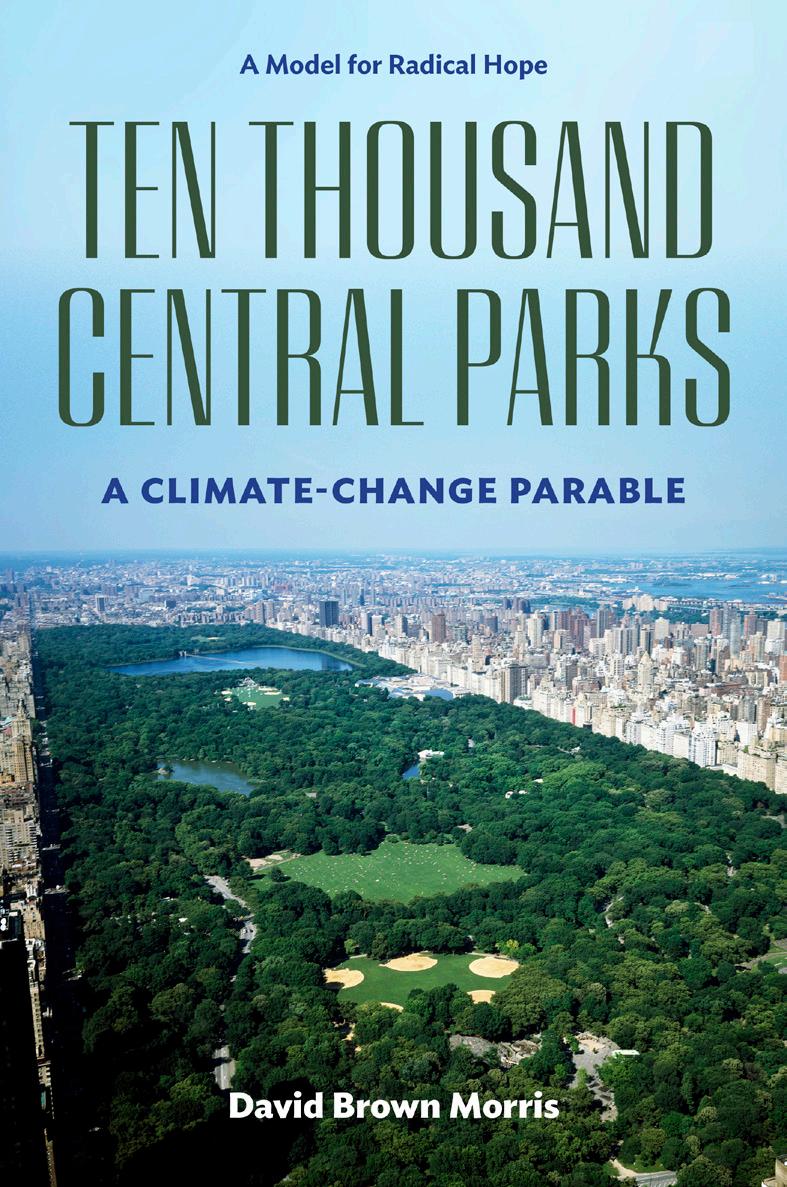



DAVID BROWN MORRIS
224 pages, 38 b/w illustrations 9781531511647, Hardback, $34.95 (HC), £28.99
Simultaneous electronic edition available OCTOBER
New York City & Regional | Urban Studies | Environment

“Ten Thousand Central Parks is a brilliant exploration of the cultural and environmental changes that have shaped our nation’s most celebrated urban park. Offering a fascinating combination of insightful perspectives from horticulture, landscape architecture, literature, and the visual arts, this exemplary work of environmental humanities scholarship demonstrates the power of looking closely at how we shape nature, and how nature in turn shapes us. A gifted storyteller whose thoughtful, curious, well-informed approach is matched by the precision and grace of his prose, David Morris has achieved a tour de force multidisciplinary appreciation of how a deep understanding of our local natural spaces can illuminate planetary concerns.”—Michael P. Branch, author of Raising Wild and On the Trail of the Jackalope
“I am a strong admirer of David Morris’s work, from the beginning on Pope, to his swerve into writings that are like no others, utterly his, original, beautifully written, and profound, narratively driven with moments of such fine attention that they become lyrical. I think his writing on Central Park is perhaps his best and most important book.”—Peter Weltner, Professor Emeritus, San Francisco State, author of The Risk of His Music and Old Songs Replayed
“David Morris has written another vitally important book! Ten Thousand Central Parks like his PEN award-winner The Culture of Pain—cuts to the heart of a dark, epochdefining dilemma. The mind-numbing perils of climate change, understood against the Civil War origins of Central Park, yield a compelling parable of radical hope in this adventurous, boundary-crossing, innovative work.”—Gerald L. Bruns, author of Heidegger’s Estrangements and Interruptions: The Fragmentary Aesthetic in Modern Literature
“This book is not a conventional guide to Central Park’s landscape features. It is something rarer and richer: a guide to the Park’s deep meaning and potentially global significance. Weaving scrupulous historical research, biographical empathy, and autobiographical ardor, David Brown Morris creates a story as engaging as engaged. Ten Thousand Central Parks: A Climate-Change Parable is a beautifully compelling narrative that could not be more ‘central’ to our current environmental and ethical needs.”—John Sitter, professor emeritus, University of Notre Dame and Emory University





A visionary look at Central Park’s creation as an urban success story inspiring bold climate action
Climate change is the existential crisis of our time. With extreme heatwaves, wildfires, hurricanes, and floods displacing millions, many wonder: What can I do? Ten Thousand Central Parks challenges the despair of inaction, using the history of Central Park as an unlikely yet urgent environmental parable.
Created in the years immediately before, during, and after the Civil War, Central Park is a radical experiment in urban renewal, transforming a chaotic and polluted terrain into an 843-acre refuge. More than a scenic landmark, it was a visionary public project that provided jobs, green space, and a lasting environmental legacy. Designed by Frederick Law Olmsted and Calvert Vaux, the park was America’s first large-scale public works project, undertaken at a time of national crisis and built almost entirely by immigrants. Its creation offers a powerful lesson: Even in turbulent times, cities can be reimagined, and large-scale ecological transformations are possible.
With over half of the world’s population living in cities today, predicted soon to reach nearly 70%, urban green spaces are more crucial than ever. Morris argues that Central Park is not just an artifact of the past but a model for the future. Its 18,000 trees sequester nearly a million pounds of carbon dioxide annually, proving that ambitious, nature-based solutions can improve the quality of life while addressing environmental challenges.
Written with urgency and optimism, Ten Thousand Central Parks offers a fresh perspective on the climate crisis, rejecting doom in favor of possibility. We need projects on the scale of Central Park— thousands of them—to meet today’s environmental challenges. This book—a boundary-crossing work of narrative nonfiction—is an invitation to think big, act boldly, and embrace radical hope.
DAVID BROWN MORRIS is an award-winning writer and scholar who retired as University Professor at the University of Virginia in an interdisciplinary position split between the English department and the School of Medicine. His acclaimed writing on the intersections of literature, illness, and society includes The Culture of Pain (PEN Prize winner), Illness and Culture in the Postmodern Age, and Eros and Illness. His continuing concern for the environment underlies Earth Warrior and Wanderers: Literature, Culture and the Open Road, while he also wrote two prizewinning books in eighteenth studies. The Guggenheim Foundation, the National Endowment for the Humanities, and the National Science Foundation have supported his work with fellowships.
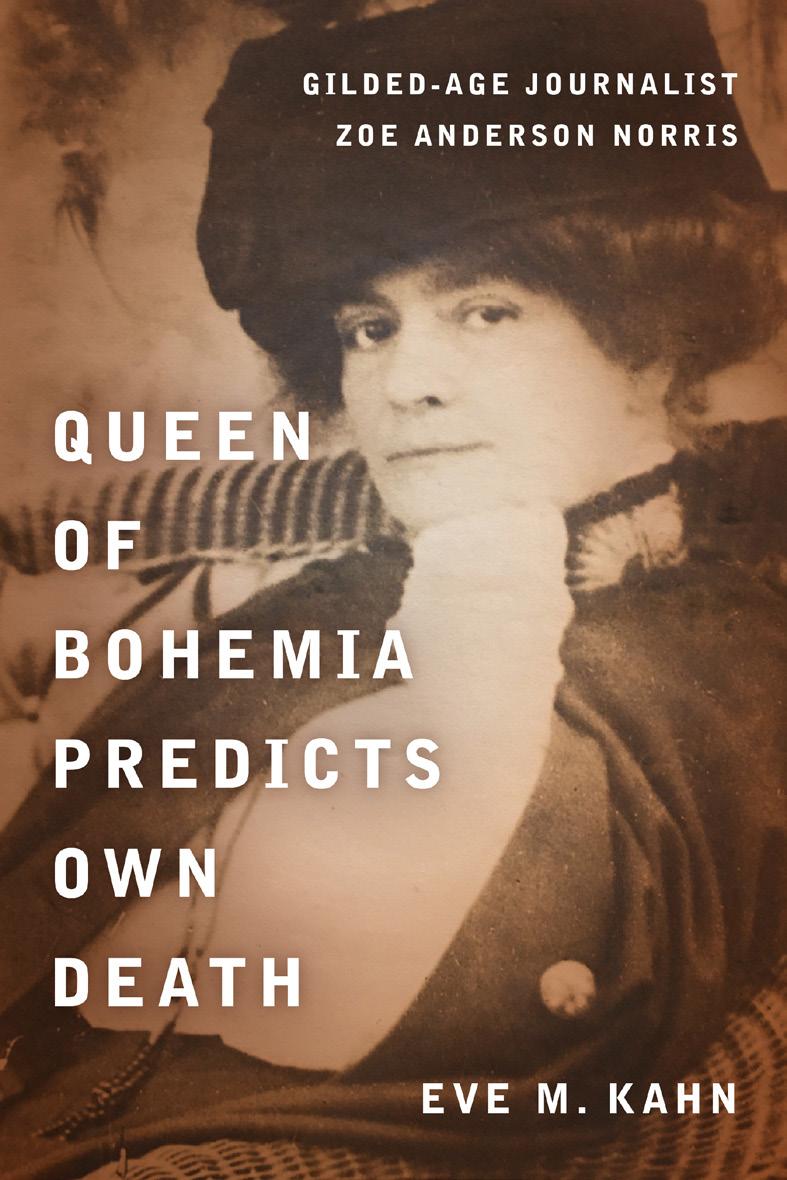
Gilded-Age Journalist Zoe Anderson Norris
EVE M. KAHN
304


“A daring story told with exceptional verve. Zoe Anderson Norris wielded her pen as a trumpet on behalf of the underclasses. Eve Kahn wields her pen as a violin, playing an expansive song of this too-long-forgotten woman, a writer whose unbridled, fiercely principled life is exactly right for our moment.”—Amy Reading, author of The World She Edited: Katharine S. White at The New Yorker
“This deeply researched and beautifully illustrated biography brings a fascinating, complex figure back to life. Kahn’s nuanced page-turner does justice to Zoe Norris’s devotion to underdogs and her struggle for independence against constant social pressures. Kahn’s passion for this untold story (a passion which mirrors her subject’s) energizes every page of this vivid, empathic biography. Queen of Bohemia Predicts Own Death is both a compelling read and a gripping work of feminist recuperation.”—Carla Kaplan, author of Troublemaker: The Fierce, Unruly Life of Jessica Mitford
“What a phenomenal subject is Norris, who turned every inch of her life experience— from Confederate Kentucky to New York’s Lower East Side—into fiction and reporting of irrepressible verve, variety, and truth. Worming her way into sites the press would rather forget, she gave voice to generations of struggling and striving New Yorkers and exposed miserly charities after the Triangle Shirtwaist fire. In Eve Kahn, Norris has a biographer worthy of her own virtuosity, an exacting, exuberant storyteller who gives Norris and old New York breath again.”—Christine Cipriani, biographer of Ada Louise Huxtable (forthcoming) and coauthor of Cape Cod Modern: Midcentury Architecture and Community on the Outer Cape, winner of the Historic New England Book Prize
“Zoe wonderful! Queen of Bohemia Predicts Her Own Death is not just a woman writer writing about another woman writer, but a force of nature writing about another force of nature. Eve Kahn has gone down every conceivable rabbit hole to produce an astonishing and inspirational resurrection of Zoe Anderson Norris, one of the most captivating, empathetic, and prolific journalists of her era. I fell in love with Zoe after reading the magazine she produced. Lost no more, Zoe can now take her well-deserved and long overdue place in American literary history—Fanny Wright, Charlotte Perkins Gilman, Nellie Bly, and Gloria Steinem, all rolled into one.”—Steven Lomazow, MD, co-curator/ co-editor Magazines and the American Experience
“Incredibly well researched and extremely enjoyable. Kahn is a wonderful storyteller, whose narrative highlights the beauty and humor of Zoe’s prose.”—Jennifer Putzi, William & Mary
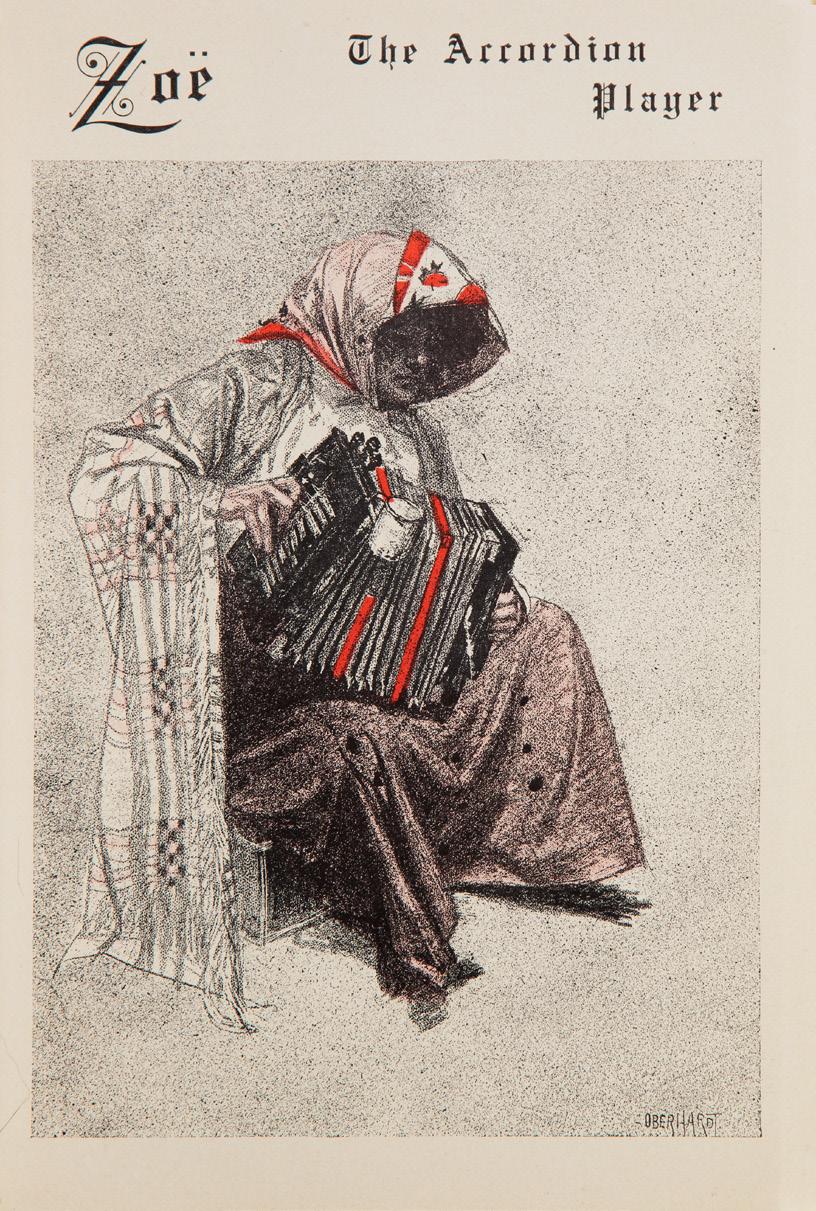

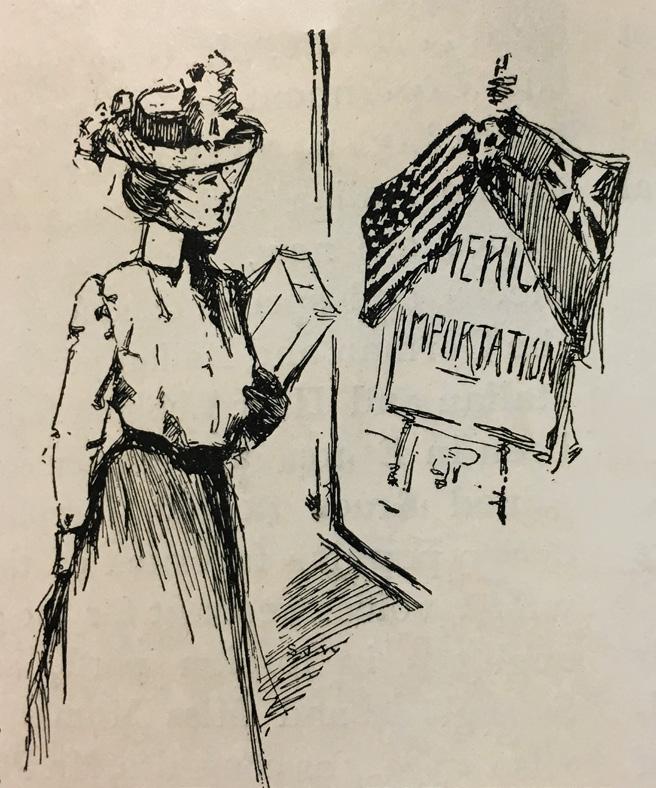

A trailblazing journalist who took on New York’s Gilded-Age injustices
Zoe Anderson Norris was a woman ahead of her time. A Kentucky-born belle turned fearless Manhattan journalist, she used her pen as a weapon in the fight for justice. From exposing slumlords and corrupt politicians to advocating for impoverished immigrants, she captured the injustices of her era with a wit and tenacity that still resonate today. In this first biography of Norris, independent scholar Eve Kahn restores her legacy, illuminating her work as a novelist, magazine publisher, and social reformer who challenged the powerful and gave voice to the oppressed.
A prolific writer and editor, Norris chronicled the struggles of Lower East Side immigrants in her self-published periodical, The East Side, often going undercover to report on the harsh realities of tenement life. She documented tragedies such as the Triangle Shirtwaist Factory Fire, publicly denounced predatory men, and advised women on seizing control of their destinies. With her bohemian spirit, she led the Ragged Edge Klub, a gathering of artists, writers, and social critics who rejected the status quo.
But Norris’s courage came at a personal cost. Her life was marked by tumultuous relationships, family estrangement, and battles against the very injustices she exposed. She endured financial struggles, unfaithful or deadbeat husbands, and social ostracization for her refusal to remain silent. In her final issue of The East Side, she eerily predicted her own death, an uncanny premonition that made national headlines before she faded into obscurity.
With meticulous research and captivating storytelling, Kahn brings Norris’s extraordinary life back into the spotlight. Drawing on newly uncovered archival materials, including Norris’s own writings, letters, and investigative reports, Queen of Bohemia Predicts Own Death sheds light on a fearless journalist whose influence on investigative reporting and social justice continues to be felt today. This biography is a compelling testament to the power of the written word in the fight for truth and equity.
EVE M. KAHN , an independent scholar, is a regular contributor to The New York Times and author of the award-winning monograph Forever Seeing New Beauties: The Forgotten Impressionist Mary Rogers Williams, 1857–1907.

ADEDAYO AGARAU
96 pages, 6 x 8
9781531511616, Trade Paperback, $19.95 (TP), £15.99
Simultaneous electronic edition available
Poetic Justice Institute
SEPTEMBER
Poetry | African Studies | Postcolonial Studies
“In the haunting horrorscape of these poems, crying bones usurp the streets; ‘days of vanishing’ darken into nights of wrenching anguish. ‘Everywhere weed grows is a wide mouth eating children.’”—Niyi Osundare, author of Songs from the Marketplace
“Evil is a question for God and beauty emerges despite what the politicians have ruined... In this harrowing collection, Agarau shapes and sifts through shadow until light treads steadily home.”—Remica Bingham-Risher, author of Room Swept Home
“With exquisite sensitivity, rigorous measure, and steadfastness, Agarau writes a history in which the personal and lyrical necessarily run through its marrow.”—aracelis girmay, author of the black maria
“In a world that clamors for universality, Agarau looks within—invested in bringing to mind the beauty and brutality of his community, reminding us that humans are more alike than they are not.”—
D. M.
Aderibigbe, author of How the End First Showed
Winner of the 2023–24 Poetic Justice Institute Editors Prize for a BIPOC Writer
In this unflinching debut collection, Adedayo Agarau confronts the harrowing reality of ritual killings and child abductions that have terrorized Nigeria from the turbulent pre-democratic era to the present day. Set against the backdrop of rural Ibadan, The Years of Blood plunges readers into the depths of collective trauma where “memory forsakes the body at the point where fear fills the body like air.”
These poems bear witness to unspeakable atrocities through dreamlike landscapes and surreal imagery that resist rational explanation. Memory is as vital as it is ungraspable. As the painful poem “the abduction” puts it, “memory forsakes the body at the point where fear fills the body like air.” Or, in “Lilac,” where “the debris of memory / becomes the fog before you.” Agarau’s lyrical language—at once rich and broken—captures both the violence witnessed and the guilt of survival through repetitions of words, phrases, and motifs.
As both survivor and émigré to the US, Agarau explores “the weight of disappearance [that] hangs heavy over memory,” the ongoing trauma that cannot be shed, and the search for healing across continents. His poems attempt to wrest language out of terror’s domain, asking: “How many ways can the poet craft an elegy?”
Above and beyond its art, The Years of Blood is essential reading for those interested in African literature, postcolonial studies, and the intersection of personal and political history and global literature. In its unyielding approach to its subject matter, this volume is a crucial interlocutor to conversations on trauma, grief, loss, absence, migration, loneliness, and African spiritualism.
For readers of Ilya Kaminsky, Safia Elhillo, Ocean Vuong, and Claudia Rankine, this collection speaks to both specific cultural realities and universal human experiences through poetry that refuses easy consolation.
ADEDAYO AGARAU is a Wallace Stegner Fellow ’25, a Cave Canem Fellow, and a 2024 Ruth LillyRosenberg Fellowship finalist. He is the Editor-in-Chief of Agbowó Magazine: A Journal of African Literature and Art and a Poetry Reviews Editor for The Rumpus. He is the author of the chapbooks Origin of Name and The Arrival of Rain. For more information, visit www.adedayoagarau.com.

MARCELLA DURAND
FOREWORD BY
SRIKANTH REDDY
96 pages, 6 x 8
9781531511708, Trade Paperback, $19.95 (TP), £15.99
Simultaneous electronic edition available Poetic Justice Institute SEPTEMBER Poetry
“A Winter Triangle is a self-portrait as human asterism. Arriving at this wondrous book’s unfinished final sentence, we come to see what one can be.”—Srikanth Reddy, from the Foreword
Winner of the 2023–24 Poetic Justice Institute Prize, Selected by
Srikanth Reddy
A poetic exploration that reimagines form and language through celestial patterns
Informed by mystery, chaos, order and writing as container, A Winter Triangle explores poetic space and form amid the infinite possibilities of composition and change. Composed of three parts, or “points,” like its namesake asterism, this collection is inspired by Stéphane Mallarmé’s idea of composing poetry from the “senseless splendor” of the skies, as well as the designs for automata by twelfth-century inventor and engineer Ismail al-Jazari, and mythological depictions of Sirius, the dog/wolf star, as both a keeper of order and the agent of chaos and energy.
Inventing a new poetic form, the septentrional, which trembles in its own process of becoming throughout the length of the book, Marcella Durand questions the potential of poetry in the face of artificial intelligence, climate change, and political turbulence in which language is often twisted into the opposite of its own meaning. By counting the seven syllables of the septentrional and opening spaces (caesura) within the poetic line to provide breath and rejuvenation amid exhausting world events, these poems resituate poetry as an alternate space in which to reimagine the given forms of constellations and how we imagine order out of seeming chaos. Thus the question is opened as to whether the poet may ever make sense of the “senseless splendor” of the skies, or simply convey them as they are through poetry, holding the infinite within the finite, for a time.
Durand reads the “dustlike” script of the calligraphic galleon, a ship created entirely out of words, as art and struggles to understand the burning dog/wolf star that stands between law and lawlessness. Is there actual connection between stars in the constellations we have invented? Can we find room for composition within the broken loops of infinity? At the point between old and new, bow and arrow, chaos and order, A Winter Triangle asks us to face the overwhelm of change—selfinflicted, invented, planetary, and real.
MARCELLA DURAND is the author several volumes of poetry including, most recently, To husband is to tender. A recipient of the 2021 C.D. Wright Award in Poetry from the Foundation of Contemporary Arts, she is also the co-editor with Jennifer Firestone of Other Influences: The Untold History of Avant-Garde Feminist Poetry.
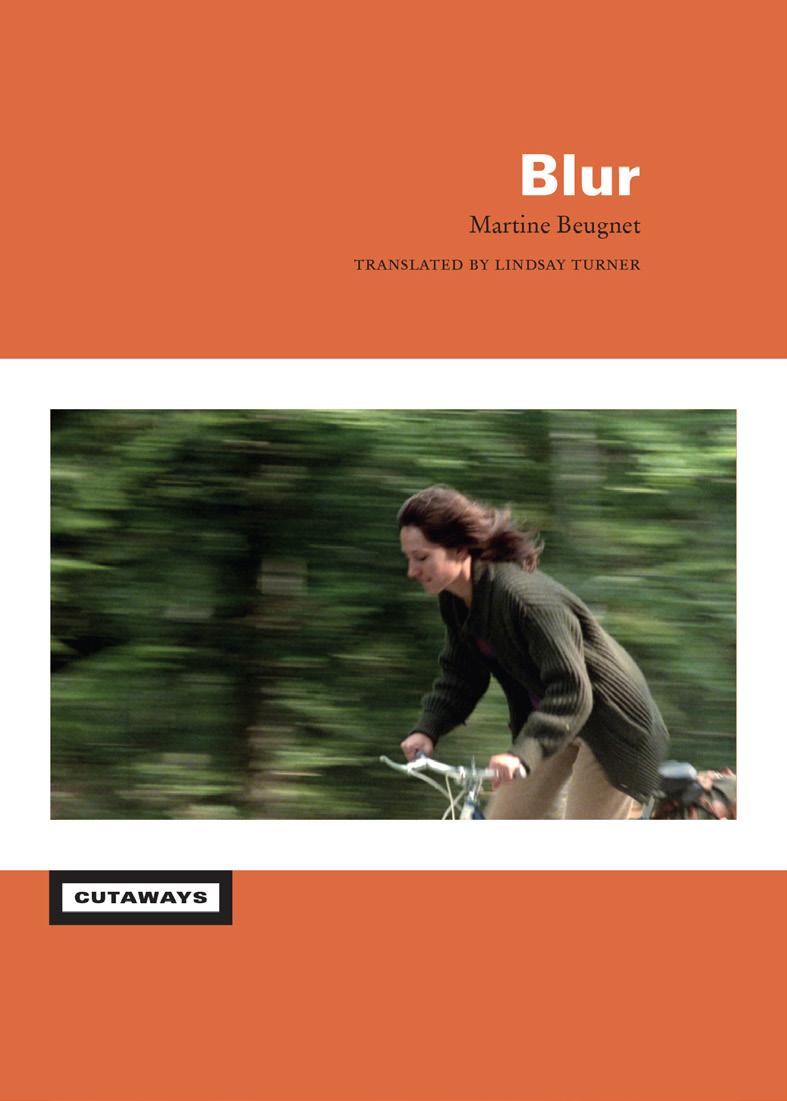
144 pages, 5 x 7, 14 color illustrations 9781531511739, Trade Paperback, $19.95 (TP), £15.99 9781531511746, Hardback, $70.00 (SDT), £58.00 Simultaneous electronic edition available FEBRUARY
Cinema & Media Studies | Art & Visual Culture
“Beugnet’s ingenious insights seep like a fog into once-crisp categories of film analysis, unsettling notions of blur as visual deficiency. Near-sighted characters, formless smudges, teary and weary vision, and perspectival and atmospheric distortions energize this compelling love song to the affordances of and cinematic predisposition toward visual chaos, vagueness, uncertainty, and confusion. Clearly, it’s the perfect moment for both cinema and blur.”—Karen Redrobe, author of Crash: Cinema and the Politics of Speed and Stasis
Technological failure or essential element of film aesthetics? From auteur cinema to horror to experimental film, Martine Beugnet shows the powerful effects blur can produce
In cinema, blurriness is usually intended to go unnoticed. When it appears it is either considered an error—a mistake of focus or a technological failure—or a background effect of shallow focus intended to offset a defined image. As Martine Beugnet argues, however, blur is an essential feature of the cinema, possessing its own properties and affordances, and capable of powerful effects.
Examining an array of notable examples of blurriness from horror to art cinema and experimental film, and including the works of the Lumière brothers, Josef von Sternberg, Agnès Varda, and many others, she develops a taxonomy of blurs, from speed and motion blur to the hand-held, “shaky camera” blur common in contemporary digital cinema. These wide-ranging instances all return the viewer to the sensorial and material qualities of the moving image.
In the face of technological developments that valorize sharpness as an indicator of progress, blur stands as a provocative reminder of the value of uncertainty—a sign of the irreducible mystery at the heart of the filmic image.
MARTINE BEUGNET is Professor in Visual Studies at the Université Paris Cité and a member of ECHELLES, a CNRS research institute. In English, she is the author of Cinema and Sensation and Claire Denis, coauthor of Proust at the Movies, and coeditor of Indefinite Visions: Cinema and the Attractions of Uncertainty
LINDSAY TURNER is Associate Professor of English and Creative Writing at Case Western Reserve University. She is the author of two collections of poetry and has translated books by Stéphane Bouquet, Éric Baratay, Souleymane Bachir Diagne, Anne Dufourmantelle, Richard Rechtman, Ryoko Sekiguchi, and others.
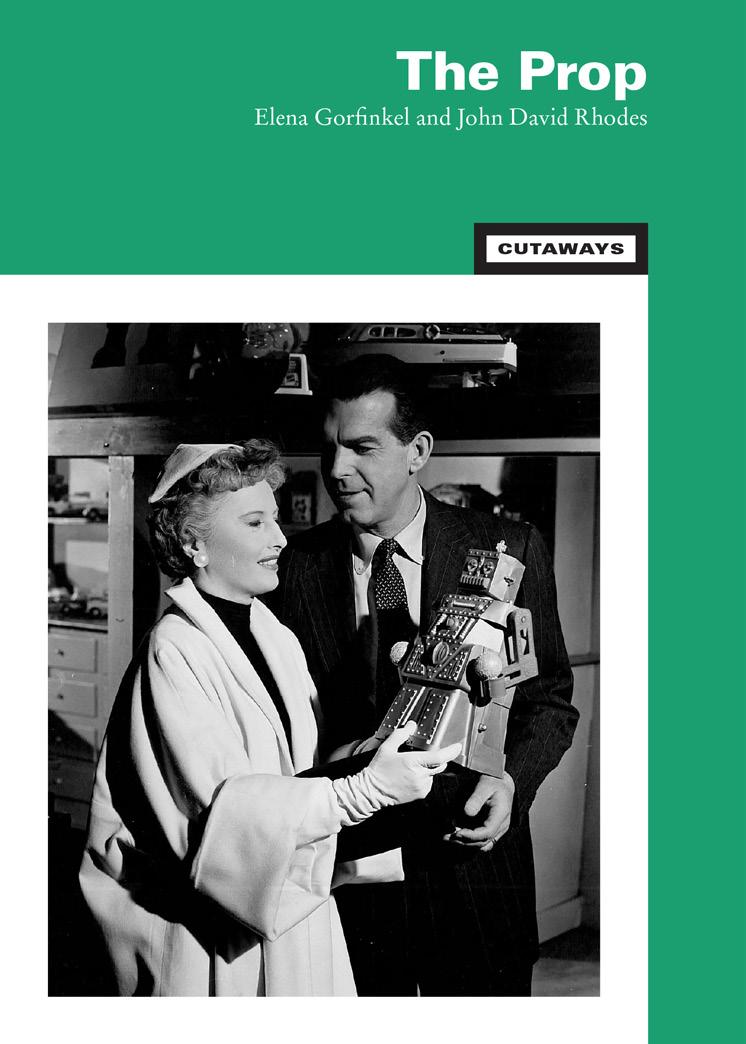
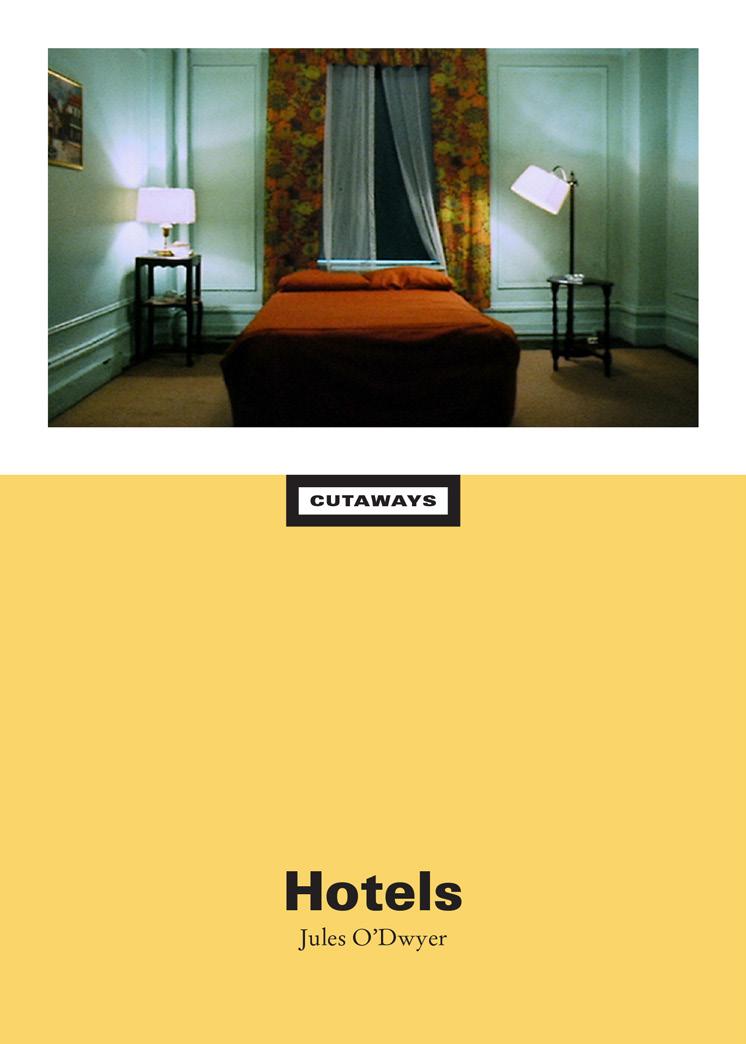
“A beautiful object in itself, Gorfinkel’s and Rhodes’ inspiring book brings to life the object in film. It gives the prop its deserved close-up and in doing so unravels a fascinating new way of looking at cinema.”—Joanna Hogg, director of The Souvenir
“. . . explores the importance of objects in movies.”—Vogue
“Ambitious, thoughtful and stimulating in its ideas, the book is also enjoyable for its open, informal approach.”—Sight & Sound
ELENA GORFINKEL is Reader in Film Studies at King’s College London. She is the author of Lewd Looks: American Sexploitation Cinema in the 1960s and Wanda
JOHN DAVID RHODES is Professor of Film Studies and Visual Culture at the University of Cambridge. He is the author of Spectacle of Property: The House in American Film, Meshes of the Afternoon, and Stupendous, Miserable City: Pasolini’s Rome.
176 pages, 5 x 7, 9 b/w illustrations
9781531509613, Trade Paperback, $19.95 (TP), £15.99 9781531509606, Hardback, $70.00 (SDT), £58.00
eBook Available Available Cinema & Media Studies
“Hotels ingeniously charts the trajectories of sight and site in the cinematic hotel, that place where the illicit transpires and fantasies are projected. From early silent shorts to the Chelsea Hotel, from Claire Denis to Atom Egoyan to Chantal Akerman, O’Dwyer shows how films and hotels have mutually constituted one another across a shared history. This slim volume offers a new way to imagine both cinema and its spaces.”—B. Ruby Rich, author of New Queer Cinema: The Director’s Cut
JULES O’DWYER is Teaching Associate in Film Studies and French at the University of Cambridge. He is the author of The Seduction of Space: Cruising French Cinema
144 pages, 5 x 7, 8 b/w illustrations
9781531509651, Trade Paperback, $19.95 (TP), £15.99
9781531509644, Hardback, $70.00 (SDT), £58.00
eBook Available Available Cinema & Media Studies
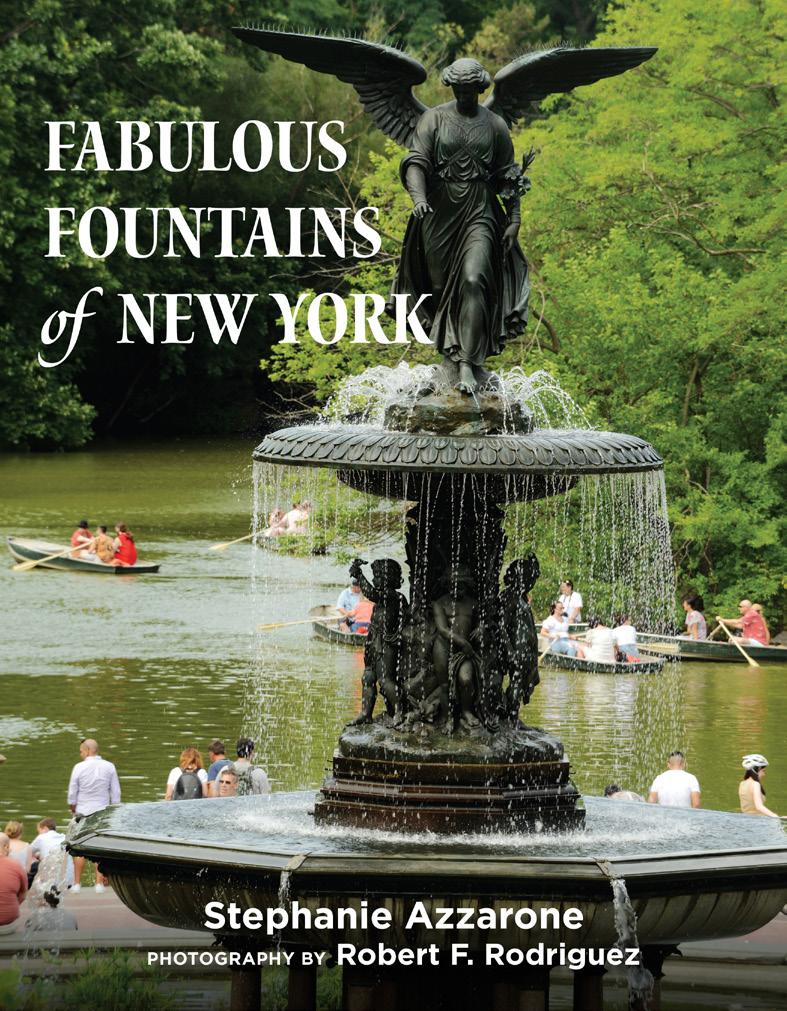
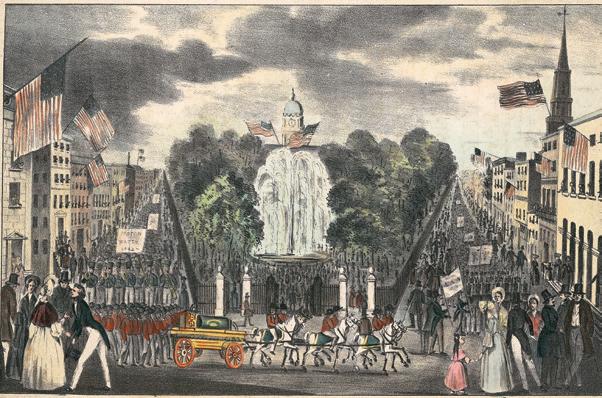
“With meticulous research and engaging text, author Stephanie Azzarone has presented her readers with a comprehensive and very readable view of one of New York City’s treasures, its fountains. The accompanying photographs entice us to look further. Anyone who has encountered a flowing fountain in New York City will understand Azzarone’s fascination. This book is a lovely gift to New Yorkers and to the history of New York City.”—Joan Adler, Executive Director, Straus Historical Society
“Fabulous Fountains of New York is an instant classic. As a fabulous, complete compendium of the fascinating individual histories of each of these unique urban aquatic monuments, it is a valuable source for historians, academics, civic designers, curious New Yorkers, NYC aspirers, and water fetishists. I was delighted to learn about the fabulous fountain (and its antecedents) in my own park!’“—Skip Blumberg, Friends of City Hall Park, documentary filmmaker, and third-generation New Yorker
A stunning exploration of New York’s most enchanting fountains
STEPHANIE AZZARONE
PHOTOGRAPHY BY ROBERT F. RODRIGUEZ
York City & Regional | Architecture | History
New York City’s fountains are more than just decorative features—they are historical landmarks, cultural icons, and dynamic works of art that shape the city’s landscape. In Fabulous Fountains of New York, award-winning author and native New Yorker Stephanie Azzarone takes readers on a captivating journey through the artistry, history, and hidden stories behind these remarkable waterworks.
From the grandeur of Central Park’s Bethesda Fountain to the sleek modern cascades of the Unisphere in Queens, this beautifully illustrated book showcases more than fifty fountains across all five boroughs. Alongside these celebrated landmarks, Azzarone uncovers lesser-known gems, such as Triumph of the Human Spirit and the long-forgotten temperance fountains, revealing how they reflect the city’s evolving cultural and political landscape.
With vivid storytelling, she traces the work of the architects and artists who shaped these fountains, exploring the historical events they commemorate and the scandals, controversies, and tragedies that surround them. Whether serving as refreshing retreats on hot summer days, symbols of civic pride, or gathering places for contemplation and protest, New York’s fountains have played a vital role in the city’s life.
Accompanied by breathtaking photography by Robert F. Rodriguez, Fabulous Fountains of New York captures the beauty and movement of these dynamic waterworks—from classical bronze and stone sculptures to contemporary interactive installations. Perfect for history buffs, architecture enthusiasts, and urban explorers, this book invites readers to rediscover New York through its most mesmerizing fountains.
STEPHANIE AZZARONE is the author of the award-winning Heaven on the Hudson: Mansions, Monuments, and Marvels of Riverside Park (Fordham). A former journalist (freelancer for The New York Times and New York magazine, among others), she also headed a Manhattan public relations agency.
Formerly a photo editor for The Daily Mail and Gannet Newspapers, ROBERT F. RODRIGUEZ has more than forty years of experience photographing New York City and its environs and editing the photos of others.

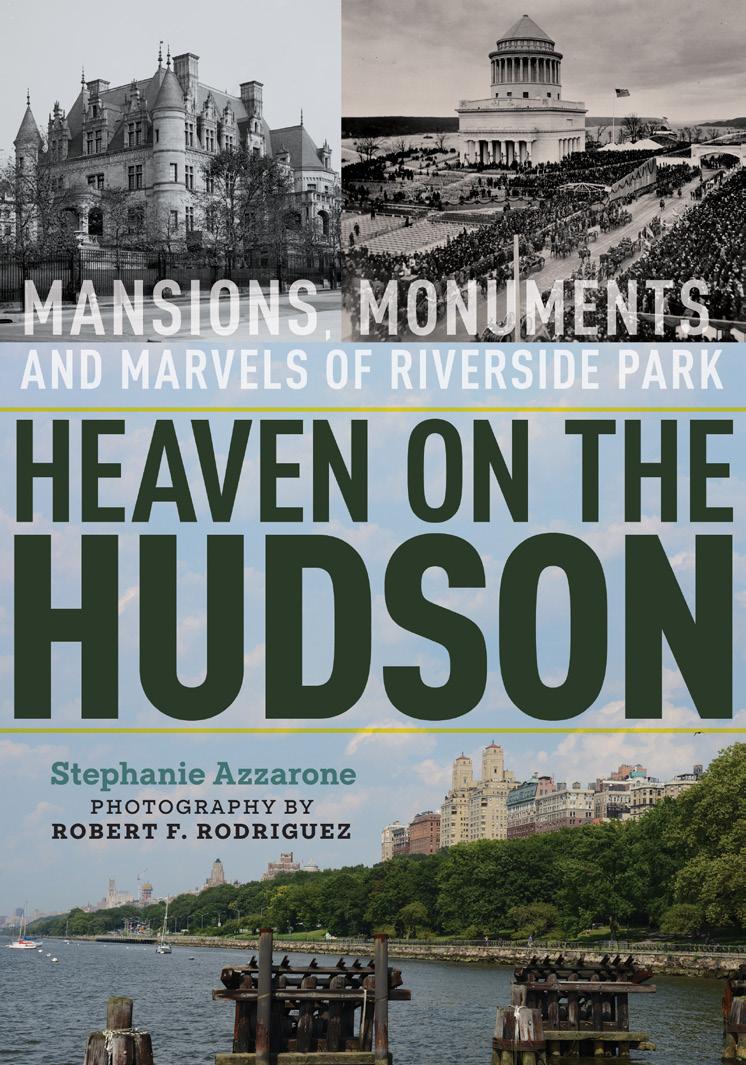
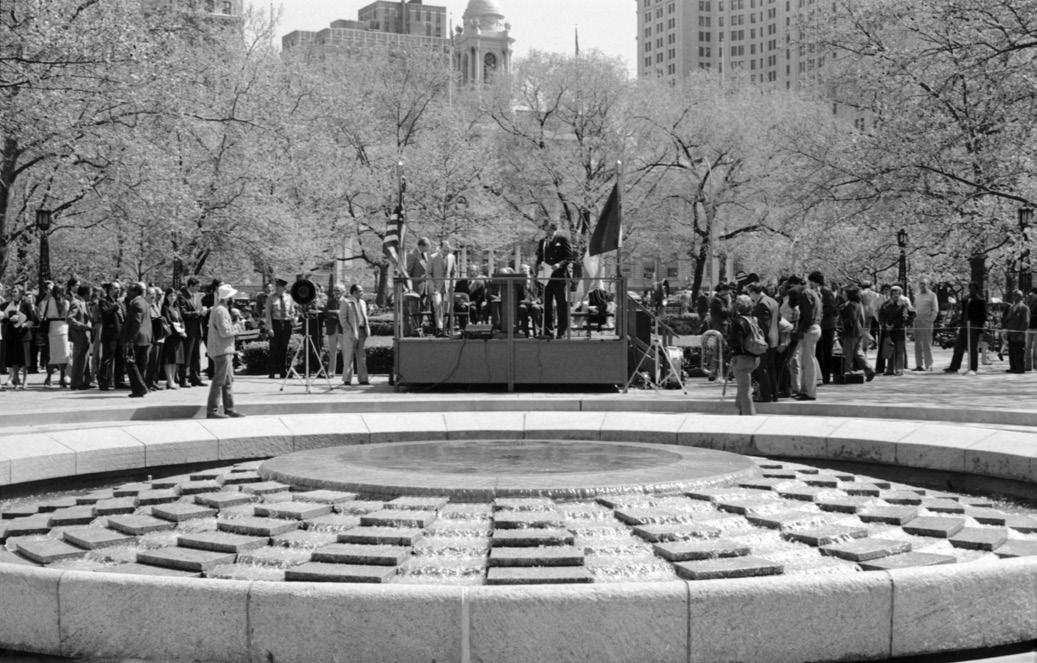

Winner, Victorian Society in America Book Award
“[Riverside Park], this urban gem and its neighborhood are chronicled in longtime resident Stephanie Azzarone’s Heaven on the Hudson. Her husband, Robert F. Rodriguez, contributed the photographs.”— New York Daily News
“Azzarone has constructed a scrumptious encomium to much more than merely that elongated swathe of greenery. . . . relates tales both enlivening and horrifying of some of the more interesting people.”—Andrew Alpern, author of Posh Portals: Elegant Entrances and Ingratiating Ingresses to Apartments for the Affluent in New York City
“A fascinating account of the rise, fall, and rise again of Riverside Drive. Deep research and skillful storytelling makes this a brisk, lively read.”—Esther Crain, author of The Gilded Age in New York, 1870–1910
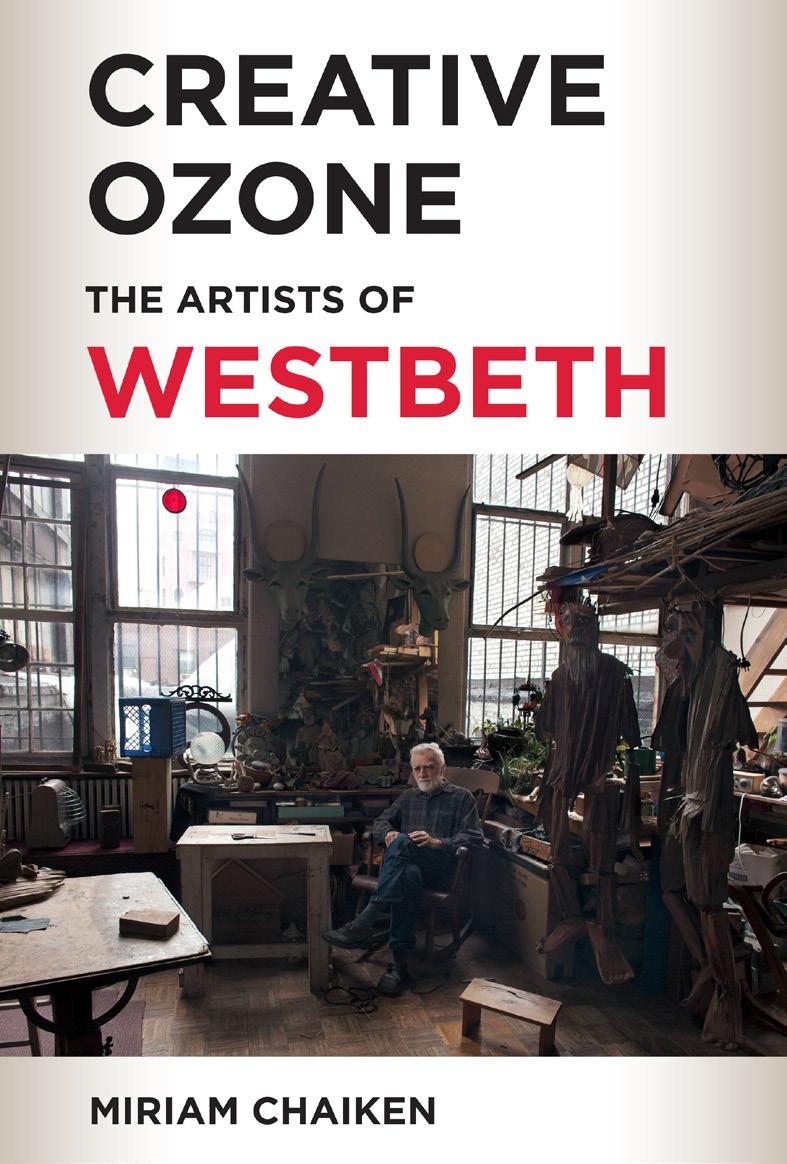
”Miriam Chaiken has documented a remarkable American social experiment, giving life to the artists of Westbeth. The book is striking, blending the anthropological tradition of thick description with sensitivity to the social significance of artists. She has combined personal connection, oral histories, and rigorous research to create a powerful story about a place and its people.” Jan English-Lueck, San Jose State University
“Chaiken captures the feeling and spirit of growing up in Westbeth and the early years of the community in a resonant way. She leaves you wanting to hear more stories—from every resident and kid. Hopefully, Creative Ozone will catalyze more research and study of this uniquely urban and cultural experiment.” Nat Oppenheimer, Senior VP, TYLin
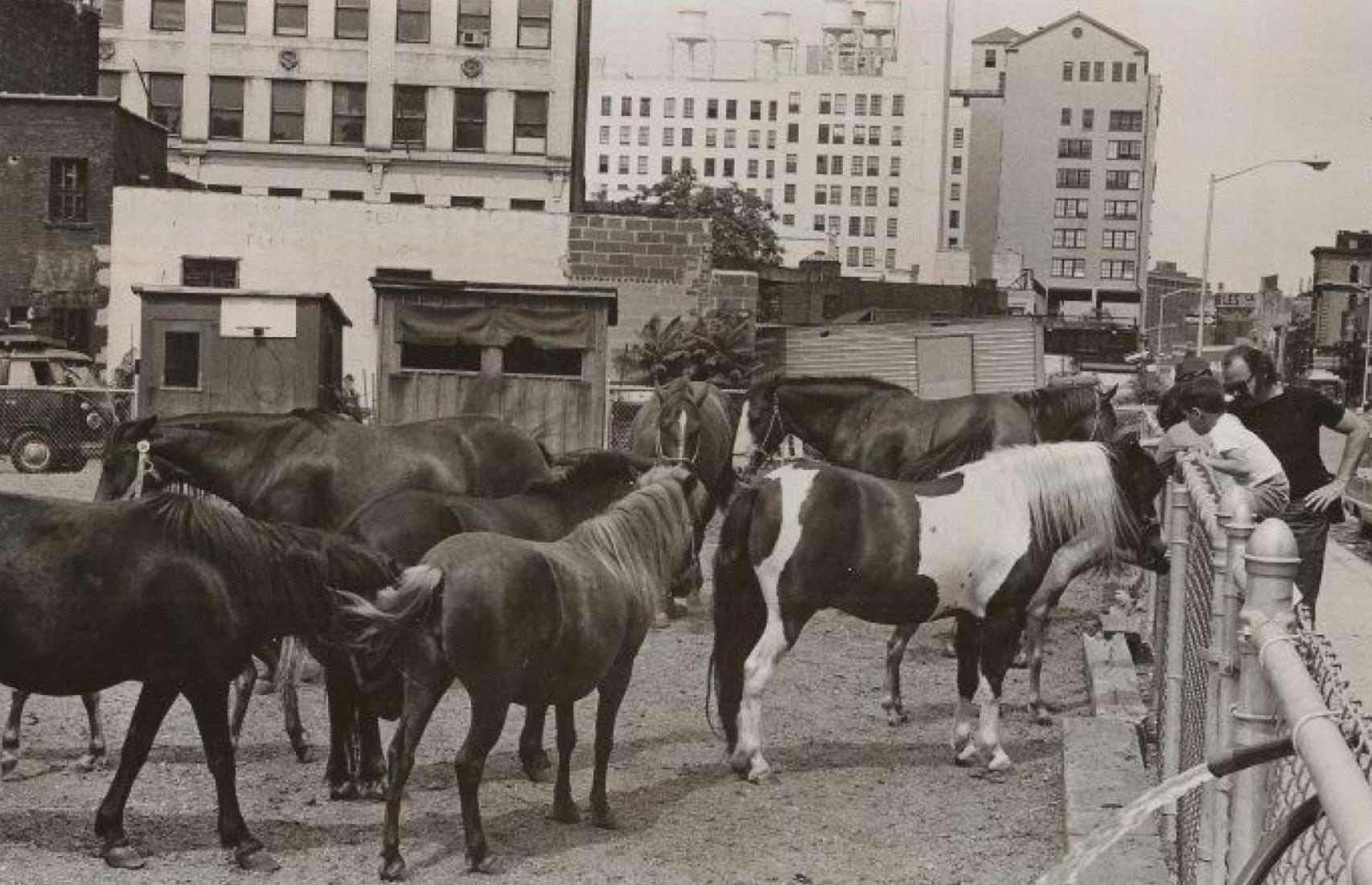
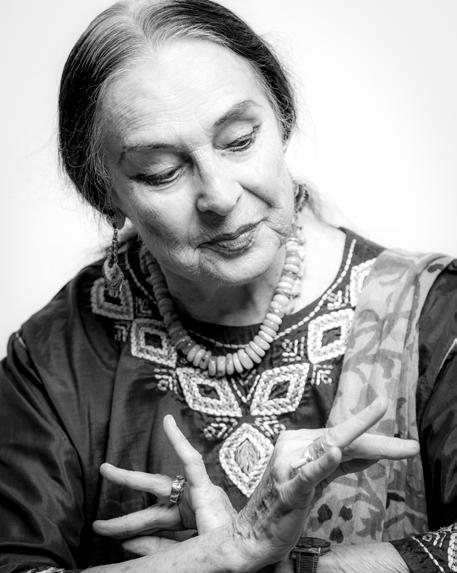





A captivating portrait of Westbeth, the legendary artists’ residence that shaped contemporary art, activism, and New York’s cultural landscape for over fifty years
In 1970, the former Bell Telephone Laboratories in Manhattan was transformed into Westbeth, an ambitious experiment in urban renewal that became the world’s largest and longest-running artists’ residence. Home to generations of visual artists, musicians, writers, dancers, and performers, Westbeth has fostered creativity, community, and activism for over fifty years.
From legendary photographer Diane Arbus and conceptual artist Hans Haacke to avant-garde theater pioneers like Joe Chaikin and Gloria Miguel, Westbeth has nurtured some of the most influential voices in contemporary art. Beyond its creative legacy, the residence has been a hub for social change. Its artists played leading roles in the anti-Vietnam protests, LGBTQ+ rights movements, feminist art collectives, and urban preservation efforts.
In Creative Ozone, Miriam Chaiken offers a rare insider’s look at this extraordinary community. Drawing on intimate interviews with multiple generations of Westbeth residents, including those who grew up in the building as “feral children” immersed in art from birth, Chaiken captures the spirit of a place where creativity and activism are inseparable. She explores how Westbeth artists have weathered gentrification, economic upheavals, and major historical events, from 9/11 and Hurricane Sandy to the ongoing pandemic, revealing the resilience of this one-square-block artistic village. Blending vivid storytelling with cultural history, Creative Ozone is a tribute to the artists who shaped, and were shaped by, New York City.
Rich with character-driven narratives, this book will captivate art lovers, history buffs, and anyone fascinated by the creative life. Whether you’re drawn to the bohemian legends of Greenwich Village, the evolution of urban spaces, or the intersection of art and activism, Creative Ozone offers an unforgettable portrait of a community like no other.
After field research on four continents, MIRIAM CHAIKEN turned her anthropological gaze to the most exotic site yet—Greenwich Village in New York City. Her examination of the Westbeth Artists Housing led her to soon conclude that this community is a vertical village, with all of the drama and intrigue. Miriam’s earlier writing draws on her anthropological research in Africa and Asia, focusing on poverty and hunger alleviation, gender equity, and the welfare of children. She has published many articles and co-edited two books on international development and community resilience.
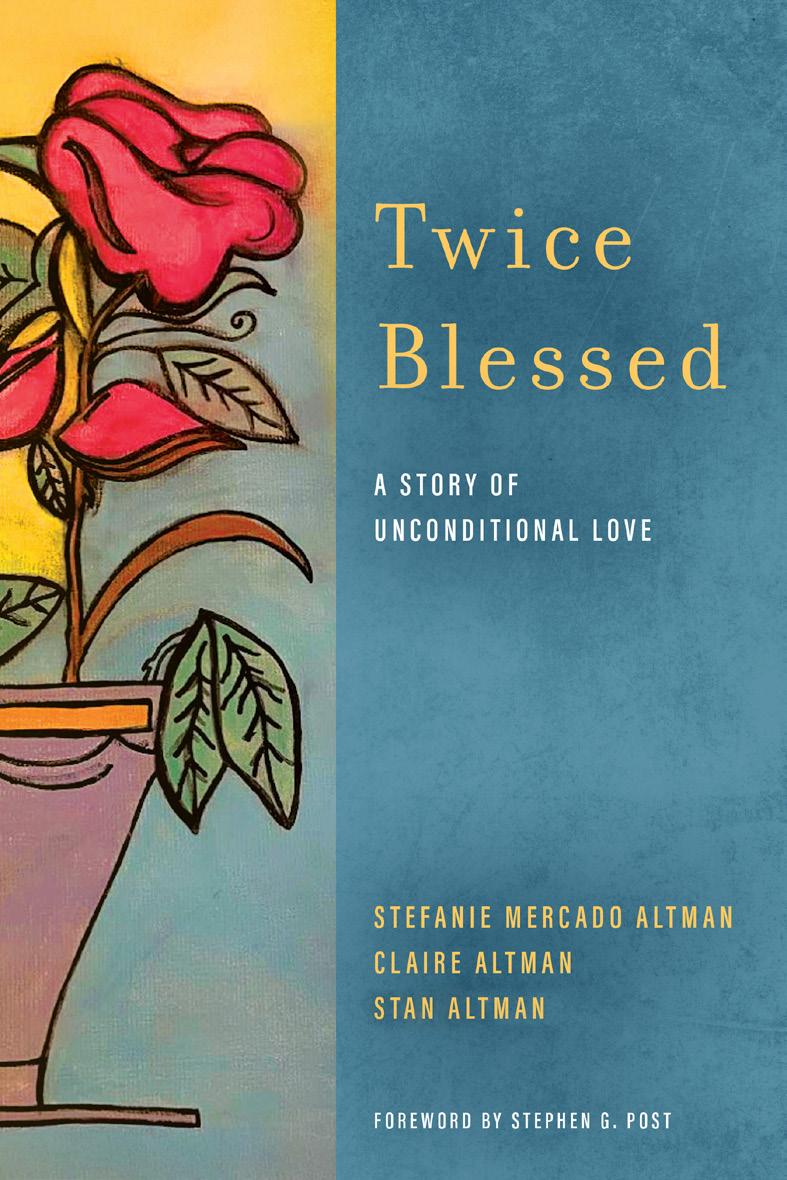
STEFANIE MERCADO ALTMAN, CLAIRE ALTMAN, AND STAN ALTMAN
FOREWORD BY STEPHEN G. POST
304 pages, 35 b/w illustrations
9781531511807, Hardback, $29.95 (HC), £24.99
Simultaneous electronic edition available
OCTOBER
New York City & Regional | Memoir | Sociology
“Adoption always begins in tragedy. And the Altmans’ story is no exception. But the story of Stefanie, Claire, and Stan is much more. It is the story of a dying mother who gets to choose how her daughter will be raised. It is the story of a couple past their childbearing years who learn to be the parents a little girl needs. It is the story of a girl’s resilience through devastation and instability. It is the story of a maddening journey through family court. Most of all, though, Twice Blessed is the story of a family forged through love.”—Naomi Riley, Senior Fellow, American Enterprise Institute, and author of No Way to Treat a Child
“In this book, the Altmans recount a moving personal and professional saga that is deeply intertwined with the tumultuous history of New York City in the late twentieth and early twenty-first centuries. As Claire and Stan were involving themselves in the early battles against the twin epidemics of HIV/AIDS and homelessness, threemonth-old Stefanie came into their lives in a manner that seems at first accidental, but ultimately foreordained. Determined to fulfill their pledge to Stefanie’s dying mother, and fueled by their growing affection for Stefanie and hers for them, Claire and Stan navigate the reefs and shoals of New York family law toward the goal of adopting her. Twice Blessed tells a valuable story about both the complexity of chosen family and the simplicity of the love that undergirds it.”—David Hansell, Former Commissioner, New York City Administration for Children’s Services
“This is the story of an incredible journey, made all the more riveting by the fact that it is told in the clear, open, and insightful voices of Claire, Stan, and their (adopted) daughter Stefanie. I have performed numerous psychiatric evaluations for Family Court, Juvenile Court, and adult Criminal Court proceedings, and I have seen how our failure to protect and support a child can result in a troubled adult. In contrast, this story clearly demonstrates how a child with a difficult beginning can become a well-functioning, compassionate adult when she, or he, receives the nurture, guidance, support, and yes, love that she requires. If only we truly invested in systems that would identify such children and appropriately intervene in their lives, instead of simply focusing on punishing those adults we had failed to protect.”—Richard G. Dudley, Jr., MD, Clinical & Forensic Psychiatrist
“This is a captivating book that highlights love, faith, and selfless commitment to parenting an orphaned child. It is a story of healing, resilience, and celebration of creating a family in a pluralistic community through formal adoption. This is a mustread book for child welfare and mental health professionals.”—Rosa M. Gil, DSW, President Emerita, Comunilife, Inc., Former Executive Deputy Commissioner, Family and Children Services, NYC Human Resources Administration
“What makes Twice Blessed unique and important is how Stefanie, Claire, and Stan’s individual experiences and perceptions create a fulsome, complete narrative. Each of us should play a significant role in the forming of a family. Twice Blessed sheds light on the equally significant roles that trust, patience, endurance, and love play. A truly worthwhile read!”—Ronald E. Richter, CEO & ED, JCCA | Repair the world, child by child
“This is a wonderful story about love, loss, and commitment. Stan and Claire’s unwavering support of Rosa and their unconditional love for Stefanie are testament to how family can be found in unexpected places, and it can blossom regardless of race, ethnicity, religion and all the things that we mistakenly believe define our lives. Stefanie’s strength and resilience in the face of all her early losses and suffering are a tribute to the power of love.”—Lilliam Barrios-Paoli, Former New York City Deputy Mayor for Health and Human Services
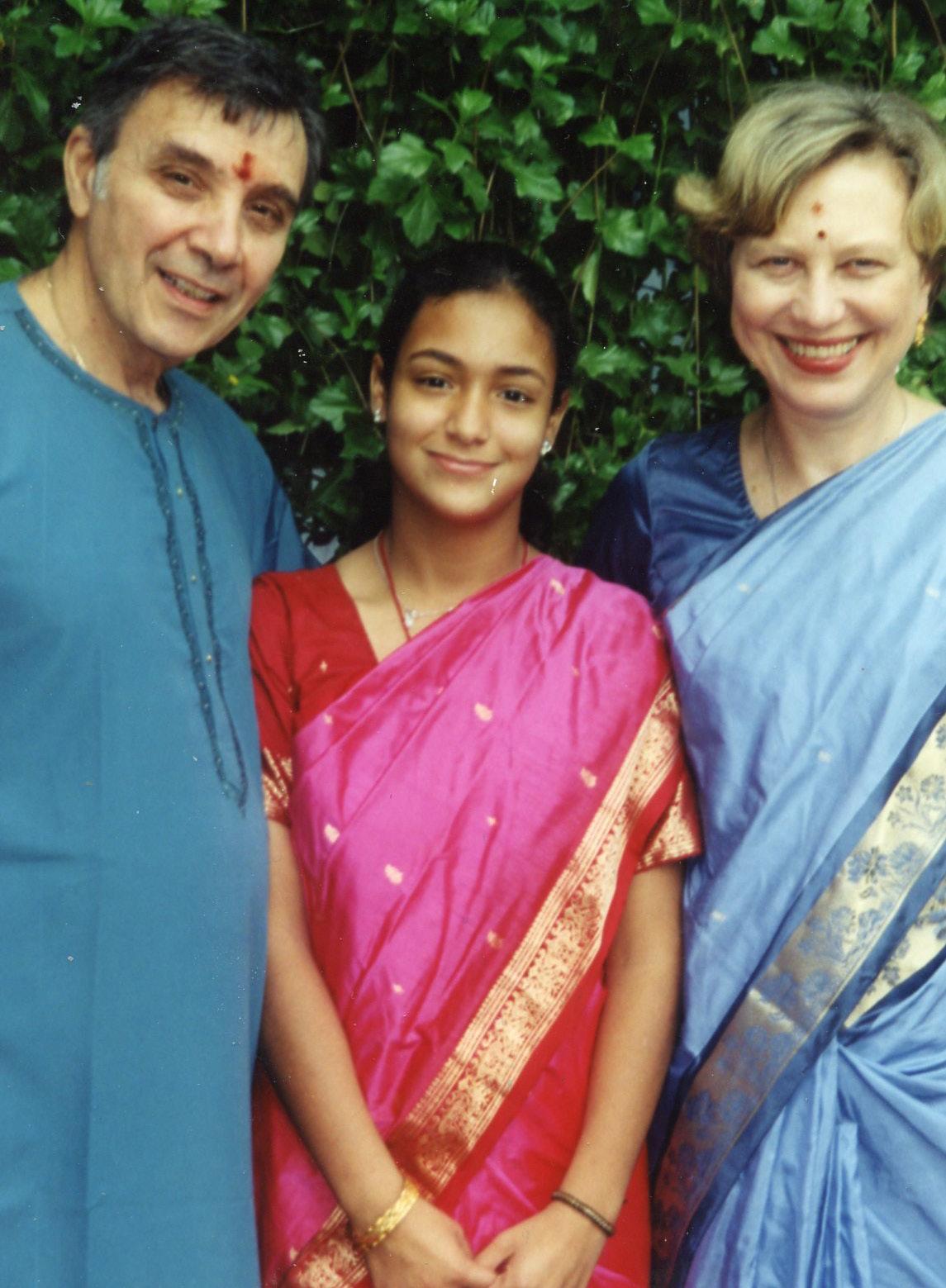
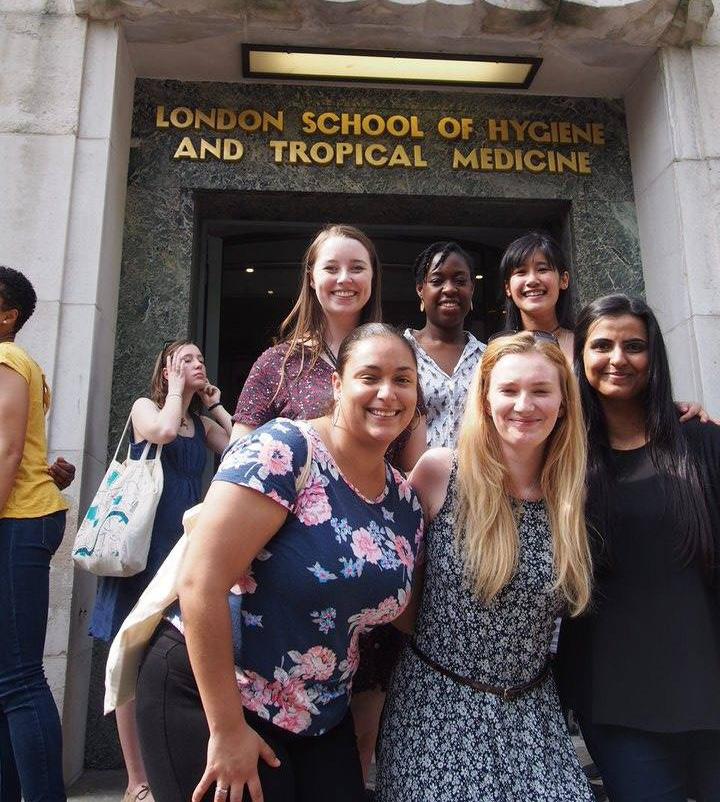
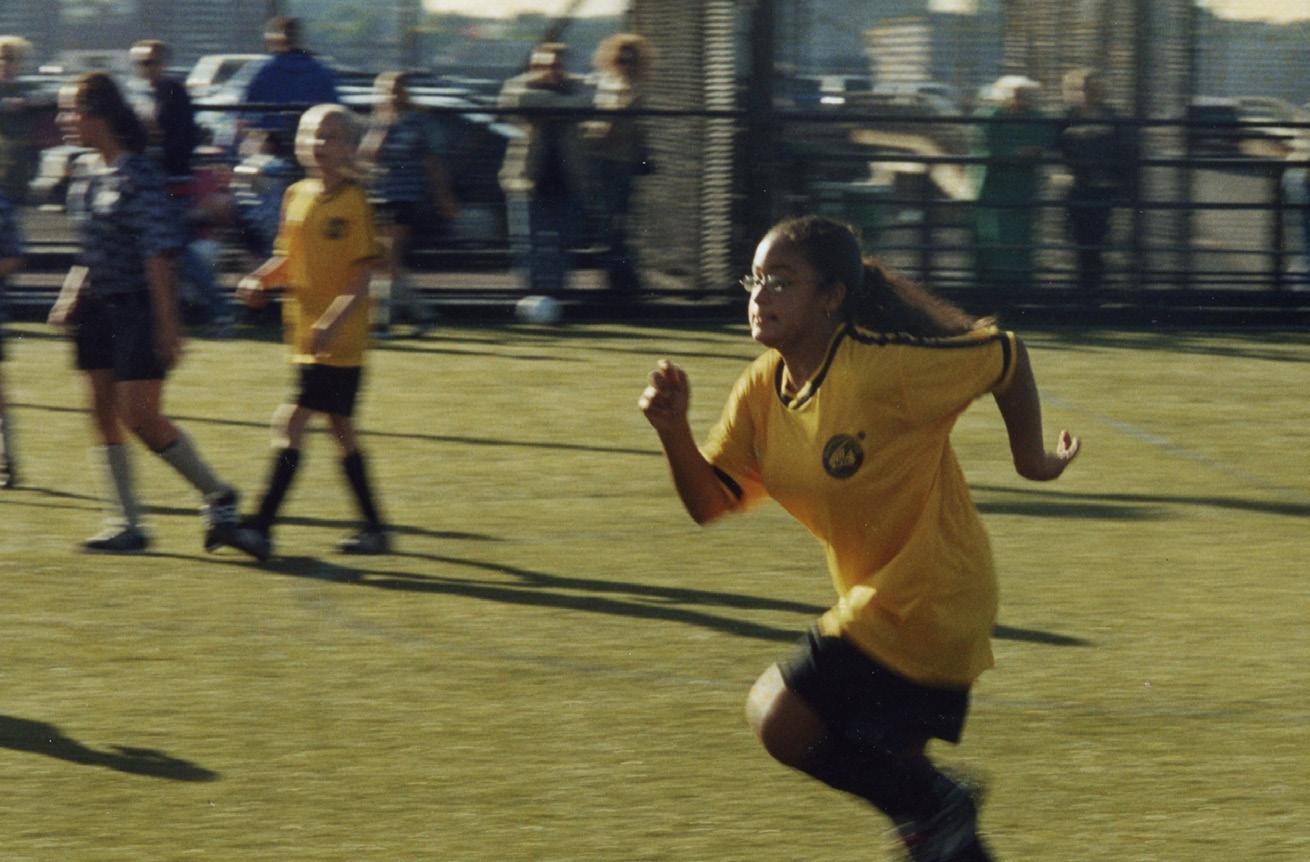
A deeply moving memoir of love, resilience, and identity, chronicling one family’s journey through adoption, caregiving, and the profound connections that define us
Twice Blessed is a beautifully written memoir that explores the depths of love, resilience, and the true meaning of family. Stefanie Mercado Altman, Claire Altman, and Stan Altman share an intimate and inspiring story about the bonds that define us, from adoption to caregiving and beyond. When Stefanie was adopted by Claire and Stan, their family was built on love and trust rather than biology. As they navigated the joys and struggles of parenting, they faced challenges that tested their resilience, including Stefanie’s search for identity and connection with her birth mother, Rosa, a gifted artist whose struggles with AIDS cast a long shadow.
From the highs of new beginnings to the heartbreak of loss, Twice Blessed captures the complexities of relationships and the sacrifices made in the name of love. The story unfolds with warmth, humor, and honesty, offering a powerful perspective on what it means to belong. Through Stefanie’s journey of self-discovery and the family’s steadfast devotion, the book paints a vivid portrait of compassion and perseverance.
Engaging and deeply moving, Twice Blessed speaks to anyone who has ever questioned their place in the world or searched for a deeper understanding of family. This book will resonate with fans of personal memoirs, adoption narratives, and heartfelt stories about love that transcends boundaries.
STEFANIE MERCADO ALTMAN is a public health professional, writer, and advocate for adoption, identity, and mental health awareness. She has been published in Anthology of Poetry by Young Americans and lives in Brooklyn, NY, where she continues her advocacy work.
CLAIRE ALTMAN is a writer, lawyer, and consultant specializing in affordable housing, social services, and public policy. She has developed innovative programs supporting families, seniors, and formerly incarcerated individuals and has dedicated her career to social impact initiatives.
STAN ALTMAN is a professor of public affairs and a higher education leader with over fifty years of experience. He has served as interim President of Baruch College and Dean of the Austin W. Marxe School of Public and International Affairs at CUNY. Currently, he directs the Gaming Pathways Program at City College of New York, focusing on education, workforce development, and technology-driven learning initiatives.
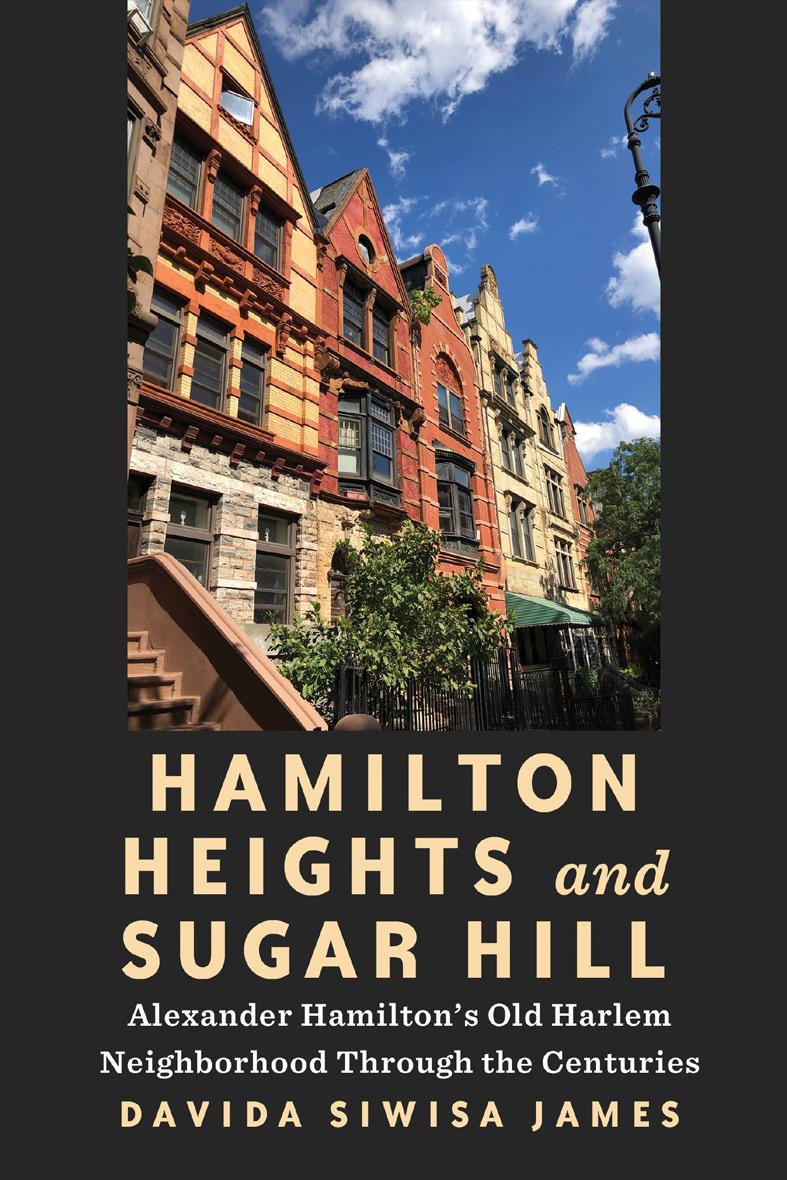
Alexander Hamilton’s Old Harlem Neighborhood
DAVIDA SIWISA JAMES
434 pages, 128 b/w illustrations 9781531511586, Trade Paperback, $22.95 (TP), £18.99 [Hardback available: 9781531506148] eBook Available
OCTOBER
History | New York City & Regional | African American Studies
“Strings of sentences sing so poetically. Old Hamiltonian New York and twentieth-century Harlem come alive with the stories in each chapter. We lovers of New York City thank you.”—Ron Howell, Associate Professor of Journalism, Brooklyn College, author of One Hundred Jobs: A Panorama of Work in the American City
“Her story of the geography, history, architecture, and cultural life of the area covers its origins as the land of the Lenape people, colonization by the Dutch and British, the construction of Alexander Hamilton’s country estate, the Harlem Renaissance, . . . gentrification, and the present day. James describes the social connections between Harlem residents while supplying readers with context for each person she discusses, expertly capturing a sense of life in Harlem. A fascinating record of the history and culture of influential neighborhoods in Harlem.”—Amy Trendler, Library Journal
Explores four centuries of colonization, land divisions, and urban development around this historic landmark neighborhood in West Harlem
Hamilton Heights and Sugar Hill explores four centuries of colonization, urban development, and architectural splendor in this historic landmark West Harlem neighborhood. Home to Alexander Hamilton’s country estate, the creative spark of George Gershwin and Norman Rockwell, the literary genius of Ralph Ellison, and countless other luminaries, this picturesque enclave has long been a hub of cultural and artistic innovation. Davida Siwisa James brings to life its evolution—from lush farmland in the 1600s, to the Harlem Renaissance, and to its modern-day history—highlighting its remarkable residents, stunning architecture, and enduring legacy as a cornerstone of New York history.
DAVIDA SIWISA JAMES is a Philadelphia native and lived in Manhattan’s Morningside Heights and Sugar Hill. She has a BA in English from UCLA and attended Penn State Dickinson Law in Carlisle, Pennsylvania. She has been a university public relations director, a freelance journalist for the twice Pulitzer Prize–winning Virgin Islands Daily News, and has a twenty-year management career in performing arts finance and marketing. An accomplished writer, she has published nonfiction books, short stories, and poetry. She resides in Los Angeles, CA.

FELIPE LUCIANO
352 pages, 25 b/w illustrations
9781531511609, Trade Paperback, $22.95 (TP), £18.99
[Hardback available: 9781531504489]
eBook Available
SEPTEMBER
Memoir | New York City & Regional | Urban Studies
“Felipe Luicano’s writing is a powerful and poetic soul scream from a man who is not supposed to be here. No, not this poor smart-assed, rapid-tongued Black Puerto Rican kid hurtling through a survival gauntlet of gangs, police brutality, prison and a US Government that wanted him dead. And yet, this Poet, Armed Revolutionary Leader, Composer, Musicologist, Award-winning Journalist lives on with powerful relevance in the world and on the brilliant, searing pages of Flesh and Spirit.”—Jamal Joseph, Professor of Professional Practice in Film, Columbia University; Black Panther Party New York 21
“Felipe Luciano in Flesh and Spirit offers an honest, captivating, and critical account of The Young Lord’s Party in NYC, as well as his own life story. Luciano’s writing is both poetic and compelling as he weaves the reader through his life—a riveting account situated on the equally captivating foreground of the historical happenings of the Young Lord’s Party. Luciano furnishes a fresh and detailed view of the very consequential history of the Young Lords, who carved significant inroads of often militant advocacy and public awareness regarding the needs of a growing Puerto Rican community during the 1960s and 1970s in NYC. A picture of the moral, spiritual, cultural, and political struggles of Felipe Luciano himself, who is undoubtedly one of the most important social justice figures in the Puerto Rican community in NYC, is provided. His impact as an Afro-Puerto Rican extends beyond the Puerto Rican community in NYC, to many marginalized groups from the Global South in New York and many other parts of the US. Flesh and Spirit is a great read for those simply seeking a compelling biographical and historical exposition. However, it is a must read for mainland and diasporic Puerto Ricans, as well as for those interested in the cultural and political history of NYC.”—Samuel Cruz is Associate Professor of Religion and Society at Union Theological Seminary-NYC and author of Masked Africanisms: Puerto Rican Pentecostalism and Christianity and Culture: A Post-Colonial Approach
“Felipe Luciano’s memoir hails from his iconic status in New York City’s Puerto Rican culture, history, and politics. His writing is searing, poetic, insightful, magnificent, and unforgettable. This work promises to become a classic, conveying both his personal journey and the story of the Young Lords as only he could.”—Gary Dorrien, author of A Darkly Radiant Vision: The Black Social Gospel in the Shadow of MLK
Chronicles a Black Puerto Rican man’s odyssey and transformation from an incarcerated gang member to the Co-Founder of the Young Lords Party
FELIPE LUCIANO is an Emmy Award–winning journalist, news anchor, and former adjunct professor at Fordham University. He is the co-founder and chairman of the Young Lords Party, a member of The Original Last Poets, an advocate for inter-ethnic communication, and the host of “Latin Roots,” a Latino music program in New York City. A talented diversity speaker, Luciano is committed to community empowerment, ethnic pride, and civil rights. He is a regular contributor to many New York–area newspapers and magazines, including The New York Times and Essence His poetry has appeared in anthologies such as Puerto Rican Poetry: An Anthology from Aboriginal to Contemporary Time.
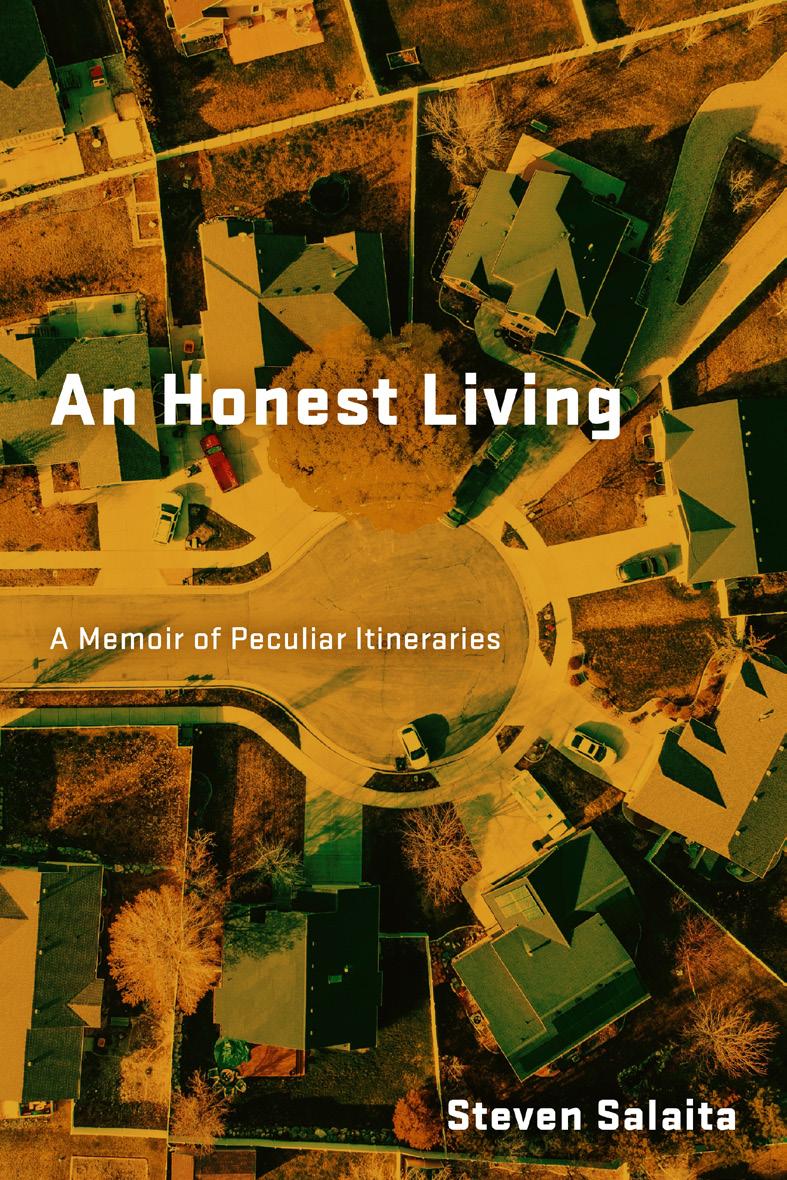
STEVEN SALAITA
178 pages
9781531511593, Trade Paperback, $19.95 (TP), £15.99 [Hardback available: 9781531506353]
eBook Available FEBRUARY
Memoir | Education | American Studies
“With beauty and fierce intelligence, An Honest Living demonstrates Salaita’s powers as a compelling storyteller with a highly original, bold, and always interesting mind, and unshakeable integrity. At times providing sharply satirical accounts of the corporate, settler colonial university, at other times, sharing intimate and moving meditations on fatherhood, exile, education, and freedom, this is a book with staying power, one that will continue to teach its readers how we might live honorably in the world.”—Cynthia Franklin, author of Narrating Humanity: Life Writing and Movement Politics from Palestine to Mauna Kea
“An Honest Living is a disabused view of the academic career as seen from the front of a school bus, the driver being a Palestinian-American ex-academic who came to the world of public transport after falling victim to modern McCarthyism. Who knew that someone with legendary grounds for bitterness against the university and the mainstream media would make such good small talk with kindergarteners or have the talents of a stand-up comedian? In an era of quit lit, Salaita tells a unique story with a unique sensibility. He comes across as a man of unflinching principle who has never stopped enjoying himself or entertaining those around him.”—Bruce Robbins, Old Dominion Foundation Professor in the Humanities, Columbia University and director of the documentary Some of My Best Friends Are Zionists
“To my mind, whether as a scholar of Native American Studies and Palestinian struggles, a teaching professor, an advocate of social justice and free speech, or a school bus driver, Steven Salaita’s career has always been about earning an honest living, financially and morally. An Honest Living is a profile in courage, filled with sharply-drawn and often tender depictions, as well as probing personal and universal revelations. A book I’m glad to have in my hands and that I will long celebrate, An Honest Living confirms that the path of decency, while full of hurdles, is the surest road to joy and emancipation.”— Khaled Mattawa, author of Fugitive Atlas
“In moments of immense honesty and searing personal remembrance, Steven Salaita takes the reader through his academic life into the moments of being blacklisted from US academe and what it has meant to find a new way of being and working in the world. An Honest Living is a book that causes us to interrogate the tropes, structures, and systems we engage on a daily basis and to always remember that on the other side of it all lies a human being.”—Matthew Shenoda, author of The Way of the Earth
“It’s hard to imagine offering [Salaita] anything other than our humanity in return for reading this insightful memoir. . . . It’s a reminder of the precarity of labor and of living.”—Mondoweiss
STEVEN SALAITA is Professor of English and Comparative Literature at the American University in Cairo. He writes at stevesalaita.com.
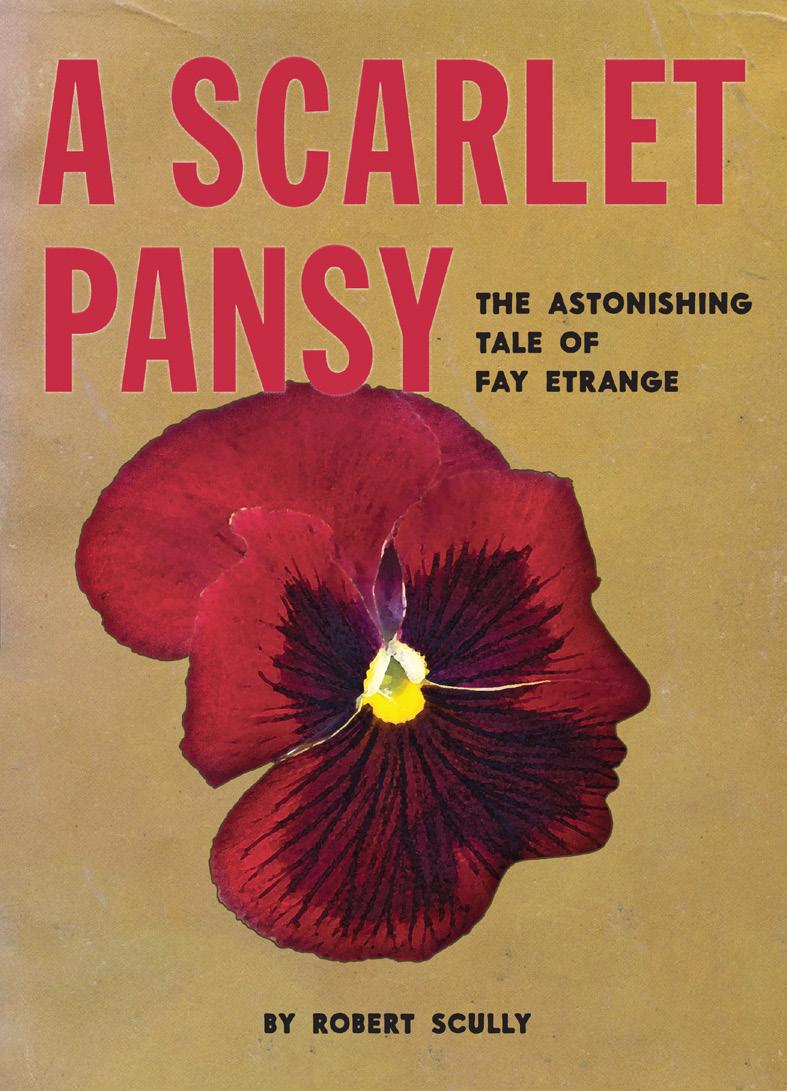
ROBERT SCULLY
EDITED AND WITH AN INTRODUCTION
BY ROBERT J. CORBER
232 pages, 6 x 8 1/ 2
9781531511906, Trade Paperback, $19.95 (TP), £15.99
Simultaneous electronic edition available OCTOBER
LGBTQ Studies | Fiction
“A dizzying mix of low camp and high drama, A Scarlet Pansy is at once laugh-out-loud funny, startling, odd, and ultimately—through the lens of our queer world today—very moving. Robert J. Corber’s insightful and astute Introduction places the novel in a clear historical context while continually highlighting the emotional power and the camp glory of the novel and the erotic adventures of its hero/heroine, Fay Etrange.”—Michael Bronski, author of A Queer History of the United States
“A Scarlet Pansy is essential reading for scholars and fans of Anglo-American queer literature. . . . To mix metaphors, this forgotten flower is quite a little gem, and Corber’s editorial efforts are worthy of readers’ deepest thanks and praise.”—American Literary History
The astonishing tale of Fay Etrange—republished in its original unexpurgated form
First published in 1932, A Scarlet Pansy is an extraordinarily vivid and richly textured depiction of American queer life in the early twentieth century, tracing the coming-of-age of androgynous Fay Etrange. Born in small-town Pennsylvania and struggling with her difference, Fay eventually accepts her gender and sexual nonconformity and immerses herself in the fairy subculture of New York City. A self-proclaimed “oncer”—never tricking with same man twice—she immerses herself in the nightclubs, theaters, and street life of the city, cavorting with kindred spirits including female impersonators, streetwalkers, and hustlers as well as other fairies and connoisseurs of rough trade. While reveling in these exploits she becomes a successful banker and later attends medical school, where she receives training in obstetrics. There she also develops her life’s ambition to find a cure for gonorrhea, a disease supposedly “fastened on mankind as a penalty for enjoying love.”
A Scarlet Pansy stands apart from similar fiction of its time—as well as that of the ensuing decades—by celebrating rather than pathologizing its effeminate and sexually adventurous protagonist. In this edition, republished in its original unexpurgated form, Robert J. Corber examines the way in which it flew in the face of other literature of the time in its treatment of gender expression and same-sex desire. He places the novel squarely within its social and cultural context of nearly a century ago. Much more than an artifact, A Scarlet Pansy remains a uniquely delightful and penetrating work of literature, resonating as much with present-day culture as it is illuminating of our understanding of queer history and challenging our notions of what makes a man a woman, and vice-versa.
ROBERT SCULLY is the unknown author of A Scarlet Pansy.
ROBERT J. CORBER is the William R. Kenan Jr. Professor in American Institutions and Values at Trinity College.

MELISSA ADLER
352 pages, 21 color illustrations
9781531511944, Paperback, $29.95 (AC), £23.99
9781531511937, Hardback, $105.00 (SDT), £87.00
Simultaneous electronic edition available NOVEMBER
American Studies | Library & Information Science | History
“In this sweeping, erudite, and posthumanistly-attuned exploration of the complexities of Thomas Jefferson’s information practices—at once entrenching a politics of domination and imagining ruptures that call forth new modes of freedom—Melissa Adler deftly brings Jefferson’s concerns into our present moment, where the role of robust information systems open to public use has never been more crucial, nor more threatened. Full of surprises found in the archives, Adler makes an urgent case for the value of the Library of Congress and libraries more generally in our political and cultural life.”—Nathan Snaza, author of Tendings: Feminist Esoterisms and the Abolition of Man
“Melissa Adler’s nuanced and original work demonstrates that history is embedded in libraries and archives, and not just between the pages of books. Traces of Thomas Jefferson show up in our cataloging and classification systems, influence our architectural decisions, and help determine what counts as history in the first place. Through rigorous engagement with Jefferson’s own words, Adler puts information studies at the center of the study of United States institutions.”—Emily Drabinski, Associate Professor, Queens College, City University of New York
How Thomas Jefferson’s vision for knowledge shapes what we know and how
As the United States approaches the 250th anniversary of the Declaration of Independence, Peculiar Satisfaction examines how the ideals and contradictions of the nation’s founding live on in libraries, archives, and museums. Thomas Jefferson championed an informed citizenry as essential to democracy, yet the systems he built to organize knowledge reinforced racial and ideological hierarchies that persist today.
Melissa Adler explores Jefferson’s lasting influence on public institutions, from his personal library, which became the foundation of the Library of Congress, to his archival practices in government record-keeping and his museum at Monticello as a site of colonial knowledge production. Through an interdisciplinary lens, she reveals how his methods of classification and preservation shaped national memory and democratic participation.
Drawing from archival research and critical theory, Peculiar Satisfaction exposes the paradoxes of access, exclusion, and control embedded in information systems. As censorship and disinformation threaten democracy, Adler argues that understanding these foundational structures is essential to defending the role of knowledge in public life.
Offering a fresh perspective on the ways information, power, and race have shaped American institutions, this book will engage scholars and general readers interested in how libraries, archives, and museums influence history, democracy, and collective memory and argues for a nuanced understanding of these institutions at a critical moment where disinformation and authoritarian rule threaten to undo them.
MELISSA ADLER is Associate Professor at Western University (London, Ontario) in the Faculty of Information & Media Studies. She is the author of Cruising the Library: Perversities in the Organization of Knowledge (Fordham).
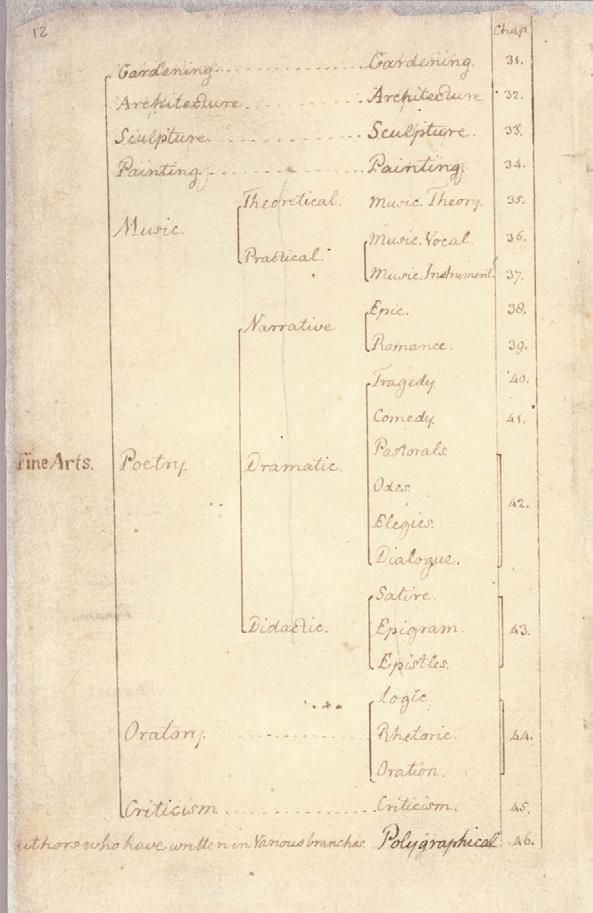


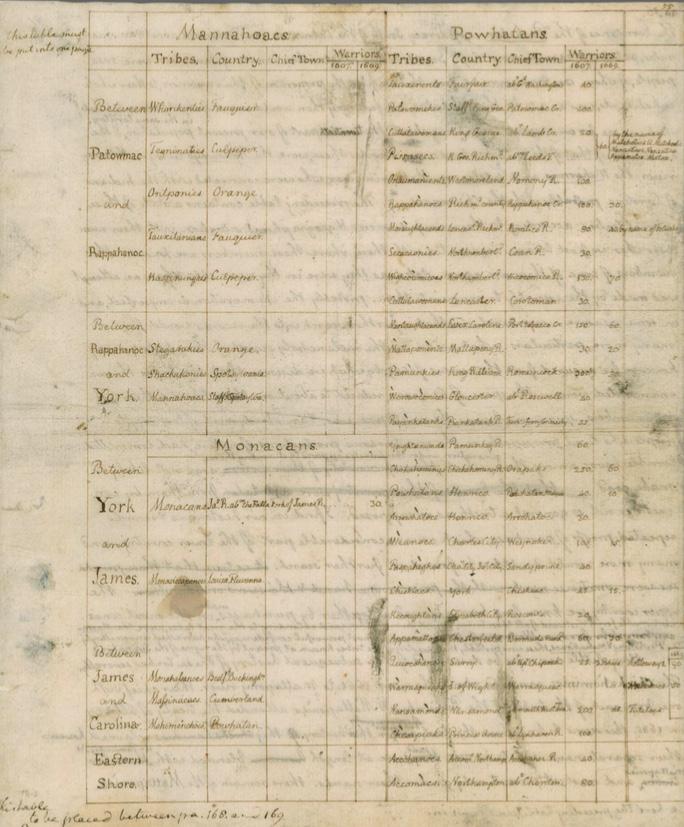
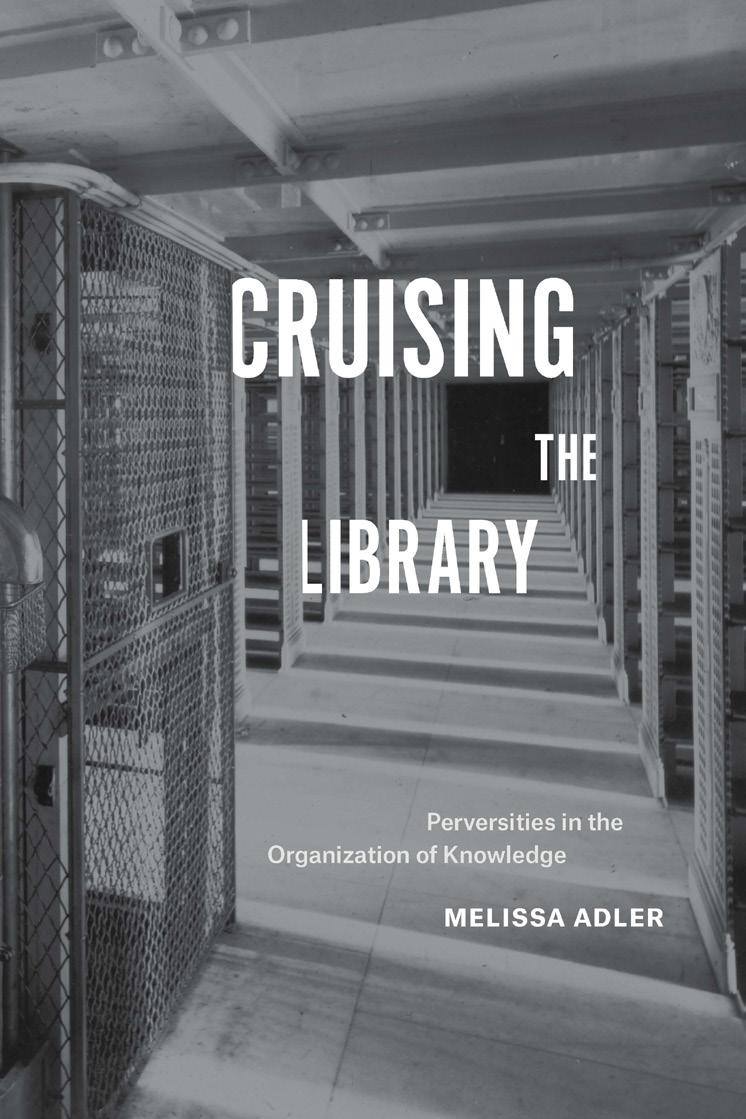
MELISSA ADLER
“Tailor-made for the critlib movement, this demonstration that the Library of Congress is not a neutral space begs one critical question: where should it be shelved?”—Kirkus Reviews
“. . . Cruising the Library contains much of interest: it is an invigorating and thought-provoking rallying cry for fresh discussion about the organization of knowledge.”—Times Literary Supplement
“An inquiry into how classifying protocols operate as control mechanisms, Cruising the Library is a hands-on guide for the queer academic.”—The Bay Area Reporter Online

MARK D. JORDAN
176 pages, 5 x 8
9781531504540, Paperback, $19.95 (AC), £15.99
[Hardback available: 9781531504533]
eBook Available DECEMBER
LGBTQ Studies | Literary Studies | Religion
ACADEMIC TRADE
“. . . [P]rofoundly insightful and beautifully written. Highly recommended.”—Choice Reviews
“A lively and incisive historicized linguistic study of how the habit of naming ourselves after sex/gender has been built up and cemented, Queer Callings is an expertly alert and finely textured investigation of the archives of queer speech.”—Richard Rambuss, author of Closet Devotions and Kubrick’s Men
“Capacious in its literary engagements and in its persistence in linking philosophical and literary interventions with time-honored theological perspectives, Queer Callings draws together in a new pattern the threads of Christian theological history and Foucauldian genealogical analysis that have made Mark Jordan a luminary.”—Melissa M. Wilcox, author of Queer Nuns: Religion, Activism, and Serious Parody
“In this profound and profoundly intelligent book, Mark D. Jordan probes the protocols as well as the frequently violent debates that surround queer names and naming: the names we call ourselves, the names we are called by others. Along the way, Queer Callings not only defamiliarizes current ways of naming sexual and gender identities; it also loosens the grip of the very imperative to catalogue and name our identities in the first place, indeed, as our first place if we are to be at all. Jordan does so in order to open up wider and wilder and more lushly habitable ways of being and becoming and desiring. Lyrically argued and gloriously felt, Queer Callings is a gift of possibility.”—Ann Pellegrini, coauthor of Gender Without Identity
FINALIST, THE RANDY SHILTS AWARD FOR GAY NONFICTION, THE PUBLISHING TRIANGLE AWARDS
A passionate exhortation to expand the ways we talk about human sex, sexuality, and gender
MARK D. JORDAN is R. R. Niebuhr Research Professor at Harvard Divinity School. His recent books include Recruiting Young Love: How Christians Talk about Homosexuality and Convulsing Bodies: Religion and Resistance in Foucault. He is also author of the groundbreaking work The Invention of Sodomy in Christian Theology.

224 pages, 5 1/2 x 8 1/2
9781531511876, Paperback, $27.95 (AC), £22.99
9781531511869, Hardback, $95.00 (SDT), £79.00 Simultaneous electronic edition available NOVEMBER
Philosophy & Theory | Psychoanalysis | Political Science
“Chaudhary’s theoretical dexterity and brilliant mapping of the political symptomology of cultural phenomena together render Paranoid Publics indispensable for grasping the contemporary political landscape. Paranoia, he reminds us, is a feeling, one that splinters into disavowal, anxiety, projection, and pleasure, organizing ‘truths’—from anti-vaxxing to Havana syndrome—that we dismiss at our peril. A must read!”—Wendy Brown, Institute for Advanced Study
“If there’s anything the US presidential election of 2024 made clear, it’s the urgency of thinking politics and psychoanalysis together. Paranoid Publics captures, with the precision of an x-ray, the metastases of truth in our moment, pinpointing the psychic pressures and unacknowledged libidinal pulsions that readings of the social body ignore to their detriment—and to ours.”—Lee Edelman, author of Bad Education
“By boldly forgoing the usual discrepancy between a subjective psychoanalytic category and collective life as such, and deftly traversing critical theory debates, mass culture practices, social media entrepreneurships, and algorithmic governance mechanisms alike, Chaudhary delivers an incisive dissection of the heterogeneous appeals to ‘truth’ that bind knowing, belief, and political power play today. This book is a work of insight, imagination, and intellectual sophistication.”—Rey Chow, author of A Face Drawn in Sand: Humanistic Inquiry and Foucault in the Present
Facts and established truths are regularly denied in contemporary life. This situation has brought paranoid politics into the mainstream, from conspiracy theories like QAnon, to sex panics and assaults on public health measures, to election denialism and the rise of vigilante militias. Paranoid Publics analyzes these phenomena as psychosocial realities enmeshed with emerging ways of determining truth.
Today’s paranoia cannot simply be blamed on the rise of social media or the recent surge of populist anger. Rather, as Chaudhary shows, both are fueled by preexisting psychosocial processes. Applying psychodynamics to analyze truth and politics, Paranoid Publics foregrounds unconscious demands, wishes, and compulsions. Against the hope that progressive economic policies might dispel widespread disorientation and disillusionment, Chaudhary reveals how psychic realities mark politics as deeply as do self-interest and class dynamics.
Chaudhary takes up and reinvents psychoanalytic concepts to analyze how, for example, the personal liberty exercised through vaccine exemptions is paradoxically grounded in submission to the authority of the family and the state. Such politically consequential attitudes concerning truth emerge from a social order that they proceed to challenge. Making a case for psychosocial understandings of our current historical juncture, Paranoid Publics radically expands our notion of the political.
ZAHID R. CHAUDHARY is Associate Professor of English at Princeton University. He is the author of Afterimage of Empire: Photography in Nineteenth-Century India.
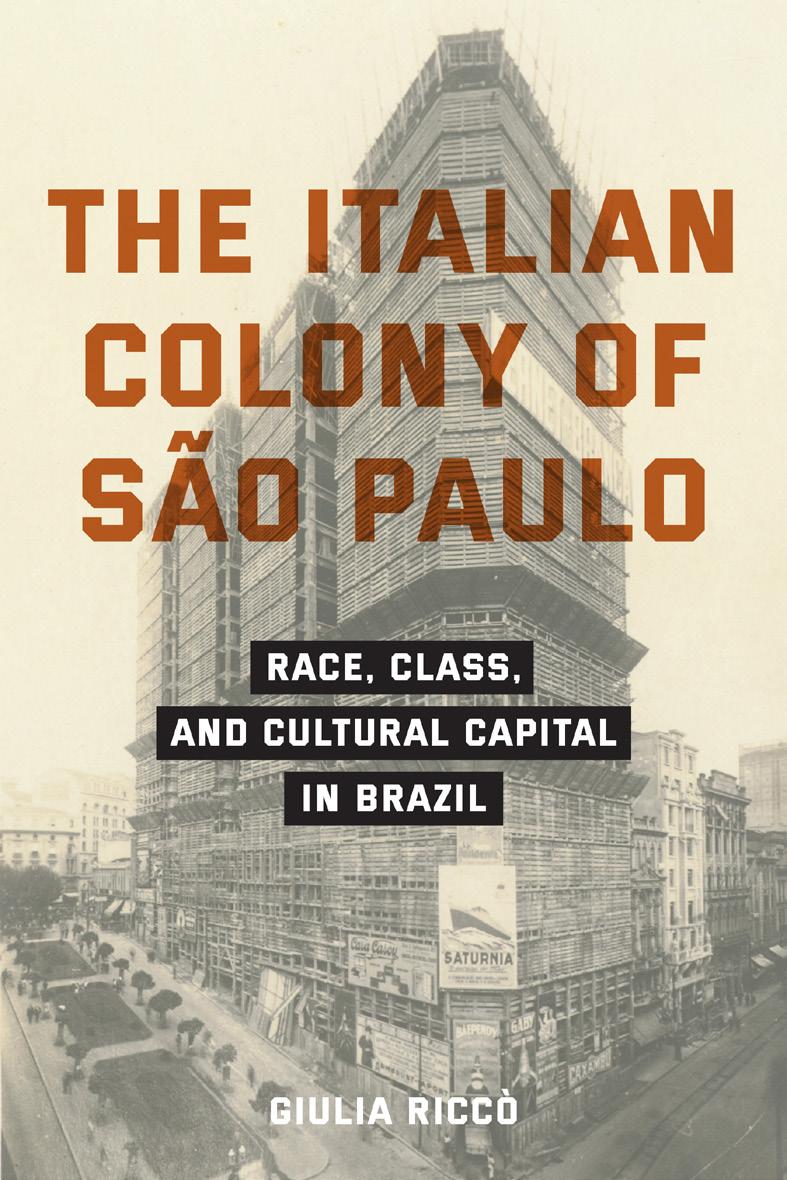
Race, Class, and Cultural Capital in Brazil
240 pages
9781531512255, Paperback, $35.00 (SDT), £27.99
9781531512248, Hardback, $105.00 (SDT), £87.00
Simultaneous electronic edition available
Critical Studies in Italian Migrations
SEPTEMBER
Italian American Studies | Race & Ethnic Studies | History
“The Italian Colony of São Paolo is a groundbreaking study of Italian immigration to Brazil and the formation of Italian ethnic identity within a multiracial society marked by a large Black population and a legacy of plantation slavery. Giulia Riccò draws on a rich array of voices—including elite Italian travelers, literary modernists, workingclass Black Brazilians living alongside Italians, middle-class Italo-Brazilians with fascist leanings, and labor-oriented working-class Italo-Brazilians. She shows that Italians in Brazil succeeded in positioning themselves as exemplars of Mediterranean whiteness, in contrast to Italians in the United States, who often faced stigmatization due to their imagined closeness to Blackness.” —Christopher Dunn, Tulane University, author of Contracultura: Alternative Arts and Social Transformation in Authoritarian Brazil
“The Italian Colony of São Paulo offers illuminating perspectives on the Italian presence in Brazil, on the wider history of Italian migration, and on what that history can tell us about racial politics in a variety of locations, including Italy and the United States. With originality and analytical depth, the author delivers a powerful critique of ethnicity and its politics, significantly enriching and repositioning the growing body of work on Italians in the Americas.”—Loredana Polezzi, Stony Brook University
Introduces a way to study migration that privileges literary analysis over and against sociological data and insists on the importance of culture in the production of political identities
This book argues that Italians first became racialized as white in São Paulo, Brazil, at the turn of the twentieth century. Whereas Italians in the United States struggled with xenophobia and were often not fully acknowledged as white, in São Paulo, due to a series of social, economic, and cultural factors, Italians became closely associated with ideas of whiteness, modernization, and civilization. This book brings to light how the overlooked experiences of Italians in Brazil complicate conventional narratives about the racial ambiguity and oppression of Italians in the Americas, on the one hand, and the conflation of Italians with cultural and economic backwardness in Europe, on the other.
In the book, close readings of a wide array of texts—the travel writings of Gina Lombroso Ferrero, the short stories of Antônio de Alcântara Machado, the columns of José Correia Leite, the political essays of Miguel Reale, and the memoirs of Zélia Gattai—trace a “New World Italian discourse,” or the overlapping narratives about Italian racial, economic, and cultural superiority that constructed and maintained Italians’ status as a model minority in São Paulo. These discursive practices represent essential antecedents to the racial nationalism that reared its ugly head in Italy throughout the twentieth century and remain central to contemporary debates about national identity in the Italian public sphere.
The Italian Colony of São Paulo: Race, Class, and Cultural Capital in Brazil is available from the publisher on an open-access basis.
GIULIA RICCÒ is an assistant professor of Italian at the University of Michigan, Ann Arbor.
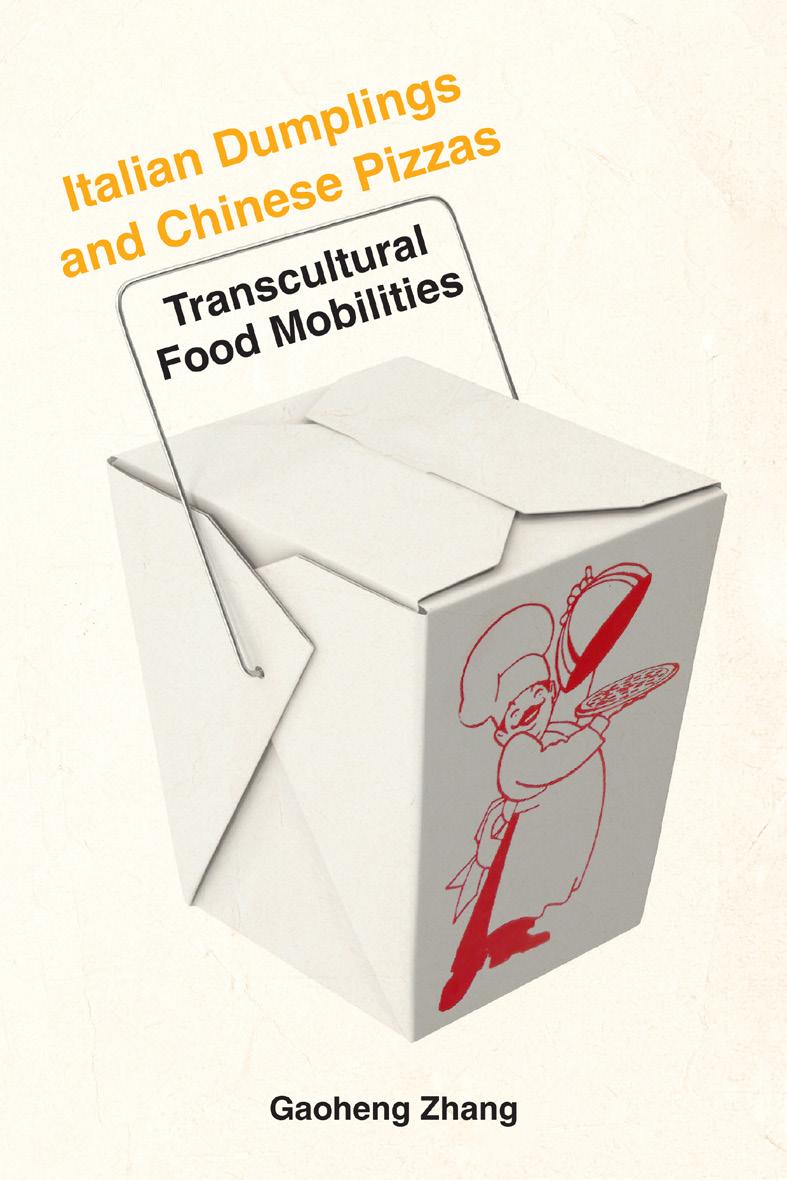
Transcultural Food Mobilities
GAOHENG ZHANG
240 pages
9781531512170, Paperback, $35.00 (SDT), £27.99
9781531512163, Hardback, $105.00 (SDT), £87.00
Simultaneous electronic edition available Critical Studies in Italian Migrations
OCTOBER
Italian American Studies | Immigration & Migration | Food Studies
“Food constitutes a great entry point to observe the relationship between the Chinese and Italian cultures, as it is central to both. Looking at hospitality, food production, tourism, and media within the broader context of globalization, Gaoheng Zhang provides an original and stimulating analysis of the mobilities and the migration flows that have connected the two countries in the past few decades.”—Fabio Parasecoli, Professor of Food Studies, New York University
Designs a novel analytical framework to approach transcultural food mobilities, a culinary phenomenon that has been with us for decades as a result of colonialism and globalization
Why is it surprising for some of us to read the pairing of “Chinese” with “pizzas” and “Italian” with “dumplings,” such as proposed in the book’s title? After all, in some regions of the two countries, Italians eat frequently dumplings, and Chinese frequently make baked, steamed, or fried flatbread with toppings or fillings. Furthermore, when dumplings are made in Italy by Chinese migrants or Chinese Italians, or when pizzas are made in China by Italian migrants, Chinese Italians, or Chinese without apparent ties with Italy, are these culinary products Chinese, Italian, Chinese-Italian, or something else? Why do we need to care for such labeling dilemmas?
This book shows how China-Italy food mobilities relayed in popular culture helped forge Chinese and Italians’ socioeconomic identities in recent decades by fundamentally shaping contemporary Chinese and Italian consumer cultures. This book addresses China-Italy food cultures against the backdrops of two epoch-making socioeconomic processes. During the 1980s, Chinese cuisine became the first non-European food widely available in Italy, thanks to the widespread presence of Chinese eateries. Only American fast food, which established itself in Italy around the same time, enjoyed comparable popularity as a destination for Italian culinary tourism. Meanwhile, in the early 1990s, together with American hamburgers and fried chicken, the American food chain Pizza Hut’s pizzas and spaghetti were the first non-Asian foods that post-Mao Chinese customers recognized as “Western.” The book proposes a critical framework that analyzes transcultural food mobilities by seriously assessing the confluence of diverse mobilities and their impact on food cultures. Ultimately, the study shows that a sophisticated interpretation of transcultural food mobilities can help address alterity and build understanding in a world of increasing political and cultural polarization.
GAOHENG ZHANG is an associate professor of Italian studies at the University of British Columbia. His recent books include Fashion Communications between Italy and China: Unfolding a Sartorial Relationship, Migration and the Media: Debating Chinese Migration to Italy, 1992–2012, and a co-edited volume, Cultural Mobilities Between China and Italy.

JADWIGA BISKUPSKA AND SARA B. CASTRO, EDITORS FOREWORD BY
ROBERT CITINO
352 pages, 3 b/w illustrations
9781531512026, Paperback, $35.00 (SDT), £27.99
9781531512019, Hardback, $105.00 (SDT), £87.00
Simultaneous electronic edition available
World War II: The Global, Human, and Ethical Dimension
SEPTEMBER
World War II | History | Politics
“The editors are to be congratulated for producing an excellent book which sets wideranging and ambitious intellectual goals and assuredly fulfills them. It will be of great value and interest to scholars of the Second World War and twentieth-century global history.”—
Andrew Stewart
, Visiting Professor, King’s College London
Brings together geographies and methodologies often kept apart by the difficulties of researching such a broad-ranging topic as the war
Shots in the Dark offers cutting-edge scholarship across different subfields in World War II history, revealing new insights into how this crucial conflict was planned, experienced, and fought. Twelve chapters demonstrate the broad scope of wartime innovation and how the war functioned as a global turning point, driving change at all levels of human society, from government institutions to individual identities.
Contributors collaborated in a vibrant workshops series sponsored by the North American branch of the Second World War Research Group (SWWRGNA), an organization that emerged to nurture scholarship on the global war and unite scholars fragmented in narrower regional and methodological “stovepipes” to consider the war as a whole. The SWWRGNA and this volume showcase the work of diverse historians across subfields—operational, cultural, gender, social, intelligence, and diplomatic history. This approach exposes the Second World War as a catalyst for overlapping global changes that revolutionized the world after 1945. These scholars reveal continuities and parallels in wartime experiences that would remain invisible in narrowly focused projects.
The volume establishes three frameworks for understanding and interpreting changes the war provoked: 1) institutional adaptation, 2) “totalization,” or the militarization of civilians, and 3) cultural transformation. Each of the three frameworks is explored from four vantage points. Geographies are deliberately contrasted within each framework to examine the broad scope of that level of war-driven change.
JADWIGA BISKUPSKA is an associate professor of military history at Sam Houston State University and co-director of the Second World War Research Group North America. She is the author of Survivors: Warsaw under Nazi Occupation, which won the 2022 Heldt Prize of the Association for Women in Slavic Studies.
SARA B. CASTRO is an associate professor of history at the US Air Force Academy in Colorado Springs, CO, where she teaches global and East Asian history. She is the former president of the Society of Intelligence Historians (SIH) and the author of Mission to Mao: US Intelligence and the Chinese Communists in World War II
CONTRIBUTORS: Jadwiga Biskupska, Sara B. Castro, Robert Citino, Claire Cookson-Hills, Elena Friot, Brian Masaru Hayashi, Derek R. Mallett, Erina Megowan, Adrian O’Sullivan, Katrin Paehler, Kevin P. Riehle, Jeff Rutherford, Victoria Sotvedt, and Cameron Zinsou.

“We must remember, salvage, refuse, remake. Tomba shows us how. He gives us a past— many pasts—and with them, many far better futures. This work salvages diverse legacies: from workers, from the indigenous, from rebellious peasants, from the poor of every continent, from religious and secular, democrat, communist, and anarchist. As he guides us through these lost pasts, we can see decolonization overcoming dispossession and older, more capacious ideas of property replacing power and mindless oligarchy. He points us toward earlier work in building worlds where people rule and money is silent. We can have these worlds.”—Anne Norton, University of Pennsylvania
“Revolution and Restoration is a work of stunning sophistication and subtlety. It makes methodological, conceptual, and philosophical contributions of the first order that are richly illustrated by empirical cases. The book will be read by philosophers, political theorists, historians, and anthropologists, and broadly by intellectuals.”—Uday Mehta, CUNY Graduate Center
Shows how new concepts that emerge from political conflicts can remake democratic systems in crisis
At a time when terms like restoration, religion, authority, obligations, and natural law—once the rallying cries of the most emancipatory movements—are increasingly coopted by conservative forces, Revolution and Restoration offers a thought-provoking account of how “outdated” concepts can ignite radical energy and collective action. Through both historical and contemporary examples, the book elaborates the concrete possibilities for reimagining politics and society that emerge out of the clash between incompatible legal and economic structures.
At its core, Tomba’s book confronts the very foundations of the modern state and its three pillars: property, democracy, and citizenship. These pillars, long celebrated in the Western canon, are nevertheless mechanisms of exclusion: property is the denial of communal access, representative democracy the marginalization of the demos from decision-making, and citizenship the exclusion of the foreigner. Revolution and Restoration critiques these pillars to show how new concepts and political possibilities that emerge from political and social conflicts hold the potential to transcend and remake democracies in crisis.
Revolution and Restoration: The Politics of Anachronism is available from Knowledge Unlatched on an open-access basis.
MASSIMILIANO TOMBA is professor in the Department of History of Consciousness at the University of California, Santa Cruz. He is the author of Insurgent Universality: An Alternative Legacy of Modernity, Attraverso la piccolo porta: Quattro studi su Walter Benjamin, Marx’s Temporalities, La vera politica: Kant e Benjamin), and Krise und Kritik bei Bruno Bauer. Kategorien des Politischen im nachhegelschen Denken.
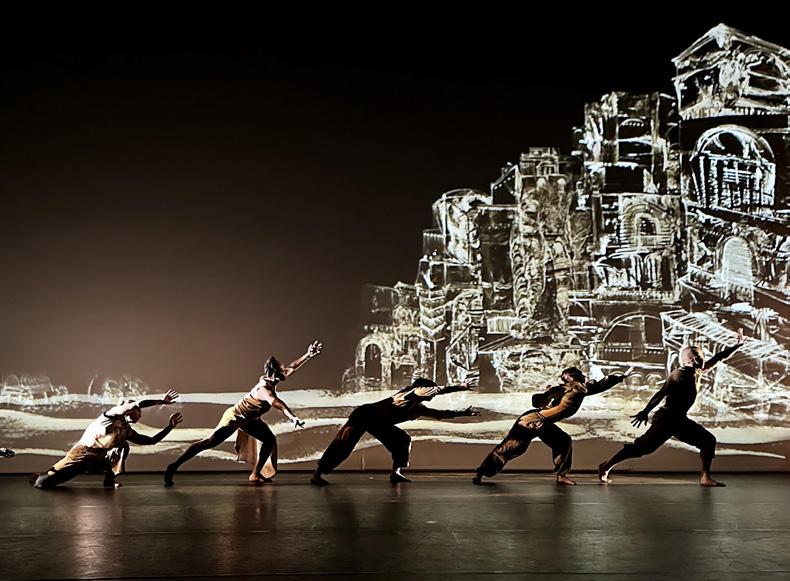
ROBERT A. RUSHING
ROBERT A. RUSHING
256 pages, 18 b/w illustrations
9781531512699, Paperback, $30.00 (SDT), £23.99 9781531512682, Hardback, $105.00 (SDT), £87.00
Simultaneous electronic edition available JANUARY
Introduces a new way of understanding influence, reception, and adaptation via the work of Italy’s most famous modern writer
In Transmedial Resonance, Robert A. Rushing addresses the remarkable and ongoing responses to the imagination of Italo Calvino, Italy’s most important modern writer. Since his death in 1985, Calvino’s writing has served as a constant figure of inspiration for other artists, and tellingly, that inspiration has been “more outside than inside.” Although Calvino’s reputation as a writer is immense, his influence has in fact been vastly larger outside of literature, including in architecture, city planning, community organizing, design, visual arts, video games, the performing arts, and much more. That influence is not only transmedial. It has also been “more outside than inside” across national boundaries, particularly in the English-speaking world.
Rushing thinks about Calvino’s influence through the metaphor of resonance. When something resonates, he argues, it may be “inspired” to do so, but it does so in its own voice, singing its own song. In fact, resonance offers an entirely different way of thinking about influence and artistic reception, stressing the energy of the inspiration rather than fidelity to the original. In keeping with that underlying sonic metaphor, Rushing looks at specifically acoustic responses to Calvino. They include Chris Cerrone’s Pulitzer-nominated “opera in headphones” based on Invisible Cities, Lisa Mezzacappa’s Cosmicomics jazz suite, and Ashwini Ramaswamy’s multimedia dance performance of Invisible Cities, which combines traditional South Indian Bharatanatyam, urban breaking, and African American modern dance. These works, Rushing shows, tell the story of a very different Calvino, one who is (in Mezzacappa’s words) “nerdy and neurotic,” playfully perverse, and profoundly political.
Bringing together sound studies with literary studies and cultural reception, Transmedial Resonance argues for a radical re-imagination of how we think about artistic and cultural influence, calling for a completely new understanding of this major figure of modern Italian and world literature.
ROBERT A. RUSHING is Professor of European Languages and Transcultural Studies, as well as Film, Television and Digital Media, at UCLA. He is the author of Resisting Arrest: Detective Fiction and Popular Culture and Descended from Hercules: Biopolitics and the Muscled Male Body on Screen, winner of the 2016 AAIS (American Association for Italian Studies) Film/Media book prize.
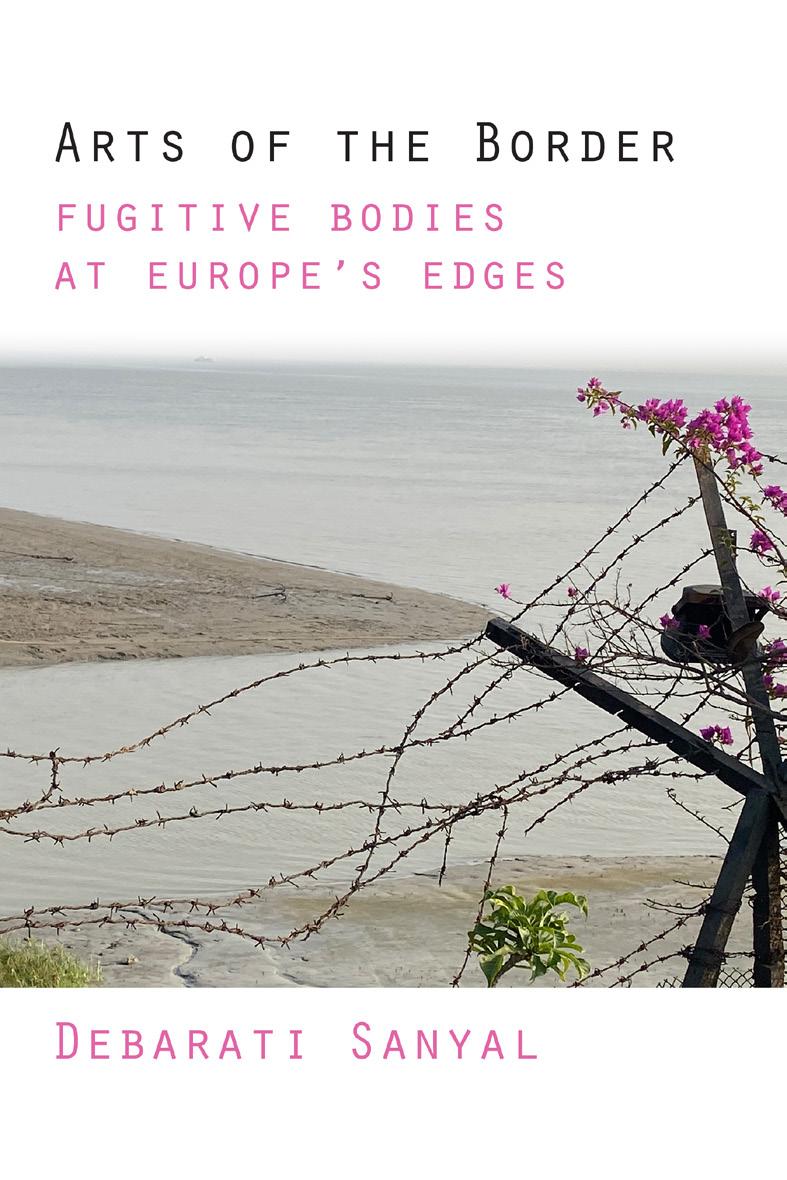
256 pages, 48 color illustrations
9781531512132, Paperback, $32.00 (SDT), £25.99
9781531512125, Hardback, $110.00 (SDT), £91.00 Simultaneous electronic edition available DECEMBER
Immigration & Migration | Literary Studies | Art & Visual Culture
“In this deeply moving and ever more urgent exploration of the arts of the border, written with brilliant clarity and heart, Debarati Sanyal evokes the violent realities of migration alongside the creative defiance of those who refuse to be erased.”—Marianne Hirsch, author of The Generation of Postmemory: Literature and Visual Culture After the Holocaust
“While taking seriously the violence of borders, Sanyal offers a refreshing, inspiring, and nuanced account of the creative, imaginative, and rebellious acts at and around the EU border regime. She traces the often-fugitive arts of the border—how people cross, and how these crossings are both represented and prefigured by experimental art. A beautiful, compelling book about the struggle for alternative worlds, more just worlds.”—Miriam Ticktin, author of Against Innocence: Undoing and Remaking the World
Examining Europe’s borders and their artistic representations as an archive both of state violence and of refusal, fugitivity, and imagination
Arts of the Border investigates the consequences of unfolding catastrophes across the world and the displacement they continue to produce. Through recent narratives and media representations of the refugee “crisis” at Europe’s edges, it tells a new story about those on the move, the technologies unleashed on them at borders, the racialized and colonial histories that inform these technologies, and the artistry with which migrants and allies bear witness to displacement. The book reorients us toward the creativity and movement of migrants themselves—their “arts of the border”—as well as toward the political force of the arts that represent them, whether in literature, documentary film, or art installations.
Sanyal proposes kino-aesthetics as a framework for capture and fugitivity at borders. From kino—to set in motion—and aesthetics—relating to sensory perception—kino-aesthetics conveys the force of bodies in motion and the image in its circulation. The book examines the simultaneity of capture and escape at thresholds of illegalization, from airport detention zones to Calais’s “jungle” and the Euro-African border at Ceuta and Melilla. What emerges throughout these case studies is a portrayal of border violence in its racial and colonial forms as well as an archive of refusal, fugitivity, and un-bordered imagining.
DEBARATI SANYAL is Professor of French and Zaffaroni Family Chair of Undergraduate Education at the University of California, Berkeley, where she directs the Center for Interdisciplinary Critical Inquiry. She is the author of Memory and Complicity: Migrations of Holocaust Remembrance (Fordham) and The Violence of Modernity: Baudelaire, Irony, and the Politics of Form.
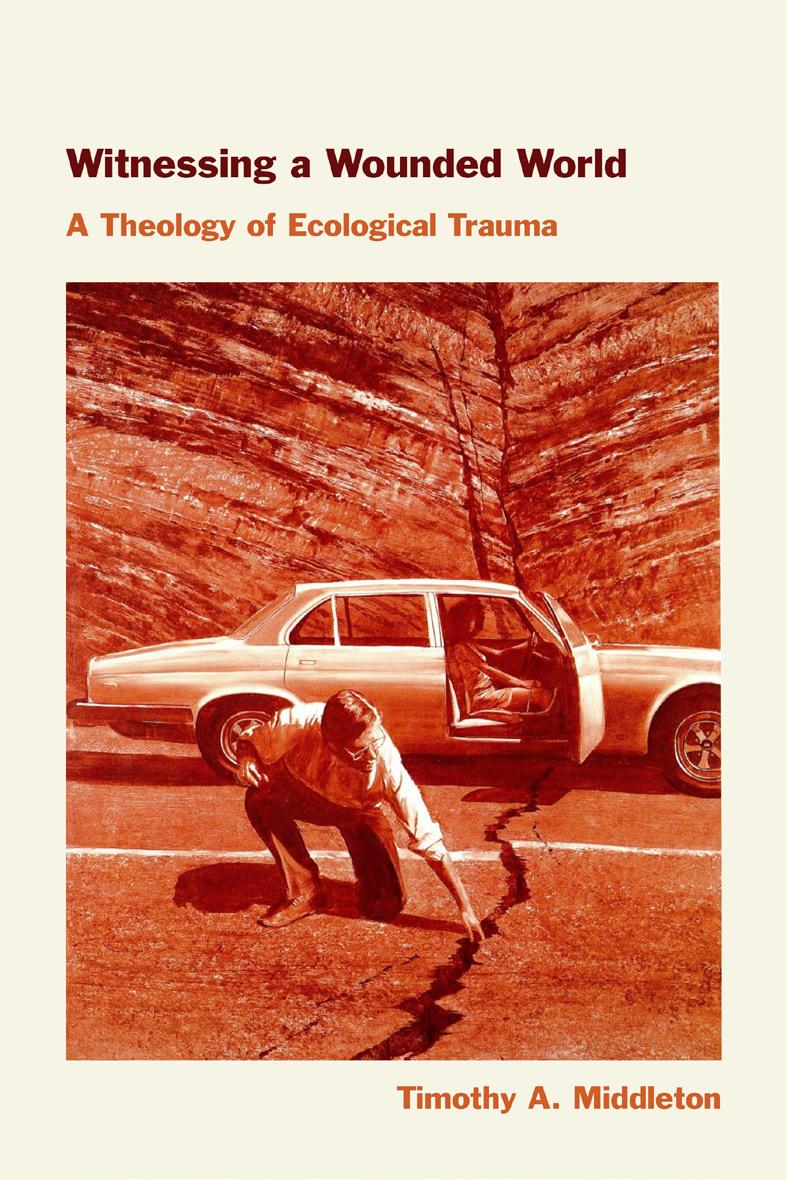
TIMOTHY A. MIDDLETON
272 pages, 1 b/w illustration
9781531512774, Paperback, $30.00 (SDT), £23.99 9781531512767, Hardback, $105.00 (SDT), £87.00
Simultaneous electronic edition available NOVEMBER
Theology | Religion | Environment
“In Witnessing a Wounded World, Tim Middleton integrates new methodologies–deep incarnation, trauma studies, ecotheology, Christian animism, and Gaia theory–that renders his book both classically sonorous and bracingly contemporary. His bold aim is to better understand, and hopefully ameliorate, the traumatic ruptures that now define our planetary ecosystem in an advancing state of emergency. Middleton writes that as Jesus suffered at the hands of his executioners, so also is the Earth undergoing its own daily passion at the hands of its abusers. Golgotha is everywhere. But bearing witness to Christ’s and the natural world’s permanently wounded flesh is not reason for despair but the ground of radical hope in solidarity with the suffering of others, human and more-than-human. Carefully researched and superbly written, Middleton compellingly advances the present theological discussion about how to think about and live faithfully on a broken and vulnerable planet.”—Mark I. Wallace, James Hormel Professor of Social Justice, Swarthmore College
A crucial intervention at the intersection of ecotheology and trauma theology
We are in the midst of a global ecological crisis. At times, the scale of the suffering involved can be hard to fully comprehend. The whole planetary ecosystem feels out of kilter. Meanwhile, trauma theorists, and society at large, have become increasingly aware of the incidence of trauma in a growing variety of contexts. In Witnessing a Wounded World, Timothy Middleton asks what might be gained by viewing ecological suffering through the lens of trauma.
By bringing concepts and methodologies from trauma theology to bear on questions that arise within ecotheology, Middleton engages a series of pressing questions. What kind of traumas are being precipitated by anthropogenic climate change and accelerating biodiversity loss? What would it mean to envisage the Earth itself as traumatized? And how might a Christian theologian respond?
From large-scale deforestation and opencast mining to rampaging wildfires and fracturing ice sheets, the Earth itself is subject to intense devastation. Witnessing a Wounded World analyzes such phenomena in terms of three traumatic ruptures—to communication, to flesh, and to time. Drawing on practices of witnessing and the insights of deep incarnation Christologies, Middleton proceeds to offer a theological account of this ecological trauma. For Christians, a model of Christic witnessing can bring the Earth’s suffering to light.
As the first sustained treatment of ecological trauma to address the trauma of the Earth itself, Witnessing a Wounded World makes a profound contribution to discussions of suffering, faith, and the present ecological emergency.
TIMOTHY A. MIDDLETON is a Tutorial Fellow in Theology at Regent’s Park College, University of Oxford. His research focuses on the intersections of theology and religion with science, nature, and the environment.
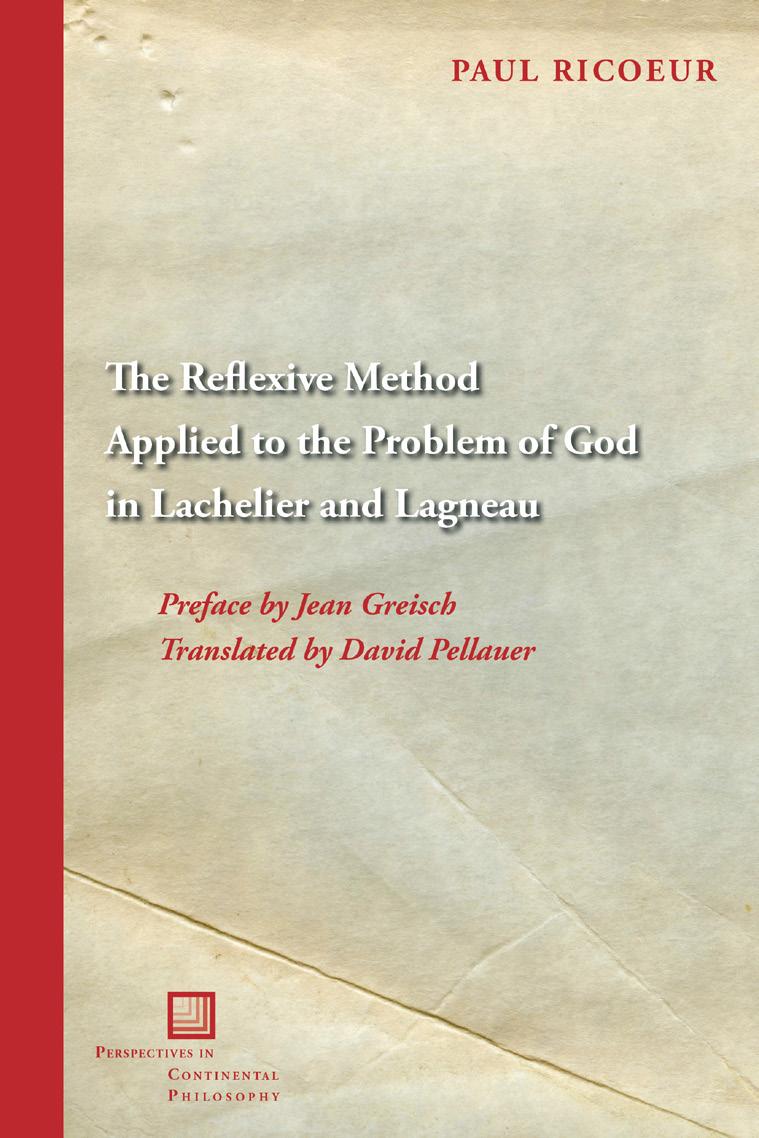
PAUL RICOEUR
PREFACE BY
JEAN GREISCH
TRANSLATED BY
DAVID PELLAUER
“Like an acorn, Ricoeur’s master’s thesis anticipates ideas that will mature several decades later in his philosophy of the will. Through a careful comparison of two lesserknown 19th-century French spiritualists—Lagneau and Lachelier—Ricoeur explores the question of the relation between reason and faith, arriving at a conclusion that becomes a mantra for the rest of his career: ‘immanence always includes some transcendence.’ This book, superbly translated by David Pellauer, brings a fresh perspective that remaps our understanding of the entire trajectory of Ricoeur’s thought.”—Scott Davidson, University of Massachusetts Amherst, author of Pathos and Praxis: An Integrated Phenomenology of Life
An engaging and thought-provoking translation of Paul Ricoeur’s earliest work that is essential for understanding his philosophical development
The Reflexive Method Applied to the Problem of God in Lachelier and Lagneau, now held in the Ricoeur Archive in Paris, was a qualifying thesis Ricoeur wrote at the age of twenty-one when he was just beginning his advanced university studies. In it he examines the use of the reflexive method by two important French philosophers from the nineteenth century, Jules Lachelier and Jules Lagneau. They both sought to develop an “integral metaphysics” that recognizes God as the principle underlying pure, impersonal thought and practical reason, and that requires a kind of philosophical faith. In his conclusion, Ricoeur criticizes their doctrine of God and philosophy of immanence for not being able to deal with the question of transcendence and for its failure to address concrete human existence, yet he concedes that it may be seen as a first truce in “the internecine war” between faith and reason.
Despite this criticism, Ricoeur later maintained that his own philosophy does stand “in the line of a reflexive philosophy” while remaining “within the sphere of Husserlian phenomenology” and striving to be “a hermeneutical variation of this phenomenology.” He also continued to address the question of faith and reason in works like Figuring the Sacred and (with André LaCocque) Thinking Biblically, as well as in many other essays.
The Reflexive Method Applied to the Problem of God in Lachelier and Lagneau is necessary reading for anyone doing serious work on and with Ricoeur’s philosophy.
PAUL RICOEUR is one of the most important twentieth-century French philosophers, who taught both in France and in the United States. He was the author of many books, including The Voluntary and the Involuntary, Fallible Man, The Symbolism of Evil, Freud and Philosophy, The Rule of Metaphor, Time and Narrative, Oneself as Another, Memory History, Forgetting, and The Course of Recognition, as well as many essays, including ones on the philosophy of religion.
DAVID PELLAUER is professor emeritus of philosophy at DePaul University. He is the author of Paul Ricoeur: A Guide for the Perplexed and other essays on the work of Paul Ricoeur. He has also translated or co-translated many books and essays by Paul Ricoeur. He currently serves as a corresponding member on the Comité scientifique of the Ricoeur Archive in Paris.

GEOFFREY HARTMAN
EDITED BY KEVIS GOODMAN AND BRIAN MCGRATH
“In this beautifully composed volume, Geoffrey Hartman explores the important place of ‘literary knowledge’ in the aftermath of the Holocaust, insisting on the non-redemptive hope borne by an imaginative language that watches over ‘absent meaning.’ Framed by an excellent introduction and punctuated by an illuminating interview, Hartman’s irreplaceable voice, returning posthumously to us at our own moment of political and ethical crisis, calls upon us to refuse the emptying out of language and thought typical of totalitarian movements and to find the future-oriented words that, like stars, can still have ‘an independent existence, that hang glittering in the firmament of discourse.’”—Cathy Caruth, Cornell University
A final work by one of our major critics, contemplating how acts of distant witnessing can continue in future generations
Holocaust and Hope shows one of our preeminent critics grappling with a subject to which he had returned for decades: literary, cultural, political, and historiographical implications of the Holocaust and its aftermath in Europe and America. In his last planned book, Geoffrey Hartman confronts contradictions that pose a challenge for our present and future. The passing of Holocaust survivors and their immediate families makes continued acts of witnessing more necessary, even as distance in time makes the identities and acts of future witnessing more complicated. In addition, the particular kinds of amplification that we may be accustomed to or expect from our contemporary media environment can call forth not an intensity of response but rather an inertia, an “unreality effect,” that can come unexpectedly from the heightening of the real, or the hyperreality of too much, too fast, too strong.
Holocaust and Hope takes seriously the difference between our coming after Auschwitz and our being past it. With characteristic intensity and humanity, Hartman’s essays explore the full complexity of how to transmit knowledge of the Holocaust to the future in ways that avoid simplification, the illusion of synthesis, or the aspiration to final closure, on the one hand, or compulsive repetition on the other. A significant part of the answer, for Hartman, requires special attention to the role of literary and audiovisual forms in promoting an active witnessing to extreme suffering that is relevant both for our time and the encroaching future.
GEOFFREY HARTMAN was Sterling Professor of English and Comparative Literature at Yale and Project Director of its Fortunoff Video Archive for Holocaust Testimonies. His many books include The Third Pillar: Essays in Judaic Studies, A Scholar’s Tale: Intellectual Journey of a Displaced Child of Europe (Fordham), The Geoffrey Hartman Reader (Fordham, winner, Truman Capote Prize for Literary Criticism), Scars of the Spirit: The Struggle Against Inauthenticity, The Fateful Question of Culture, The Longest Shadow: In the Aftermath of the Holocaust, and Criticism in the Wilderness: The Study of Literature Today.
KEVIS GOODMAN is Professor of English at the University of California, Berkeley.
BRIAN MCGRATH is Professor of English at Clemson University.
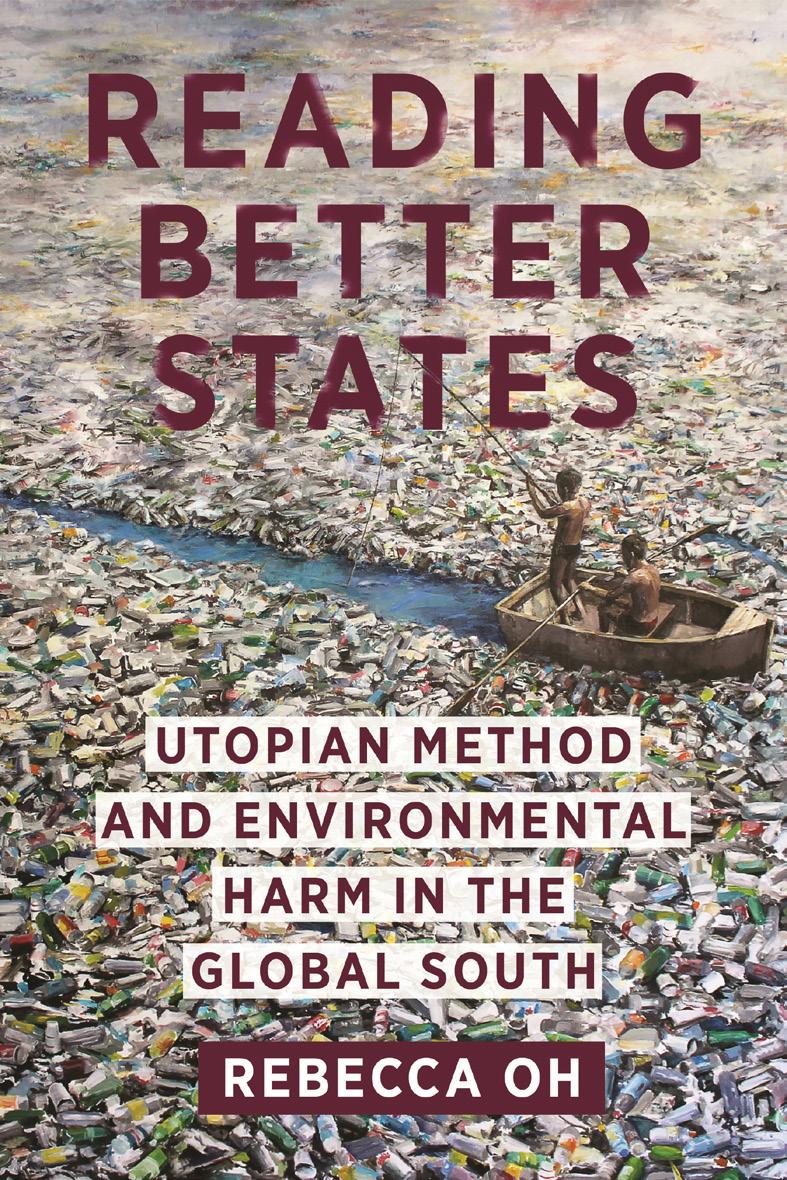
240 pages, 2 b/w illustrations
9781531512651, Paperback, $32.00 (SDT), £25.99 9781531512644, Hardback, $110.00 (SDT), £91.00
Simultaneous electronic edition available JANUARY
Literary Studies | Environment | Postcolonial Studies
“Reading Better States makes a compelling and important intervention into debates about the state and theorization of ‘political forms’ within literary and critical theory. The book is a fresh, original, and extremely welcome contribution to large-scale debates about the ‘aesthetics of politics’ that transcends narrower conversations within literary studies to impact other humanistic fields.”—Elizabeth Anker, Cornell University
A bold rethinking of the postcolonial state as both a source of violence and a site of everyday environmental hope
Reading Better States traces the persistence of desires for the postcolonial state in an era of environmental harms and climate catastrophe. As pollution, toxicity, drought, and flood increasingly threaten peoples and environments across the global South, postcolonial writers and ordinary citizens alike have not ceded their futures to the damaged presents they inhabit. Rather, Reading Better States shows how they turn to the state as a resource, imagining postcolonial states as powerful actors and calling upon them to intervene in processes like global capitalism and environmental racism, or to provide environmental protections and basic material necessities. These utopic possibilities are concrete rather than grand, limited and situated rather than totalizing. But they are no less utopic for being quotidian.
Reading Better States challenges the anti-statism prevalent in postcolonial studies and the environmental humanities, where states are predominantly defined through violence. Seeing postcolonial states beyond their bad surfaces requires a utopian method of reading, a way of seeing the state that reads its negativity against the grain for alternative possibilities. In Reading Better States, the state is Janus-faced. It is a bad actor, but it is also a site of collective hopes and concrete utopian visions. Using a wide-ranging archive of novels, films, court decisions, legislation, poetry, and testimony, Reading Better States reveals the importance of environmental concrete utopias in the present and reconsiders the postcolonial state for its interventionist possibilities as well as its violence. It does this through a utopian method that, like concrete utopias themselves, attends to negativity while stretching beyond it, seeking out visions of surplus that exceed, even if they cannot escape, the damage and disappointment of the present earth.
REBECCA OH is Assistant Professor of English at the University of Illinois Urbana-Champaign.

SPIRO JABBOUR
TRANSLATED, EDITED, AND INTRODUCED BY AARON FREDERICK ELDRIDGE
240 pages
9781531512736, Paperback, $35.00 (SDT), £27.99
9781531512729, Hardback, $125.00 (SDT), £104.00
Simultaneous electronic edition available
Christian Arabic Texts in Translation
DECEMBER
Theology | Anthropology | Psychoanalysis
Spiro Jabbour’s enigmatic exploration of the resonances between the Eastern Christian science of the soul and psychoanalysis, now in annotated English translation
Confession and Psychoanalysis, written by Spiro Jabbour—the prolific Syrian monastic, scholar, and translator—offers a speculative formulation of mystical ethics in the aftermath of the postcolonial loss of tradition. Jabbour reads Freud’s theories of the drive, transference, and the unconscious through Orthodox Christian writings on the purification of the heart and transfiguration the soul in the works of, among others, John Climacus, Maximos the Confessor, and Gregory Palamas. Composed in 1983 in Homs, Confession and Psychoanalysis is the written account of the spiritual guidance Jabbour offered to a seeker who queried him concerning the practice of confession. Taking the question of spiritual interlocution and the encounter between Freudian psychoanalysis and Orthodox asceticism as its launching point, Jabbour’s text moves across a staggering breadth of topics—Islamic Sufism, psychotherapy and psycho-somatic medicine, Arabic poetics and linguistics, hesychasm, counterfeit cultural life in the aftermath of war and dispossession, and the destructive ambivalence of civilization. As such, Confession and Psychoanalysis is a window into a dynamic Middle Eastern Christian tradition that speaks with and beyond a devastated present.
SPIRO JABBOUR was a scholar and hierodeacon in the Antiochian Orthodox Church. He was born in the Syrian town of Muzayraa in 1923 and died in 2018 at the Monastery of St. George, Deir al-Harf.
AARON F. ELDRIDGE is a Postdoctoral Fellow in the Department of Anthropology at the University of Toronto. His published work has appeared in Qui Parle, Diacritics, and Comparative Studies of South Asia, Africa and the Middle East.

“Life in the Cracks is one of the most exciting works on Haiti that I have seen in years. Motta’s focus on ordinary life, on law and life ‘in the cracks’ amid crisis, shines new light on Haiti during one of the country’s most difficult times. His use of ethnographic realism both grounds his theoretical arguments and makes important contributions to anthropological narrative and ethnographic methods.”—Greg Beckett, Western University
Life in the Cracks is a rich ethnographic portrait of law, violence, and resistance in Haiti. In a contemporary context marked by international interference, global capitalism, and state collapse, Haitians face complex challenges that are largely ignored and misunderstood. By examining the most unexpected inflections of ordinary life, Life in the Cracks offers a well-grounded account of people’s experience of law in their lives. The book describes what it means to endure violence partly engendered by the law, and thus to live up to one’s disappointment with the law itself.
By not taking for granted the places where the law appears, Life in the Cracks asks legal anthropology to confront questions beyond law-making and law-application, dispute resolution, and social order. In everyday life’s textures of messy subtleties and contradictory movements that are never reconciled, Life in the Cracks reconsiders the place of law in human affairs. Motta reimagines how people cope with their disillusionments by reinventing relationships with each other. What had appeared as questions of law and justice turn out to be questions of life and death. As life resists annihilation, Motta shows, many Haitians have found ways to breathe new life into the present and make the future worth fighting for.
MARCO MOTTA is SNF Assistant Professor of Anthropology at the Institute of Social Sciences, University of Lausanne. He is coeditor of Living with Concepts: Anthropology in the Grip of Reality (Fordham).

JOHN E. DRABINSKI
“A fascinating book that we need now more than ever. Brilliantly juxtaposing the literatures on deconstruction and social death, Drabinski poses clearly a central dilemma, though its solution is daunting: How can an ostensibly socially dead being (e.g., a Black person in a society founded on antiblack animus) ever become free and live free in a polity constructed to ensure that person’s unfreedom?”—Neil Roberts, Williams College
“At the Margins of Nihilism offers a wide-ranging series of reflections on issues of enduring importance and interest—colonialism, racism (specifically antiblackness), and social death—through an engagement with major figures in continental philosophy and Black studies. The book is the work of a mature thinker who moves between philosophical and literary traditions with ease and comfort.”—Lisa Guenther, Queen’s University
Documenting senses of life and practices of refusal hidden at the edges of Black literature and thought
The multi-century event of enslavement and colonialism changed the cultural and political imagination of the Atlantic world. We still live and work in the horizon of that event. It was an event that placed a violent Manichean structure of antiblackness at the foundation of our shared world. What kinds of life are possible in nihilistic, antiblack worlds of social death? Is it possible to imagine life outside the reach of those worlds? What decolonial methods help us understand that form of life in relation to expressive cultures of resistance and refusal?
At the Margins of Nihilism develops a theoretical frame through a comparative reading of Jacques Derrida and Orlando Patterson. Reading between deconstruction and social death, Drabinski describes a notion of life as interstitial, situated outside the play of life and death in systems of antiblackness. This notion of life has broad epistemological, existential, and ontological implications.
Drawing from a diverse set of sources including Zora Neale Hurston, Ralph Ellison, Gloria Anzaldúa, and others, At the Margins of Nihilism shows how the nihilisms of Richard Wright, Frantz Fanon, James Baldwin, and contemporary afropessimism operate as a closed system. Each system is opened by vernacular forms of life and practices of refusal. Those forms and practices speak to the power and significance of life that persists across centuries of antiblack culture, social life, and political hegemony.
JOHN E. DRABINSKI is Professor of African American Studies and English at the University of Maryland. He is author of So Unimaginable a Price: Baldwin and the Black Atlantic; Glissant and the Middle Passage: Philosophy, Beginning, Abyss; Theorizing Glissant: Sites and Citations; Levinas and the Postcolonial: Race, Nation, Other; Godard Between Identity and Difference; and Sensibility and Singularity: The Problem of Phenomenology in Levinas.
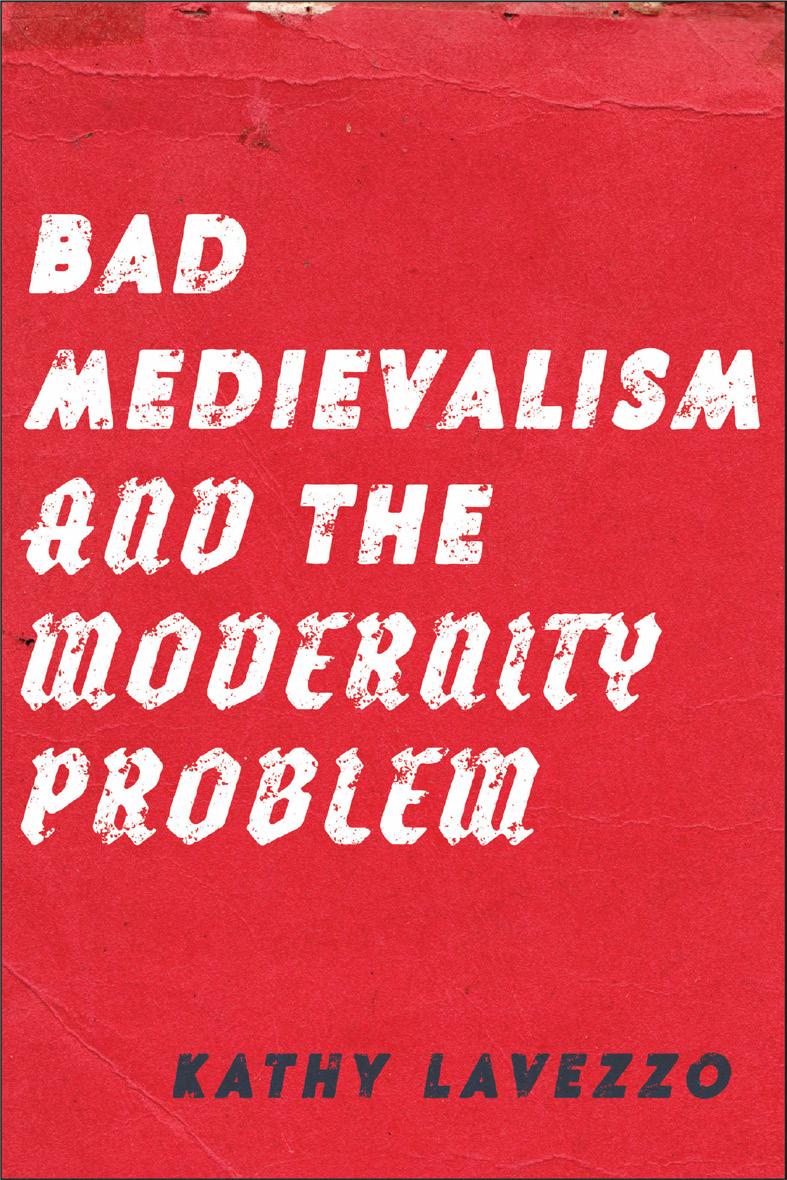
KATHY LAVEZZO
352 pages, 4 b/w illustrations 9781531512415, Paperback, $30.00 (SDT), £23.99 9781531512408, Hardback, $105.00 (SDT), £87.00 Simultaneous electronic edition available October
Medieval Studies | Race & Ethnic Studies | Literary Studies
“An interesting and important contribution to the field of medieval studies, as well as the intersections of that field with critical theory, including Critical Race Studies. It will appeal to both specialists in the field and a wider public with an interest in the histories of race and racialization.”—Suzanne Conklin Akbari, Institute for Advanced Study
“At the heart of Bad Medievalism are the ghosts of Stuart Hall and J. R. R. Tolkien, whose encounter in 1950s England led to the exclusion of a brilliant Black man from the study of English medieval literature and created the conditions for his subsequent cofounding of the influential Birmingham school of cultural studies. Lavezzo unpacks this critical encounter with acuity and sensitivity, so that it becomes a node in her larger discourse on periodization, affect and emotion, white medieval studies, and medievalism today. We owe the author a debt for her discovery of how English medieval studies was robbed and modern cultural studies emerged a winner in the western academy, as well as for her superb analysis of J. R. R. Tolkien. Chapter 3 alone is worth the price of the book.”
Geraldine Heng, author of The Invention of Race in the European Middle Ages and The Global Middle Ages: An Introduction
“Touting the ‘benefits of kill-joy historicism,’ Bad Medievalism is a wide-ranging exploration of race, affect, and the relations between medievalism and the modern, joining broad survey with readings of Gloria Naylor and Paule Marshall’s rewritings of medieval materials and brilliantly highlighting a fascinating key encounter, when J. R. R. Tolkien discouraged his student, Stuart Hall, the future founder of cultural studies, from pursing graduate work in medieval studies. An impressive achievement.”—Jonathan Culler, Cornell University
Challenges the assumptions made over the medieval/modern divide by examining the medieval roots of modern racism
Humanists have long insisted on a chasm separating modernity and the Middle Ages. In Bad Medievalism and the Modernity Problem, Kathy Lavezzo demonstrates how the temporal divide scholars typically accept is a fiction that has shaped racial discourse over a longue durée. The hard line drawn between “then” and “now” is of a piece with the line separating whiteness from humans deemed irrevocably other. Thus, Lavezzo advocates a “bad”—that is, depressing and disturbing, even nauseating—historicism attuned to the interpenetration of race, whiteness, and periodicity in the “west.”
Teasing out the dialectical invocation of both periods by figures as diverse as W. E. B. Du Bois, Carolyn Bynum, Stuart Hall, Johan Huizinga, Paule Marshall, Karl Marx, Gloria Naylor, J. R. R. Tolkien, and Sylvia Wynter, Lavezzo demonstrates how the tension between and across categories of the “medieval” and the “modern” has mobilized intense emotional and political responses.
Inspired by Lavezzo’s discovery that Hall, the beloved founder of cultural studies, planned as a student at Oxford to become a medievalist but was dissuaded from that path by his teacher Tolkien, Bad Medievalism and the Modernity Problem unpacks the implications of that charged encounter. Central chapters contrast Tolkien’s white heritage medievalism with a speculative inquiry into the Piers Plowman dissertation that Hall never wrote.
Other chapters assess the white “feel” of periodization by scholars, including Jacob Burckhardt, Huizinga, Fredric Jameson, and Bynum, and draw on theorists, including Du Bois and Wynter, to chart the medieval roots of a racialized discourse of progress and primitivism. Bad Medievalism and the Modernity Problem culminates in new readings of Gloria Naylor’s Bailey’s Cafe and Paule Marshall’s The Fisher King, demonstrating their importance as productively pessimistic engagements with the racial legacies of both the medieval and the modern.
KATHY LAVEZZO is Professor of English at the University of Iowa. She is the author of Angels on the Edge of the World: Geography, Literature, and English Community, 1000–1534 and The Accommodated Jew: English Antisemitism from Bede to Milton, and the editor of Imagining a Medieval English Nation.

272 pages, 5 b/w illustrations
9781531512576, Paperback, $35.00 (SDT), £27.99 9781531512569, Hardback, $125.00 (SDT), £104.00
Simultaneous electronic edition available JANUARY
Literary Studies | Gender & Sexuality | Philosophy & Theory
“This compelling and timely book makes an innovative argument that should substantially reframe the field. In Meeker’s sensitive readings, women authors who did not engage explicitly or dogmatically with materialism nevertheless emerge as important participants in the tradition.”—Jessie Hock, Vanderbilt University
“An elegant and convincing account of French materialist thought that shows how that key strand of intellectual history is ineluctably entwined with literature and literary language.”—James Steintrager, University of California, Irvine
Examining a strain of feminine speculative thought that resonates with contemporary efforts to recenter pleasure
Illusive Materialisms brings a close attention on gender to bear on the philosophical and political argument that sensual pleasure, framed as a mode of feminine responsiveness, is the primary business of enlightenment. Ultimately, the book argues on behalf of a history of feminine speculation that resonates with contemporary feminist and queer efforts to recenter pleasure and its generative illusions in the necessary work of critique. Through its analysis of a materialism that is often hiding in plain sight, Illusive Materialisms explores different ways to cultivate delight in a world in ruin.
While most studies of materialism during the French Enlightenment focus on works by men, Illusive Materialisms foregrounds responses by women to the materialist currents that cut across the eighteenth-century canon and that aim to recast femininity as the privileged condition of the modern, enlightened subject. For the women writers examined here, femininity is both a form that is embodied and an art that is practiced, often with transformative effects.
Illusive Materialisms illuminates the crucial role played by femininity in a long history of materialist philosophy. At the same time, it uncovers a specifically feminine engagement with the materialist thought and practice of eighteenth-century France. The book shows how three women authors (Madeleine de Puisieux, Émilie Du Châtelet, and Françoise de Graffigny) rework, revise, and reuse materialist texts and ideas in order to craft an ethic of pleasure whose effects traverse their writing and their life. At the same time, it demonstrates that feminine forms, images, and persons lie at the heart of a tradition of materialist thought stretching from antiquity into the present day.
NATANIA MEEKER is Associate Professor of French and Comparative Literature at the University of Southern California. She is the author of Voluptuous Philosophy: Literary Materialism in the French Enlightenment (Fordham); coauthor (with Antónia Szabari) of Radical Botany: Plants and Speculative Fiction (Fordham); and coeditor of Women Imagine Change: A Global Anthology of Women’s Resistance, 600 B.C.E. to the Present.

336 pages, 16 color and 3 b/w illustrations 9781531512330, Paperback, $35.00 (SDT), £27.99 9781531512323, Hardback, $125.00 (SDT), £104.00 Simultaneous electronic edition available December Middle Eastern Studies | Philosophy & Theory | Literary Studies
“Jeffrey Sacks writes with such fluent intensity, with an erudition so broad and so focused, that he reveals a mode of reading that seizes the time and is unheld by it, that defends the land and is unbound to it, thereby discerning and advancing a specific poetics of Palestinian insurgency that is and bears a planetary gift that genocidal settlement can’t steal—the great goodness of life. There is no right to refuse such beautiful and terrible refusal.”—Fred Moten, New York University
“It is not only that Sacks shows settler life to exceed the settler’s life in the colony. It is not only that he tracks settler life’s linguistic and philosophical practices, sustained by social and juridical forms, and pressed-out at the world in the manner of a counterinsurgent attack. By attuning the reader to an ‘anontological form’ emerging from Arab and Arabic ways of doing language, possessing neither property nor self, Sacks also gathers poetic withdrawals from settler life. The result is an opening—a struggle, a reanimated tradition—that refuses division and mastery.”—Samera Esmeir, University of California, Berkeley
“Will you not memorize a little poetry to halt the slaughter?” the Palestinian poet Mahmoud Darwish wrote. Darwish’s poetic statement points to world-evacuating and genocidal violences— in a triangulation of Palestine, Iraq, and the American settler state—as his language recalls us to a sonority in utterance and acts of refusal in collective form. Through readings of Arabic and Arab poetry, art, translation, and philosophy, Jeffrey Sacks illumines an indetermined, non-accumulative, non-propertied manner of lingual doing—across post-Ottoman topographies and states, and in excess of any single language—where language is a practice in sociality, the social is indistinct from the ontological, and being is a poetic mode—what this book calls “poeticality.”
Poeticality studies the Lebanese-American poet and painter Etel Adnan, the Iraqi poet and translator Khālid al-Maʿālī, philosophers in the Arabic peripatetic tradition, and writings of Karl Marx, Paul Celan, Walter Benjamin, and others, to demonstrate a sense of form wholly other than what is advanced in self-determined social existence, linguistic self-understanding, and philosophical self-representation—a manner of address and a social pose, which Sacks summarizes under the heading “settler life.”
Settler life—a form of life, a practice of reading, and an asymmetric distribution of social destruction—asserts itself as a generalized and regulating attack upon Black and Indigenous life, and upon all forms of nonwhite, non-Christian, non-heteronormative existence. “Everything is in the language we use,” the Oglala Lakota poet Layli Long Soldier has written. This book—learning from Long Soldier’s observation and with Darwish’s sense of the poetic—affirms the demand for Indigenous sovereignty, in Palestine, in Turtle Island, and elsewhere, a demand that, through the collective acts occasioned in it, decomposes and deposes all sovereign forms and all stately legalities, in refusal of settler life.
JEFFREY SACKS is Associate Professor of Arabic and Comparative Literature at the University of California, Riverside. He is the author of Iterations of Loss: Mutilation and Aesthetic Form, al-Shidyaq to Darwish (Fordham), which won the Harry Levin Prize First Book Prize from the ACLA, and translator of Mahmoud Darwish’s Why Did You leave the Horse Alone?

J. MICHELLE MOLINA
304 pages, 5 b/w illustrations
9781531512293, Paperback, $35.00 (SDT), £27.99
9781531512286, Hardback, $125.00 (SDT), £104.00
Simultaneous electronic edition available Catholic Practice in the Americas
FEBRUARY
Religion | History | Latin American Studies
An innovative historical analysis that draws upon performance and theatre studies to stage the ruination and demise of the eighteenth-century Mexican Jesuits
Inventories of Ruin dramatizes the ruination of the Mexican Province of the Society of Jesus as their power and influence waned over a period of approximately fifty years in the eighteenth-century Spanish Atlantic world. To tell the story of the arrest, migration, and ultimate dissolution of this powerful organization of missionary men, three sets of “inventories” are juxtaposed. The first is composed by notaries, who record the objects left behind by the Jesuits at a college in Puebla de Los Angeles when they were arrested on June 25, 1767. The second is an “inventory of the self,” a conversion narrative composed by a Swedish convert who encounters the Jesuit refugees while shipboard on the Mediterranean Sea. The last is an inventory of the dead written by an exiled ex-Jesuit in Bologna, Italy, whose necrology memorializes the life and death of his brethren from the now defunct Mexican province.
Inventories of Ruin is about the ruination and disappearance of Jesuit ways of being that counters Jesuit historiography’s framing of this period as a moment of “suppression.” At the same time, Inventories of Ruin is about how this story of ruination appears in the archives. The book studies the epistemological drama of inventorying, as writers labor to uproot religious power, to locate and secure a religious self, and to capture religious histories. What weighs upon these texts is a sense of anxiety because the question of what will be found animates authors whose literary exertions appear as historiographical struggles to have a say over what appears and what vanishes before leaving the stage, or before pushing others toward the exit.
J. MICHELLE MOLINA is Associate Professor of Religious Studies at Northwestern University. Her most recent book is To Overcome Oneself: The Jesuit Ethic and the Spirit of Global Expansion, 1542–1767.
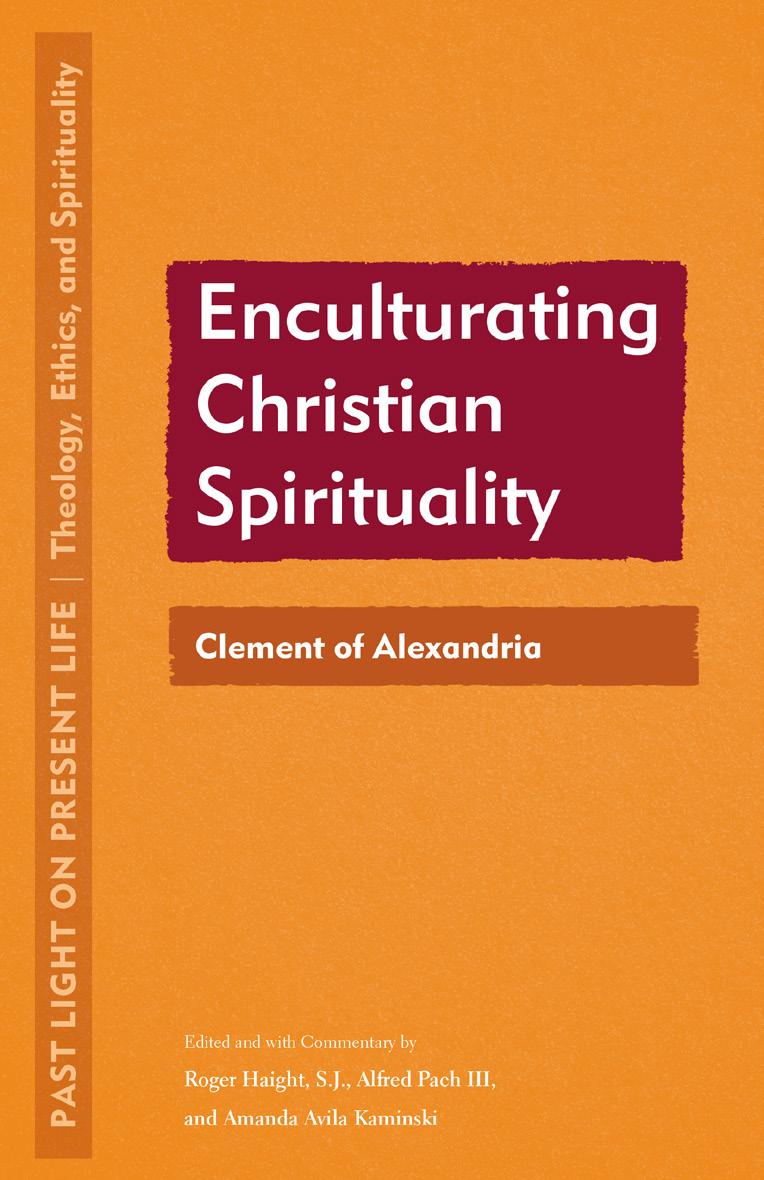
Clement of Alexandria
EDITED AND WITH COMMENTARY
BY ROGER HAIGHT, S.J., ALFRED PACH III, AND AMANDA AVILA KAMINSKI
“Listening to Christian spirituality carefully and liberatingly for the present is neither simple nor necessarily welcome in pluralistic and secular contexts. This series, intended for respectful existential, secular, and pluralistic engagement, promotes a deep conversation about how Christian spiritual heritage matters today. Readers are invited into the art of interpretation with—and beyond—these influential texts and authors, into difficult and urgent questions about how we live well together in a world where no one single vision prevails, but where we help each other clarify what matters most, making a world with room for all spiritual paths promising justice. For the everyday quest to live well together in a world we must equally share, Christian tradition offers spiritual wisdom—and this series offers able guides in recovering that wisdom and suggesting how it can be practiced today.”—Tom Beaudoin on the Past Light on Present Life: Theology, Ethics, and Spirituality series
“Past Light on Present Life is a brilliantly dynamic series. It weaves together theological frameworks, ethical implications, and spiritual mindsets in interpreting texts of numerous great personages in the history of Christian spirituality. Importantly, in doing so it responds to searing questions of our current age. The genius of the series lies in the precise choices of the original texts at the heart of each concise volume, which provide the key for such pertinent interpretation. These volumes provide much needed fresh insight for experts in the field, as they also will prove invaluable for undergraduate teachers, graduate students, religious seekers, and spiritual directors.”—Julia D. E. Prinz on the Past Light on Present Life: Theology, Ethics, and Spirituality series
Clement of Alexandria represents Christianity at the end of the second and early in the third century. He reminds us of the pervasiveness of Greek culture at the time of Jesus that accompanied Roman imperium in the East. The New Testament was written in Greek even though its content was Jewish and appealed back to Jewish history. As Christianity spread north and westward it was received by Jews and Gentiles who were familiar with Greek culture, which strongly affected Latin culture and Roman law and order. As one would expect, corporate Christian faith slowly took on the cultural forms of the places where it was accepted and internalized. Theologians can argue whether or in what respects Hellenization saved or distorted evangelical Christianity, but the early appropriation of Christian beliefs into a form of Greek wisdom that made sense in a critical and speculative culture ultimately provided the medium for central and still authoritative doctrines. Greek Christian wisdom in turn assigned values and influenced practices of Christian spirituality that spanned both the Eastern and the Western churches. Clement of Alexandria was one of the earliest and most thorough interpreters of Christian faith in the terms of Greek reflective thought. We still live by suppositions that were formulated in a way that made Christian faith in God something that Greeks and Romans and Mediterranean culture could understand, spiritually appropriate, and live out. We have to consider whether and in what measure these ancient spiritual ideas still communicate to us, for they have left their mark on Christian language and life in our own day.
ROGER HAIGHT is emeritus Visiting Professor at Union Theological Seminary. The recipient of the Alumnus of the Year award from the Divinity School of the University of Chicago in 2006, he is a Past President of the Catholic Theological Society of America and a recipient of the John Courtney Murray award for achievement in theology.
ALFRED PACH III is Associate Professor of Medical Sciences and Global Health at the Hackensack Meridian School of Medicine. He has a PhD from the University of Wisconsin in Madison and an MDiv in Psychology and Religion from Union Theological Seminary.
AMANDA AVILA KAMINSKI is Assistant Professor of Theology at Texas Lutheran University, where she also serves as Director of the program in Social Innovation and Social Entrepreneurship. She has written extensively in the area of Christian spirituality.
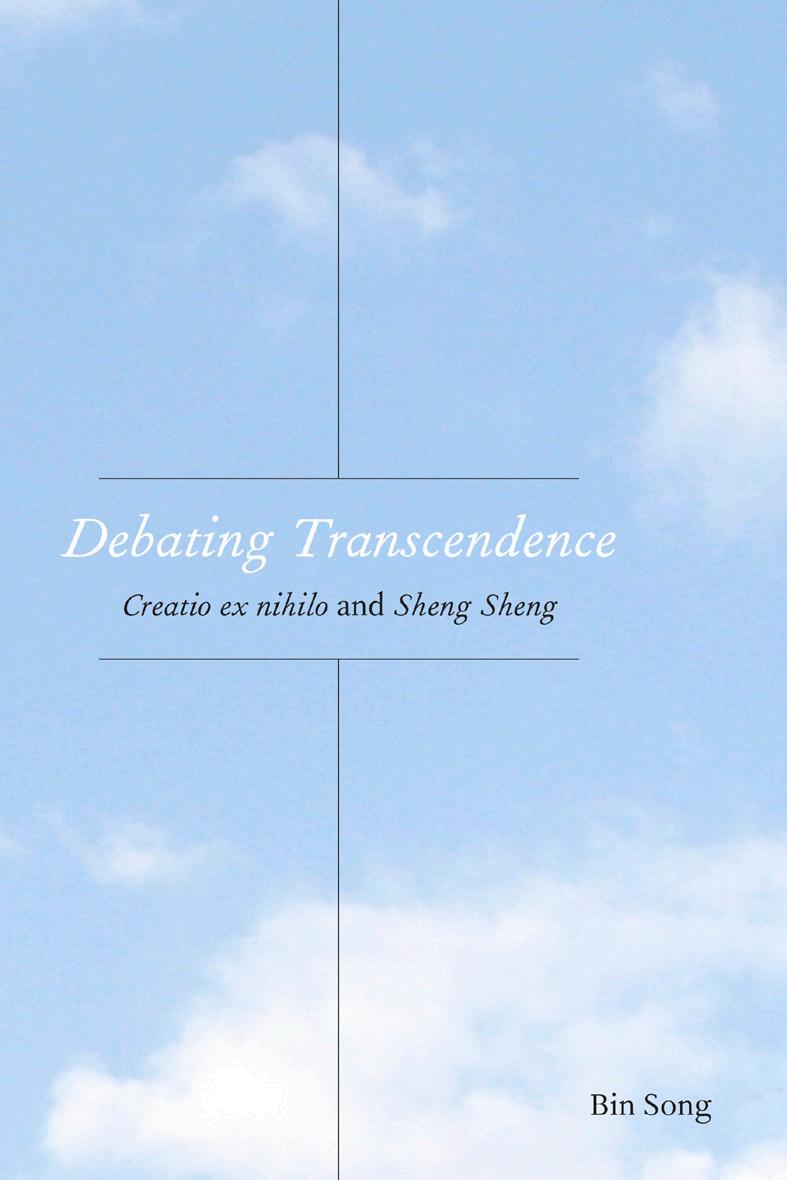
Creatio ex nihilo and Sheng Sheng
336 pages
9781531512095, Paperback, $40.00 (SDT), £32.00
9781531512088, Hardback, $140.00 (SDT), £116.00
Simultaneous electronic edition available
Comparative Theology: Thinking Across Traditions
NOVEMBER
Theology | Religion
“The theme of creation has been a point of contention between Ruist (Confucian) and Christian thought since Matteo Ricci entered the stage. Writing from the Ruist perspective, Bin Song offers a fresh and refreshing look at this long-standing problem, showing the depth and complexity of both traditions on the subject. This book is a must read for anyone interested in Confucian-Christian dialogue or comparative theological method more broadly.”—Joshua Brown, author of Aquinas and the Early Chinese Masters: Chinese Philosophy and Catholic Theology
A bold and rigorous reexamination of transcendence—uniting religion, theology, philosophy, and science—while bridging Confucian and Christian thought to explore the origins of the world and human destiny
Debating Transcendence is a groundbreaking contribution to the ongoing dialogue between Confucian and Christian thought by addressing the transcendence debate—a key controversy that has shaped centuries of cross-cultural intellectual exchange. Song examines whether the Confucian concept of Tian (Heaven) or Taiji (Ultimate Limit) possesses a transcendent dimension comparable to Christian understandings of the Creator God. This study revisits the historical and philosophical roots of the debate, tracing its evolution from early interactions between Confucianism and Christianity during the sixteenth century to present-day discussions.
At the heart of this book is Song’s aim to construct a Confucian definition of theology and a Confucian approach to comparative theology. Grounded in a scientifically rigorous methodology that transcends the conceptual boundaries of philosophy, religion, and theology, this new approach balances rootedness and impartiality, minimizing biases and revealing shared ground. Covering essential thinkers from the West and the East—such as Plato, Augustine, Descartes, and Paul Tillich alongside Confucius, Laozi, Wang Bi, and Zhu Xi—Song explores the historical development of key concepts such as creatio ex nihilo (creation out of nothing) and sheng (birth birth), challenging misconceptions and highlighting underexplored commonalities and differences. Drawing from his diverse scholarly background and extensive engagement with both traditions, Song distinguishes Confucian from Daoist metaphysics and demonstrates that Confucian metaphysics, centered around the concept of generatio ex nihilo, offers a compelling framework for understanding transcendence that not only resembles but, in certain aspects, surpasses major streams of its Christian counterpart.
Readers seeking to understand the profound spiritual foundations underpinning interactions between China and the West will find Song’s work essential. Combining rigor, scope, and depth, Debating Transcendence paves the way for refreshed interactions between Confucian and Christian thought, offering insights vital to contemporary scholarship and interreligious exchange.
BIN SONG is Associate Professor of Philosophy and Religion at Washington College, specializing in Confucianism, early modern philosophy, and comparative theology, with a focus on metaphysics, ethics, spirituality, and the intersections of Confucian and Christian thought. He is the author of Descartes’ Mechanical Philosophy, a study on the metaphysical foundations of modern science, and has published translations of early modern European philosophy into Chinese and ancient Confucian meditation texts into English.
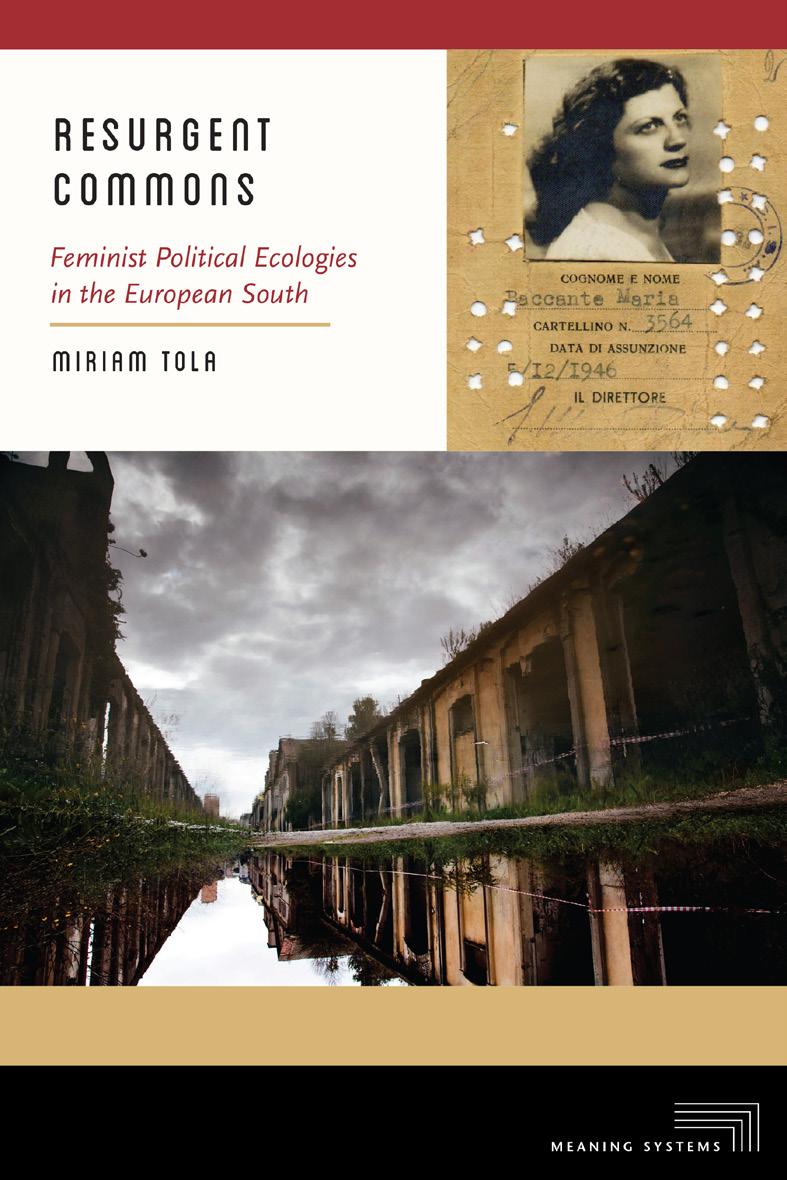
MIRIAM TOLA
224 pages
9781531512538, Paperback, $32.00 (SDT), £25.99
9781531512521, Hardback, $110.00 (SDT), £91.00
Simultaneous electronic edition available
Meaning Systems
JANUARY
Gender & Sexuality | Postcolonial Studies | Science Studies
“At a time when capitalist development is displacing communities across the world, Resurgent Commons provides a vision of the many powerful ways that societies based on self-government and sharing the earth’s wealth are being reimagined in feminist theory and practice. It also introduces us to the different ways ‘commoning’ is being reconceptualized in contemporary social movements.”—Silvia Federici, author of Patriarchy of The Wage: Notes on Marx, Gender, and Feminism
“Expertly weaving together complex philosophical arguments and the lessons of activist practices, Tola develops an original and provocative conception of the commons.”—Michael Hardt, author of The Subversive Seventies
Shows how a reconsideration of a supposedly obsolete mode of shared ownership can enable new modes of inhabiting the earth
Once dismissed as “tragedy,” the commons have been making a comeback. Amid intensifying social and environmental injustices in neoliberal regimes, scholars and activists have turned to the commons—historically, the shared ownership of land—as a way to express more just ways of living within and against the grasp of capitalism. Resurgent Commons reframes the commons by foregrounding relations of care and socio-ecological reproduction, while questioning anthropocentric formulations that would render the commons a set of available resources and the product of human cooperation. Interdisciplinary in nature, Tola’s book troubles universalist accounts of the commons by unearthing its ambivalent role in European colonial histories marked by racial and sexual violence and environmental destruction.
As central case studies, the book considers contemporary political projects that enact feminist, anti-racist and more-than-human practices of urban commoning in Rome, a sprawling, built environment in the European South that is also a city of ruins. From transfeminist commons to struggles for repairing areas where industrial ruins and recalcitrant natures coexist, to encounters with Indigenous perspectives from the Americas, resurgent commons enact forms of life that are at odds with dominant regimes of property and governance. The book shows how a reconsideration of a supposedly obsolete mode of shared ownership can enable new modes of inhabiting the earth.
MIRIAM TOLA is Assistant Professor in Communication and Media Studies at John Cabot University. She is coeditor of The Routledge Handbook of Ecomedia Studies and Ecologie della cura: Prospettive transfemministe.
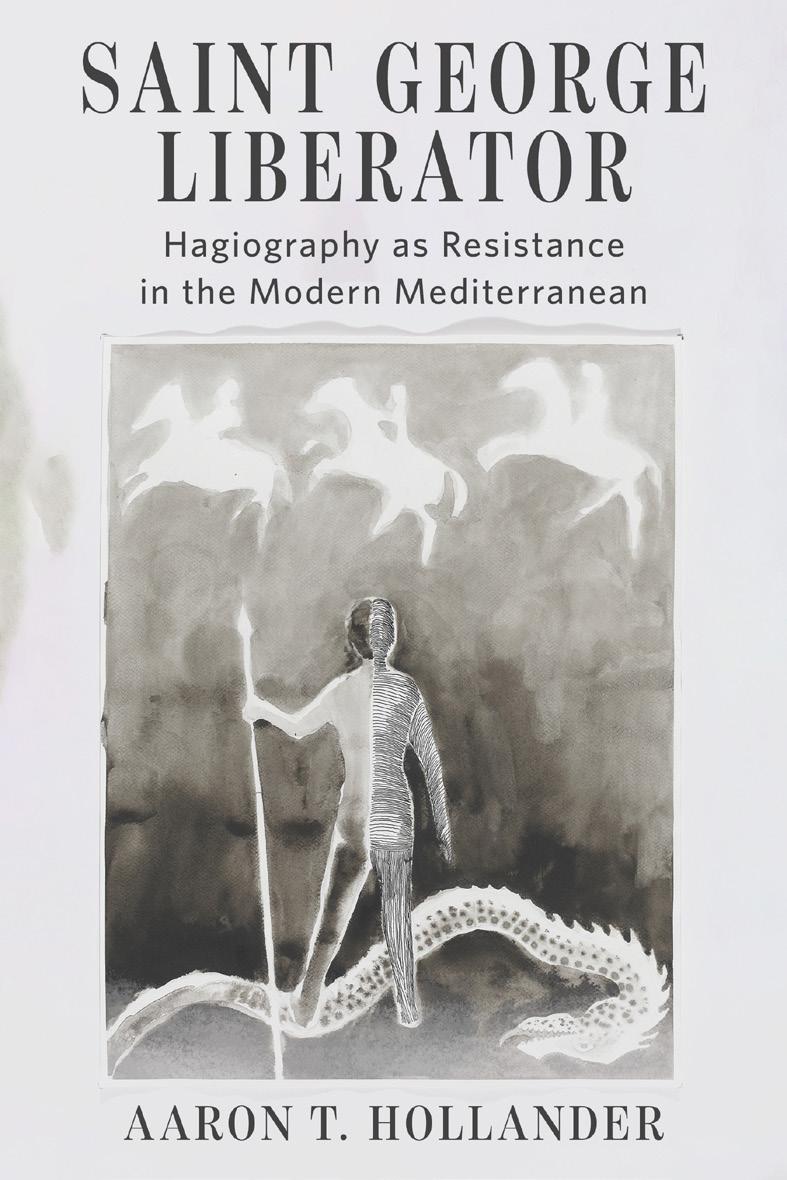
AARON T. HOLLANDER
448 pages, 74 b/w illustrations
9781531512057, Hardback, $65.00 (SDT), £54.00
Simultaneous electronic edition available
Orthodox Christianity and Contemporary Thought
DECEMBER
Religion | Anthropology | Theology
“Saint George Liberator is a richly imaginative study of popular hagiography and spiritual resistance in Cyprus. Hollander deftly works at the intersection of aesthetics, ethics, and politics to reveal how St. George remains vital in a conflict-ridden zone of memory.”—
Angie Heo, University of Chicago
A compelling investigation of how representations of Orthodox Christian saints serve as means of resistance amid cultural and political domination
On the eastern Mediterranean island of Cyprus, repeatedly conquered and colonized, Orthodox Christians have long struggled for political self-determination, agricultural sustainability, and spiritual wholeness. Saint George Liberator illuminates the intimate interplay of Christian theology and Mediterranean politics through the lens of St. George: the martyred soldier of pre-Constantinian Christianity, the liberator of captives and protector of the downtrodden, the dragonslayer of medieval legend. A saint beloved by Christians and Muslims alike, St. George’s representations across many different media are upheld as means of resistance and hope in contexts of domination and suffering. The book offers a profound and original reading of Orthodox hagiography, demonstrating how hagiography is not only an art form of historical significance but also a vibrant, living theology of liberation amid struggles to be whole and free.
Saint George Liberator is richly interdisciplinary in its methodology and scope, deepening its vivid ethnographic narration through conversation with sociological theory and the historical theology that has shaped Orthodox Christian society and consciousness over the course of centuries. Enmeshed in the multicultural complexity of the Ottoman and British Empires, modern Cyprus offers a case study of how colonized and colonizing populations may turn to the same religious repertoires for understanding themselves and one another, telling opposing stories with shared symbols and claiming the means of interpretation as a path of cultural resistance. As a case study in interreligious imagination and the political power of vernacular theology, the book speaks of psychosocial dynamics that far exceed their enactment in Cyprus. It shows that Christian saints, mediated diversely in material and intellectual culture, may not only render magnetic alternatives to the world as it is but also directly aid in forming Christian publics for liberative politics in the present.
AARON T. HOLLANDER is Executive Director of Graymoor Ecumenical & Interreligious Institute, Editor of Ecumenical Trends, and Adjunct Faculty in Theology at Fordham University.

Theology, Politics, Ethics
CANDACE LUKASIK AND SARAH RICCARDI-SWARTZ, EDITORS
FOREWORD BY SONJA
THOMAS AFTERWORD
BY
ANGIE HEO
336
“Anthropologies of Orthodox Christianity stands out for its concern with the integration of theological ideas with the practice of lived religion, which makes it a major intervention in the fast-growing conversation about theology within anthropology (and about anthropology within theology). The contributions are uniformly excellent, and the collection as a whole is a benchmark contribution to the study of Orthodox life.”—Joel Robbins, author of Theology and the Anthropology of Christian Life
“Offering a rich and layered analysis of diverse Orthodox Christian communities—their histories, theologies, and politics—this ambitious volume shows how Orthodox life worlds are created, contested, and transformed, particularly through encounters with various ‘others.’ It underscores the importance of engaging deeply with theology, ecclesiology, and liturgy for producing nuanced, context-sensitive scholarship and furthers the critical conversations that shape the study of global Christianity and religion more broadly.”—
Vlad Naumescu, Professor, Central European University
Anthropologically explores the entanglement of theology and politics among contemporary Orthodox Christians
Much of the anthropological literature on Christianity tends to concentrate on Protestants and Catholics in the Global South. The contemporary scholarly interest in such communities descends from histories of missionization and colonization of these regions, as well as a sense of their theological kinship with the secularized visions of Western political and social life. Orthodox Christianity, however, has largely been rendered marginal in mainstream anthropological engagement because of its theological and social alterity from such Western anthropological traditions of knowledge production. Because of this, Orthodox Christian lifeworlds in and beyond the academy are created, contested, and transformed in relation to various “others,” whether they be religious, political, secular, or historical, with an eye toward a discursive opposition between modernity and Orthodoxy. Each of the essays in Anthropologies of Orthodox Christianity texture a new trajectory in the study of this religious tradition that take seriously the theopolitical aspects of Orthodox life through anthropological inquiry. The volume engages and moves beyond the tension between populist and institutional framings of religion and critically addresses the ontological gap in both anthropology and theology as social, cultural, and geopolitical interest in Orthodox Christianity continues to expand and grow.
CANDACE LUKASIK is Assistant Professor of Religion and Faculty Affiliate in Anthropology and Middle Eastern Cultures at Mississippi State University. Her research focuses on the transnational politics of migration, violence, and indigeneity in the Middle East, specifically Egypt and Iraq, and its US diasporas. She is the author of Martyrs and Migrants: Coptic Christians and the Persecution Politics of US Empire.
SARAH RICCARDI-SWARTZ is Assistant Professor of Religion and Anthropology at Northeastern University, where she is also an affiliate faculty member in the Women’s, Gender, and Sexuality Studies Program. Her research focuses on politics, race, media, gender and sexuality, and Orthodox Christianity. She is the author of Between Heaven and Russia: Religious Conversion and Political Authority in Appalachia (Fordham).
CONTRIBUTORS: Sarah Bakker Kellogg, John Dulin, Clayton Goodgame, Angie Heo, Jacob Lassin, Amber Lee Silva, Candace Lukasik, Aaron Michka, Sarah Riccardi-Swartz, Robert C. Saler, Christopher Sheklian, Sonja Thomas
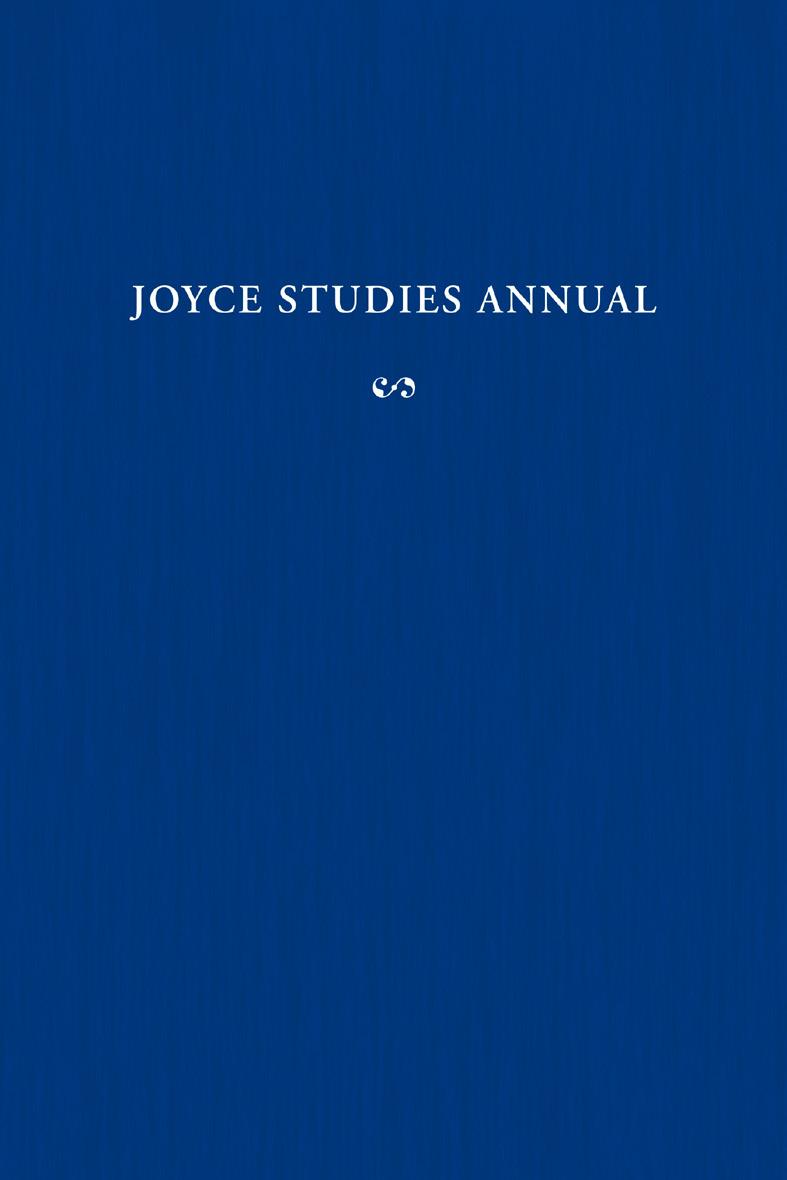
SHINJINI CHATTOPADHYAY, GUEST EDITOR
CHRISTOPHER GOGWILT, MANAGING EDITOR
KERI WALSH, ADVISORY EDITOR
400 pages, 6 x 9
An indispensable resource for scholars and students of James Joyce, Joyce Studies Annual gathers essays by foremost scholars and emerging voices in the field
SHINJINI CHATTOPADHYAY is an assistant professor of modernism at the Department of English and Comparative Literature in the University of North Carolina at Chapel Hill. She works on British and Irish modernism and her monograph-in-progress, “Plurabilities of the City,” investigates the construction of metropolitan cosmopolitanism in modernist novels. Her work on Joyce has appeared in James Joyce Quarterly, European Joyce Studies, Finnegans Wake Human and Nonhuman Histories, “Ulysses” Forty Years, and elsewhere. She serves on the board of trustees of the International James Joyce Foundation (IJJF).
CHRISTOPHER GOGWILT is Professor of English and Comparative Literature at Fordham University. He is the author of The Passage of Literature: Genealogies of Modernism in Conrad, Rhys, and Pramoedya; The Fiction of Geopolitics: Afterimages of Culture from Wilkie Collins to Alfred Hitchcock; and The Invention of the West: Joseph Conrad and the Double-Mapping of Europe and Empire.
KERI WALSH is the Director of the Institute of Irish Studies at Fordham University and founder of Fordham’s annual Irish Women Writers Symposium. She is also the editor of James Joyce’s Dubliners, The Letters of Sylvia Beach, and Joyce’s only extant play, Exiles.
Brooklyn Is
Southeast of the Island: Travel Notes
James Agee, Preface by Jonathan Lethem
64 pages, 5 x 7
9780823224920, Hardback, $25.95 (HC), £21.99
Whose Middle Ages?
Teachable Moments for an Ill-Used Past
Andrew Albin, Mary C. Erler, Thomas O’Donnell, Nicholas L. Paul, and Nina Rowe, Editors, Introduction by David Perry, Afterword by Geraldine Heng
240 pages, 5 x 8 35 b/w illustrations
9780823285563, Paperback, $22.00 (AC), £16.99 Fordham Series in Medieval Studies
The Lamentations
A Requiem for Queer Suicide
Patrick Anderson
272 pages, 5 x 8
9781531508289, Paperback, $24.95 (AC), £19.99
Goodbyes
An Introduction to Chinese Poetry
Timothy Billings
224 pages, 5 x 8, 1 b/w illustration
9781531508357, Hardback, $24.95 (HC), £20.99
Too Black to Be French
Isabelle Boni-Claverie, Translated by Joshua David Jordan, Foreword by Kaiama L. Glover
272 pages
9781531508081, Hardback, $34.95 (HC), £28.99
Join the Conspiracy
How a Brooklyn Eccentric Got Lost on the Right, Infiltrated the Left, and Brought Down the Biggest Bombing Network in New York
Jonathan Butler
384 pages, 68 b/w illustrations
9781531508159, Hardback, $34.95 (HC), £28.99
Empire State Editions
Twentieth Anniversary Edition, with a new preface by the author
Judith Butler
176 pages
9781531509972, Paperback, $24.95 (TP), £19.99
Selections from the Writings of Thomas Aquinas
Mary T. Clark
492 pages
9780823220298, Paperback, $44.00 (SDT), £35.00
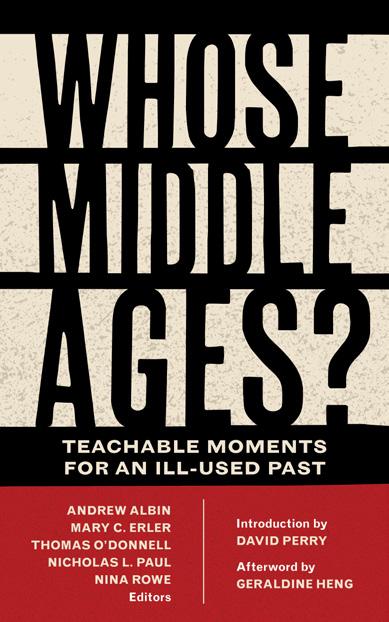
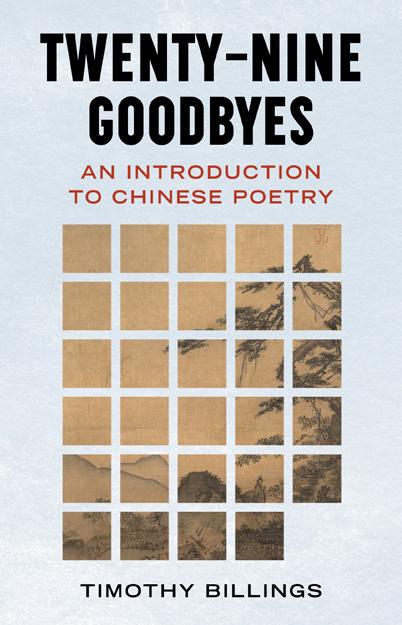

Deconstruction in a Nutshell
A Conversation with Jacques Derrida
Edited with a Commentary by John D. Caputo. With a New Introduction
215 pages
9780823217557, Paperback, $35.00 (SDT), £27.99 Perspectives in Continental Philosophy
The Animal That Therefore I Am Jacques Derrida, Edited by Marie-Louise Mallet, Translated by David Wills
192 pages
9780823227914, Paperback, $31.00 (SDT), £24.99 Perspectives in Continental Philosophy
of Gentleness
Meditations on the Risk of Living
Anne Dufourmantelle, Translated by Katherine Payne and Vincent Sallé, Foreword by Catherine Malabou
152 pages, 5 x 7 1/2
9780823279609, Paperback, $22.00 (AC), £17.99
How to Reclaim Human-Scale Urban Life
Lynn Ellsworth
384 pages, 72 b/w illustrations
9781531508180, Hardback, $34.95 (HC), £28.99
Empire State Editions


Quantum Mechanics and the Philosophy of Alfred North Whitehead
Michael Epperson
278 pages
9780823250127, Paperback, $33.00 (SDT), £26.99
American Philosophy
From the Bronx to the Bosphorus
Klezmer and Other Displaced Musics of New York
Walter Zev Feldman
240 pages, 18 b/w illustrations
9781531509767, Hardback, $34.95 (HC), £28.99 Empire State Editions
Grace of the Ghosts
A Theology of Institutional Reparation
Jeannine Hill Fletcher
336 pages
9781531509873, Paperback, $29.95 (AC), £23.99
Movement
New York’s Long War to Take Back Its Streets from the Car
Nicole Gelinas
576 pages, 39 b/w illustrations
9781531508210, Hardback, $44.95 (HC), £38.00 Empire State Editions
How Mayor Ray Flynn and Community Organizers Fought Racism and Downtown Power Brokers
Don Gillis, Foreword by Mayor Bill de Blasio
432 pages, 39 b/w illustrations and 15 charts
9781531509835, Hardback, $34.95 (HC), £28.99 Polis: Fordham Series in Urban Studies
Elena Gorfinkel and John David Rhodes
176 pages, 5 x 7, 9 b/w illustrations
9781531509613, Paperback, $19.95 (TP), £15.99
Cutaways
Greek
An Intensive Course, 2nd Revised Edition
Hardy Hansen, and Gerald M. Quinn
868 pages, 7 x 10
9780823216635, Paperback, $60.00 (SDT), £48.00
James Baldwin, Disidentification, and the Queer Possibilities of Black Religion
Christopher W. Hunt
240 pages
9781531508814, Paperback, $28.00 (SDT), £22.99
The Rise, Fall, and Resurrection of an American City
Jill Jonnes
481 pages, 5 1/2 x 8 1/2
9780823221998, Paperback, $44.00 (SDT), £35.00
Rockin’ the Bronx
Larry Kirwan
376 pages, 5 1/2 x 8 1/2
9781531510008, Paperback, $19.95 (TP), £15.99
New York ReLit
Dancing with Mary Glass
Carol Mavor
192 pages, 5 1/2 x 8 1/2, 25 b/w illustrations
9781531509545, Paperback, $19.95 (TP), £15.99
Historical Trends and Doctrinal Themes
John Meyendorff
243 pages
9780823209675, Paperback, $38.00 (SDT), £29.99
American Fascism and the Rule of Law
Bill V. Mullen
240 pages, 6 b/w illustrations
9781531508456, Paperback, $29.95 (AC), £23.99

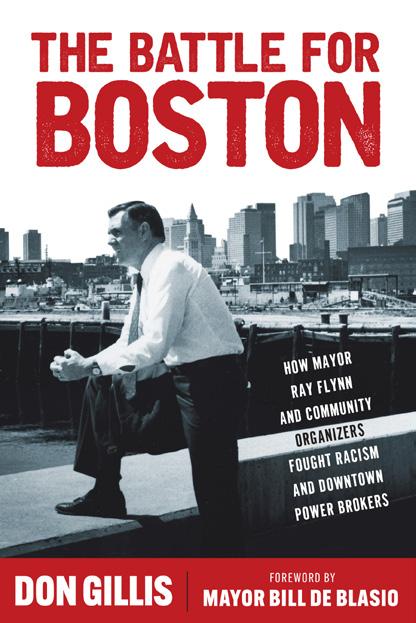


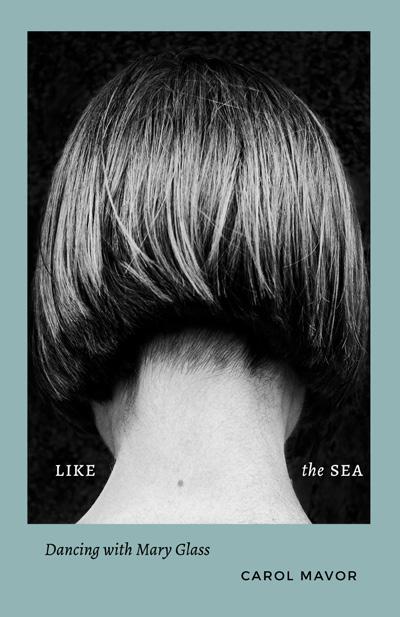
Jules O’Dwyer
144 pages, 5 x 7, 8 b/w illustrations
9781531509651, Paperback, $19.95 (TP), £15.99 Cutaways
The Autobiography of St. Ignatius Loyola
John C. Olin
113 pages, 5 1/2 x 8 1/2
9780823214808, Paperback, $31.00 (SDT), £24.99
Telling the Bees
An Interspecies Monologue
Dominic Pettman
192 pages, 5 x 8 9781531508494, Paperback, $24.95 (AC), £19.99
Here Down on Dark Earth
Loss and Remembrance in New York City Photographs and Introduction by Larry Racioppo, Essays by Clifford Thompson and Jan Ramirez
208 pages, 12 x 9, 330 color illustrations
9781531509491, Hardback, $49.95 (HC), £42.00 Empire State Editions
A Trip Through New York City’s Unbuilt Subway System
Joseph B. Raskin
336 pages, 7 x 10, 100 black and white illustrations
9780823267408, Paperback, $21.95 (TP), £17.99
Empire State Editions
My Antiracist Education
David Roediger
256 pages, 18 b/w illustrations
9781531509576, Hardback, $27.95 (HC), £23.99
Concentration Camp Brothel
Forced Sexual Labor under Nazi Rule
Robert Sommer, Translated by Dominic Bonfiglio, Foreword by Annette F. Timm
384 pages, 12 tables; 31 images
9781531509910, Paperback, $34.95 (AC), £27.99
World War II: The Global, Human, and Ethical Dimension
Roberto Tejada
144 pages, 6 x 8, 16 b/w illustrations
9781531509705, Paperback, $17.95 (TP), £14.99


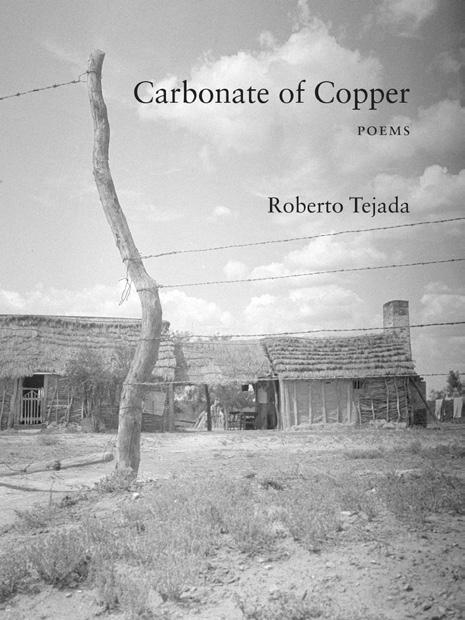
How to Read Like an Anti-Fascist
Storytelling and Narrative Literacy for Young People
Annette Wannamaker
224 pages, 4 b/w illustrations
9781531509804, Paperback, $24.95 (TP), £19.99
The Life and Photographs of Miss Alice Austen
Bonnie Yochelson, Foreword by Victoria Munro and Jessica B. Phillips
288 pages, 8 x 10, 142 b/w illustrations
9781531509507, Hardback, $39.95 (HC), £34.00
Empire State Editions


United States & Canada
Fordham University Press is distributed to the trade by Ingram Academic and Professional, an Ingram brand.
Submit orders directly to IPS via your POS system using IPS
SAN: 6318630
• Call: (800) 937-8200*
• Fax: (800) 838-1149
• Email: ips@ingramcontent.com
*Please note (866-400-5351) is no longer in service.
For customers needing assistance with orders placed on www.fordhampress.com, please visit https://fordhampress.zendesk.com/hc/en-gb
Field Sales
Leslie Jobson
Senior Manager, Sales and Support Tel: 510-809-3732 leslie.jobson@ingramcontent.com
Specialty Retail & Gift Sales Gift Sales Manager ipsgiftsupport@ingramcontent.com
Sandy Hernandez
Senior Manager, Specialty Retail Tel: 818-914-9433 sandy.hernandez@ingramcontent.com
Steve Quinn
Special Sales Manager, Specialty Retail Tel: 401-209-9869 steve.quinn@ingramcontent.com
Tom Lupoff
Sales Rep, Special Markets, Wholesale, and Catalog Tel: 510-809-3754 tom.lupoff@ingramcontent.com
Erin Procario Sales Rep, Special Markets erin.procario@ingramcontent.com
CANADA
Leo Moelker
International Sales Manager
Ingram Publisher Services International
1400 Broadway, Suite 3200
New York, NY 10018
Tel: 212-714-9000 ext. 8196
Leo.Moelker@ingramcontent.com
CANADA ORDERING INFORMATION
Canadian Manda Group
664 Annette Street
Toronto M6S 2C8
Canada
Tel: 416-516-0911
info@mandagroup.com
LATIN AMERICA AND THE CARIBBEAN
Alexia Cervello
Sales Specialist
1400 Broadway, Suite 3200
New York, NY 10018
Alexia.Cervello@ingramcontent.com
INTERNATIONAL SALES
UK, Europe, Middle East, Africa, Pacific, including Australia and New Zealand
Combined Academic Publishers
Mare Nostrum Group
39 East Parade
Harrogate
North Yorkshire
HG1 5LQ
UK
Tel: + 44 (0)1423526350
Customer Service enquiries@combinedacademic.co.uk
Distrobution, Orders & Customer Services
Wiley Customer Service Books
European Distribution Centre
Oldlands Way
New Era Estate
Bognor Regis
West Sussex PO22 9NQ, UK
Tel: +44 (0) 1243 843291
trade@wiley.com
China, Hong Kong and Taiwan
China Publishers Marketing
Benjamin Pan
Email: benjamin.pan@cpmarketing.com.cn
Tel/Fax: 0086-21-54259557
Mobile: 0086-13061629622
South-East Asia - Brunei, Cambodia, East Timor, Indonesia, Japan, Laos, Malaysia, Philippines, Singapore, South Korea, Thailand, Vietnam Publishers International Marketing
Chris Ashdown
Tel/Fax: +44(0)1202 896210 chris@pim-uk.com
South Asia - Bangladesh, Bhutan, India, Maldives, Nepal, Sri Lanka
Manohar Publishers and Distributors
4753/23, Ansari Road, Darya Ganj, New Delhi 110002
Tel: 011- 43583973 manoharbooks@gmail.com